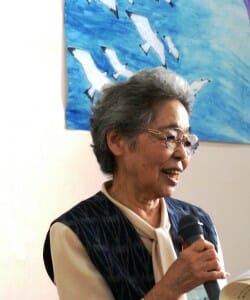
Nov 6, 2015 | Focolare Worldwide
 “On August 22, 1944, I lost my only sister in the Tsushima Maru naval disaster.” The passenger ship was sunk by an American submarine. More than 1,400 civilians lost their lives, including 700 children. “Up until the day of her death at the age of 96, my mother continued to say: “The war ate her on me. . .” Mrs Toshiko Tsuhako spoke from the bottom of her heart as she recounted her story to us. Her city, on Okinawa Island, had been the theatre of the only land battle in Japan through the months of April, May and June 1945, leaving 150,000 dead. “I was just an innocent child when I found myself thrown into the tragic experience of war, in contact with painful wounds that it inflicts on the bodies and the spirits of people. The war ended when I was 12 years old. My mother had a fragile constitution and, since I was the only daughter now, I devoted all my strength to trying to support and alleviate her afflictions. At the age of 16 I met the Christian faith and received the grace of Baptism.” As an adult she came into contact with the Focolare spirituality: “I was quite surprised when I heard that the foundress, Chiara Lubich, had come to understand, in the midst of the Second World War, that God loves us immensely and that we are all brothers and sisters who aspire to a united world, because this coincided exactly with the great dream that I carried inside me from when I was a young teenager.” “Although I was aware that everything that happens is in God’s hands, countless times I would wonder: ‘Why are there still such cruel and painful wars?’, while I continued on dreaming of a ‘global Family’ where the people live mutual gratitude and communion.” “I think that God is in need of our collaboration in building a truly peaceful world. It is true that we should cultivate hearts that love their own lands, but more than anything we should cultivate sensitive souls that devote themselves to the good of others, souls that know how to love.” “On this anniversary of the termination of the war,” Toshiko testifies, “I renew my trust in God and my commitment to continue along the path of peacebuilding.”
“On August 22, 1944, I lost my only sister in the Tsushima Maru naval disaster.” The passenger ship was sunk by an American submarine. More than 1,400 civilians lost their lives, including 700 children. “Up until the day of her death at the age of 96, my mother continued to say: “The war ate her on me. . .” Mrs Toshiko Tsuhako spoke from the bottom of her heart as she recounted her story to us. Her city, on Okinawa Island, had been the theatre of the only land battle in Japan through the months of April, May and June 1945, leaving 150,000 dead. “I was just an innocent child when I found myself thrown into the tragic experience of war, in contact with painful wounds that it inflicts on the bodies and the spirits of people. The war ended when I was 12 years old. My mother had a fragile constitution and, since I was the only daughter now, I devoted all my strength to trying to support and alleviate her afflictions. At the age of 16 I met the Christian faith and received the grace of Baptism.” As an adult she came into contact with the Focolare spirituality: “I was quite surprised when I heard that the foundress, Chiara Lubich, had come to understand, in the midst of the Second World War, that God loves us immensely and that we are all brothers and sisters who aspire to a united world, because this coincided exactly with the great dream that I carried inside me from when I was a young teenager.” “Although I was aware that everything that happens is in God’s hands, countless times I would wonder: ‘Why are there still such cruel and painful wars?’, while I continued on dreaming of a ‘global Family’ where the people live mutual gratitude and communion.” “I think that God is in need of our collaboration in building a truly peaceful world. It is true that we should cultivate hearts that love their own lands, but more than anything we should cultivate sensitive souls that devote themselves to the good of others, souls that know how to love.” “On this anniversary of the termination of the war,” Toshiko testifies, “I renew my trust in God and my commitment to continue along the path of peacebuilding.”
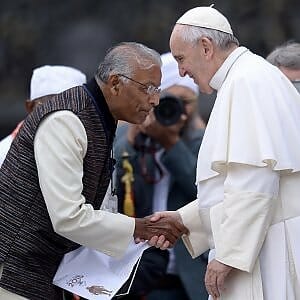
Nov 5, 2015 | Non categorizzato
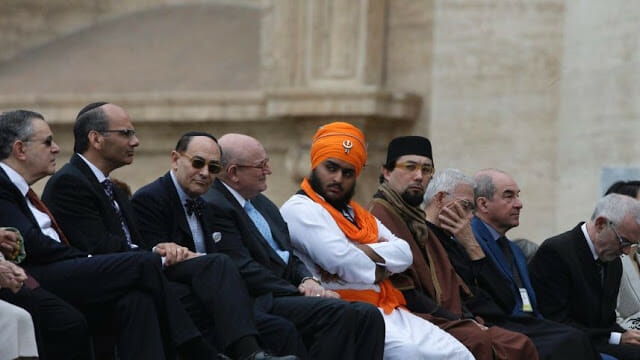 On 28 October 1965 at the conclusion of the historical assembly of bishops of the Catholic Church, the Council Fathers promulgated Nostra Aetate, the shortest document ever to be issued by the council’s working sessions. Half a century has passed since then, and the impact of those few pages revealed to be prophetic considering that the Catholic Church had passed centuries in the more or less firm conviction that there was ”no salvation outside the Church” – the famous Latin adage extra ecclesiam nulla salus. In February 2013, a few days before announcing his ”retirement” and upon reflecting on the Council at the end of the celebration of its 50th anniversary, Benedict XVI defined this document as a « trilogy that revealed its importance only in the course of decades,» along with Gaudium et Spes and religious freedom. In effect Nostra Aetate opened the Christian world’s horizon towards the others in their ”otherness,” but the management of which, according to the council’s procedures was not at all easy. At the personal suggestion of the French-Jewish historian, Jules Isaac to John XXIII, the Pope entrusted the initial scheme to Cardinal Bea. The idea was to draft a document that would contribute to prevent the repetition of tragedies like the Shoà, but after long and complex debates, the Council laid down a few pages addressing all the religions of the world. In effect, through a laborious and difficult process, the document opened to all the main religious faiths, undoubtedly and particularly stressing the confrontation with Judaism and Islam. Nostra Aetate underlines how the Jews should be presented in a positive manner: “They should not be presented as God’s rejects or as accursed, almost as if this came from the Holy Scriptures.” Above all, it excludes Israel’s collective responsibility for the death of Jesus. Therefore, this radically changed the views the Christian and Catholic world had of Israel for two millenniums. Likewise, a great respect emerged also towards Islam. “The Church regards Muslims with esteem” – declared the document – and “if in the course of the centuries, many disagreements and hostilities arose between Christians and Muslims, the Holy Council urges all to forget the past and sincerely practice mutual understanding, and together defend and promote social justice, moral values, peace and liberty for all.” As earlier said, also the recognition of the traditions of Hinduism and Buddhism is clearly highlighted, without forgetting the traditional religions. In fact, the document also affirms that “the Catholic Church does not reject what is true and holy in these religions.” What history often has not recognised as religions are now valued by Catholic tradition which acknowledges the presence of truth and sanctity also in their traditions.
On 28 October 1965 at the conclusion of the historical assembly of bishops of the Catholic Church, the Council Fathers promulgated Nostra Aetate, the shortest document ever to be issued by the council’s working sessions. Half a century has passed since then, and the impact of those few pages revealed to be prophetic considering that the Catholic Church had passed centuries in the more or less firm conviction that there was ”no salvation outside the Church” – the famous Latin adage extra ecclesiam nulla salus. In February 2013, a few days before announcing his ”retirement” and upon reflecting on the Council at the end of the celebration of its 50th anniversary, Benedict XVI defined this document as a « trilogy that revealed its importance only in the course of decades,» along with Gaudium et Spes and religious freedom. In effect Nostra Aetate opened the Christian world’s horizon towards the others in their ”otherness,” but the management of which, according to the council’s procedures was not at all easy. At the personal suggestion of the French-Jewish historian, Jules Isaac to John XXIII, the Pope entrusted the initial scheme to Cardinal Bea. The idea was to draft a document that would contribute to prevent the repetition of tragedies like the Shoà, but after long and complex debates, the Council laid down a few pages addressing all the religions of the world. In effect, through a laborious and difficult process, the document opened to all the main religious faiths, undoubtedly and particularly stressing the confrontation with Judaism and Islam. Nostra Aetate underlines how the Jews should be presented in a positive manner: “They should not be presented as God’s rejects or as accursed, almost as if this came from the Holy Scriptures.” Above all, it excludes Israel’s collective responsibility for the death of Jesus. Therefore, this radically changed the views the Christian and Catholic world had of Israel for two millenniums. Likewise, a great respect emerged also towards Islam. “The Church regards Muslims with esteem” – declared the document – and “if in the course of the centuries, many disagreements and hostilities arose between Christians and Muslims, the Holy Council urges all to forget the past and sincerely practice mutual understanding, and together defend and promote social justice, moral values, peace and liberty for all.” As earlier said, also the recognition of the traditions of Hinduism and Buddhism is clearly highlighted, without forgetting the traditional religions. In fact, the document also affirms that “the Catholic Church does not reject what is true and holy in these religions.” What history often has not recognised as religions are now valued by Catholic tradition which acknowledges the presence of truth and sanctity also in their traditions. 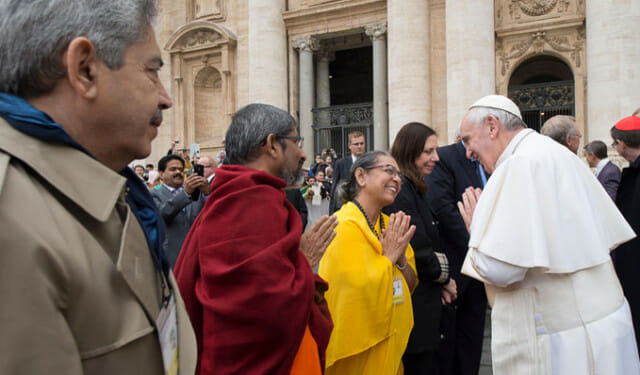 Today, a great variety of events are being celebrated in various parts of the world to reflect on the value of Nostra Aetate and the consequences it has brought about between men and women of different religious traditions. Amongst all is the particularly important event held at the Pontifical Gregorian University and organized by the Pontifical Council for Interreligious Dialogue. For three days, from 26 to 28 October, about 400 people of diverse geographic, cultural and religious areas met and reflected together on what has come about over the last 50 years. There were representatives of all the major religions of the world (Jews, Muslims, Hindus, Jainists, Buddhists, and Sikhs and those of the Tenri-kyo and the traditional African religions). They reflected on highly relevant themes today, violence, commitment to peace, the challenge of religious freedom, education and transmission of values.
Today, a great variety of events are being celebrated in various parts of the world to reflect on the value of Nostra Aetate and the consequences it has brought about between men and women of different religious traditions. Amongst all is the particularly important event held at the Pontifical Gregorian University and organized by the Pontifical Council for Interreligious Dialogue. For three days, from 26 to 28 October, about 400 people of diverse geographic, cultural and religious areas met and reflected together on what has come about over the last 50 years. There were representatives of all the major religions of the world (Jews, Muslims, Hindus, Jainists, Buddhists, and Sikhs and those of the Tenri-kyo and the traditional African religions). They reflected on highly relevant themes today, violence, commitment to peace, the challenge of religious freedom, education and transmission of values.  The convention was opened by Card. Jean-Louis Tauran, President of the Pontifical Council for Interreligious and by Card. Kurt Koch President of the Pontifical Council for Dialogue for the Promotion of Unity among Christians, and ended with a valuable and articulated reflection on ”Educating toward peace” by the Secretary of State, Card. Pietro Parolin. The participants then took part in the Audience in St. Peter’s square where Pope Francis dedicated his catechesis precisely to Nostra Aetate. He proposed a road-map for the future of dialogue, and encouraged all to work together for the poor, justice, the environment, and of course, peace. Rita Mousalem and Roberto Catalano, co-directors of the Centre for Interreligious Dialogue of the Focolare Movement, participated in the convention and conveyed the greetings of Maria Voce and the Movement when they briefly presented the important features of the Focolare’s interreligious dialogue and ensured the commitment of its members in continuing to work for the encounter and friendship between men and women of diverse faiths. Roberto Catalano
The convention was opened by Card. Jean-Louis Tauran, President of the Pontifical Council for Interreligious and by Card. Kurt Koch President of the Pontifical Council for Dialogue for the Promotion of Unity among Christians, and ended with a valuable and articulated reflection on ”Educating toward peace” by the Secretary of State, Card. Pietro Parolin. The participants then took part in the Audience in St. Peter’s square where Pope Francis dedicated his catechesis precisely to Nostra Aetate. He proposed a road-map for the future of dialogue, and encouraged all to work together for the poor, justice, the environment, and of course, peace. Rita Mousalem and Roberto Catalano, co-directors of the Centre for Interreligious Dialogue of the Focolare Movement, participated in the convention and conveyed the greetings of Maria Voce and the Movement when they briefly presented the important features of the Focolare’s interreligious dialogue and ensured the commitment of its members in continuing to work for the encounter and friendship between men and women of diverse faiths. Roberto Catalano
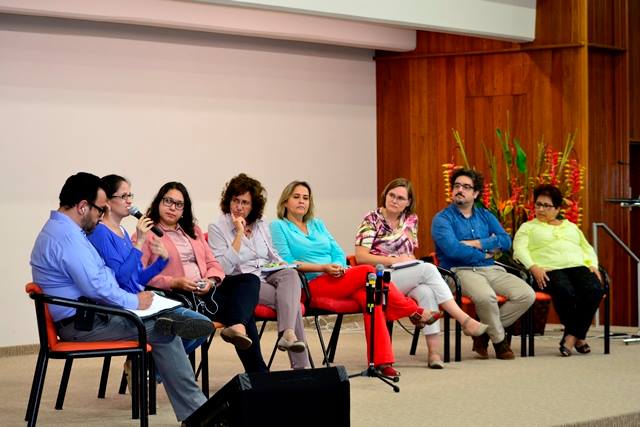
Nov 4, 2015 | Focolare Worldwide
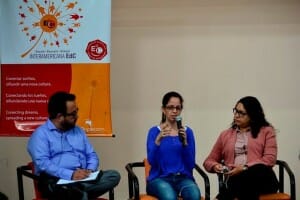 Connect dreams and spread a new culture was the title of an inter-American workshop by the Economy of Communion, which was held on October 26-31 at Mariapolis Ginetta, San Paolo, Brazil. Mariapolis Ginetta is the place where Chiara Lubich’s inspiration for the EoC was born in 1991. Sixty young people from Paraguay, Argentina, Mexico, Guatemala, Cuba, Colombia,, Bolivia and Brazil attended the even and have decided to embrace the EoC project and its innovative principles as they were first presented by the Focolare foundress. The business owners promised to accompany the young people on this difficult path. At the conclusion of the school every student received a certificate of participation from their partner. Thus a new form of communion was begun that has been called “Operation one for one”. Clézia Maria Pinto, head projects for Anpecom (the association that coordinates Economy of Communion projects in Brazil), announced the launching of a financial support programme for small businesses that operate in socially vulnerable situations, offering nutritional products or services in favour of educaiton health and housing, as well as to projects that focus on middle, low-income, and the neediest groups. The programme is inspired by projects that are already underway in other areas of the world, that offer funding and benefits linked to general adherence to the EoC.
Connect dreams and spread a new culture was the title of an inter-American workshop by the Economy of Communion, which was held on October 26-31 at Mariapolis Ginetta, San Paolo, Brazil. Mariapolis Ginetta is the place where Chiara Lubich’s inspiration for the EoC was born in 1991. Sixty young people from Paraguay, Argentina, Mexico, Guatemala, Cuba, Colombia,, Bolivia and Brazil attended the even and have decided to embrace the EoC project and its innovative principles as they were first presented by the Focolare foundress. The business owners promised to accompany the young people on this difficult path. At the conclusion of the school every student received a certificate of participation from their partner. Thus a new form of communion was begun that has been called “Operation one for one”. Clézia Maria Pinto, head projects for Anpecom (the association that coordinates Economy of Communion projects in Brazil), announced the launching of a financial support programme for small businesses that operate in socially vulnerable situations, offering nutritional products or services in favour of educaiton health and housing, as well as to projects that focus on middle, low-income, and the neediest groups. The programme is inspired by projects that are already underway in other areas of the world, that offer funding and benefits linked to general adherence to the EoC.  In the invitation, those who worked in preparing the workshop, wrote to their peers: “Let us not give up in front of social injustice and inequality” and posed a challenging question: “What if this change were to begin from becoming aware of what poverty, economy, work and interpersonal relations are?” These were only some of the topics that were presented during roundtable discussions, small group meetings where the main actors were the young people themselves and their expert business owners who had years of experience under their belts. In his final remarks, Anouk Grevin from the International Commission of the EoC admitted that there was the hope that the present workshop would function as a laboratory that would open new roads for the EoC not only in Latin America, but around the world.
In the invitation, those who worked in preparing the workshop, wrote to their peers: “Let us not give up in front of social injustice and inequality” and posed a challenging question: “What if this change were to begin from becoming aware of what poverty, economy, work and interpersonal relations are?” These were only some of the topics that were presented during roundtable discussions, small group meetings where the main actors were the young people themselves and their expert business owners who had years of experience under their belts. In his final remarks, Anouk Grevin from the International Commission of the EoC admitted that there was the hope that the present workshop would function as a laboratory that would open new roads for the EoC not only in Latin America, but around the world.

Nov 3, 2015 | Senza categoria
On the bus I was on Bus 45 which I take to work every day, when a man clearly in a bad mood climbed on. People who had realized this moved out of his way and avoided him. I, however, remained where I was and helped him with the plastic bags he was carrying. My day seemed to become brighter. Another day, on the same bus, there was the same man again. As soon as he saw me, he came to greet me. And this continued to happen. Even a very small gesture is enough to let another person, any neighbor whom I encounter throughout my day, feel welcomed and loved. E.M. – Hungary  Tattoos On the train, I was sitting next to a girl and a boy covered in tattoos of a satanic nature. My propensity to look for the positive aspects in others made me think that those two must have a reason for displaying such symbols. After some hesitation, I got up my courage and asked them the meaning of their tattoos. Their eyes lit up. They took turns answering me, but each with the same sweetness: “We are grateful that you asked this question. Usually, people judge us and in the best case scenario, pretend they don’t see us. We aren’t what we seem, we only want to shake up this paralyzed and spineless society.” M.I. – France A carriage for Jamal It was Sunday afternoon. Jamal, a Moroccan worker I know, had brought me some apples. Talking with him, I found out that he was expecting a child to be born in December. However, they did not have any of the things necessary for the baby; above all, they would need a baby carriage. After listening attentively to him, an idea came to me: “Why don’t we ask God’s help together, the two of us? God is the same for everyone, you can call him by another name, but he’s still God. He will know how to find us a baby carriage.” Jamal liked the idea. We were in the open courtyard; we lifted our eyes towards heaven and we prayed as follows: “Lord God, we need a baby carriage. Please take care of it.” We were a young Muslim man and a Catholic woman: two different faiths, yet united in the asking. God accepted our prayer: the following Thursday the requested carriage arrived as a gift. V.M. – Italy
Tattoos On the train, I was sitting next to a girl and a boy covered in tattoos of a satanic nature. My propensity to look for the positive aspects in others made me think that those two must have a reason for displaying such symbols. After some hesitation, I got up my courage and asked them the meaning of their tattoos. Their eyes lit up. They took turns answering me, but each with the same sweetness: “We are grateful that you asked this question. Usually, people judge us and in the best case scenario, pretend they don’t see us. We aren’t what we seem, we only want to shake up this paralyzed and spineless society.” M.I. – France A carriage for Jamal It was Sunday afternoon. Jamal, a Moroccan worker I know, had brought me some apples. Talking with him, I found out that he was expecting a child to be born in December. However, they did not have any of the things necessary for the baby; above all, they would need a baby carriage. After listening attentively to him, an idea came to me: “Why don’t we ask God’s help together, the two of us? God is the same for everyone, you can call him by another name, but he’s still God. He will know how to find us a baby carriage.” Jamal liked the idea. We were in the open courtyard; we lifted our eyes towards heaven and we prayed as follows: “Lord God, we need a baby carriage. Please take care of it.” We were a young Muslim man and a Catholic woman: two different faiths, yet united in the asking. God accepted our prayer: the following Thursday the requested carriage arrived as a gift. V.M. – Italy
Nov 2, 2015 | Non categorizzato
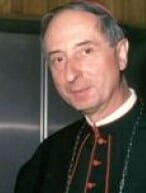
Nov 1, 2015 | Non categorizzato

Klaus Hemmerle
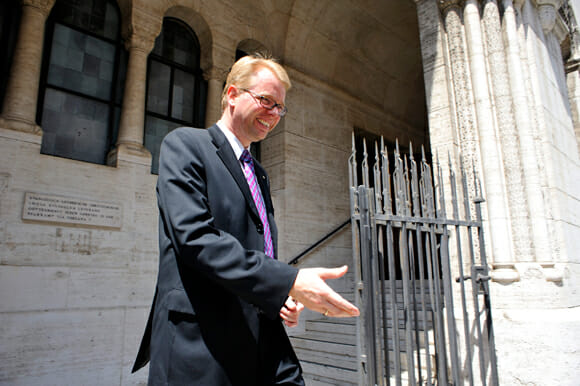
Oct 31, 2015 | Non categorizzato
It was in a spirit of ecumenism that 80 Christians from different denominations gathered on September 12th in the German town of Zwochau.  During her visit to Zwochau in 2013, on behalf of the Movement Maria Voce expressed the desire to know Martin Luther better and also the faithful of the Lutheran Church. More recently, because of an exchange of letters last May between Cardinal Marx, president of the German Catholic Bishops Conference and Bishop Bedford Strohm, Chairman of the Evangelische Kirche in Deutschland (EKD), the idea was put forward of promoting more cooperation between Christian confessions in view of the 500th anniversary of the Reformation that will be celebrated in 2017. There were two points for reflection. The first, given by Lutheran theologian Florian Zobel, focused on Luther and his life, highlighting several little known aspects, and concluded with the words of Pope Benedict XVI: “For Luther theology was not an academic issue, but the interior struggle with himself. […] The question: ‘Where does God stand in relation to me? How do I stand before God?’ […] I think that this is the first summons we should hear from Luther.” The second point presented by Catholic theologian and researcher on Luther, Hubertus Blaumeiser, focused on the spirituality of the reformer monk and, in particular, the “theology of the cross” and the meaning of “Reform” that followed: “Not merely a transformation, a change or improvement in accordance with one’s personal plans,” he said, “but a new beginning, starting from the roots; that is, the return to the Scripture, […] to the Gospel of God’s grace and to the new choice of a life with, for and through the Crucified Christ.” In the afternoon a roundtable was held, moderated by Hermann Schweers and Lutheran pastor, Axel Meissner of Schkeuditz, and Emeritus Bishop Joachim Reinelt of Dresda. There were numerous interventions from the audience that touched upon topics such as the importance of the ecumenical effort in a society of non-believers, and the meaning of the Reform for today’s world. The day concluded with an ecumenical celebration.
During her visit to Zwochau in 2013, on behalf of the Movement Maria Voce expressed the desire to know Martin Luther better and also the faithful of the Lutheran Church. More recently, because of an exchange of letters last May between Cardinal Marx, president of the German Catholic Bishops Conference and Bishop Bedford Strohm, Chairman of the Evangelische Kirche in Deutschland (EKD), the idea was put forward of promoting more cooperation between Christian confessions in view of the 500th anniversary of the Reformation that will be celebrated in 2017. There were two points for reflection. The first, given by Lutheran theologian Florian Zobel, focused on Luther and his life, highlighting several little known aspects, and concluded with the words of Pope Benedict XVI: “For Luther theology was not an academic issue, but the interior struggle with himself. […] The question: ‘Where does God stand in relation to me? How do I stand before God?’ […] I think that this is the first summons we should hear from Luther.” The second point presented by Catholic theologian and researcher on Luther, Hubertus Blaumeiser, focused on the spirituality of the reformer monk and, in particular, the “theology of the cross” and the meaning of “Reform” that followed: “Not merely a transformation, a change or improvement in accordance with one’s personal plans,” he said, “but a new beginning, starting from the roots; that is, the return to the Scripture, […] to the Gospel of God’s grace and to the new choice of a life with, for and through the Crucified Christ.” In the afternoon a roundtable was held, moderated by Hermann Schweers and Lutheran pastor, Axel Meissner of Schkeuditz, and Emeritus Bishop Joachim Reinelt of Dresda. There were numerous interventions from the audience that touched upon topics such as the importance of the ecumenical effort in a society of non-believers, and the meaning of the Reform for today’s world. The day concluded with an ecumenical celebration.

Pastor Jens-Martin Kruse. Photo: Harald Krille
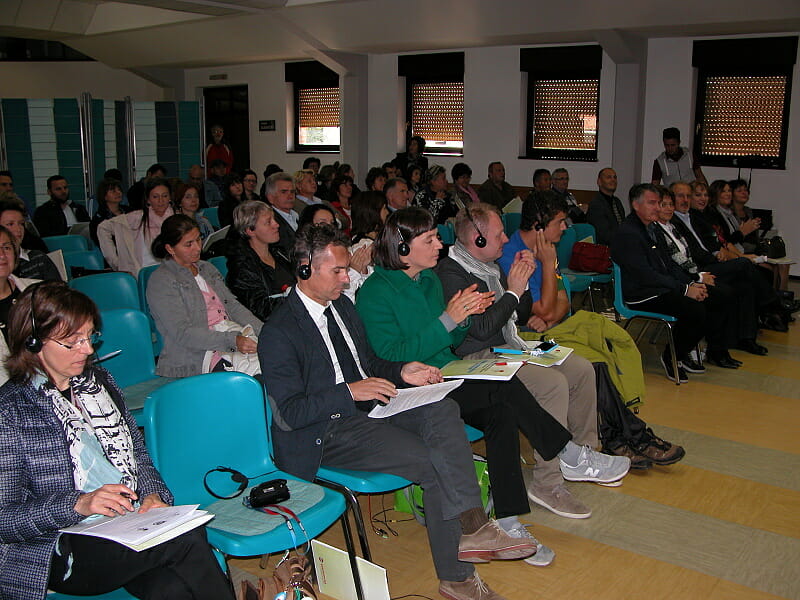
Oct 30, 2015 | Focolare Worldwide, Senza categoria
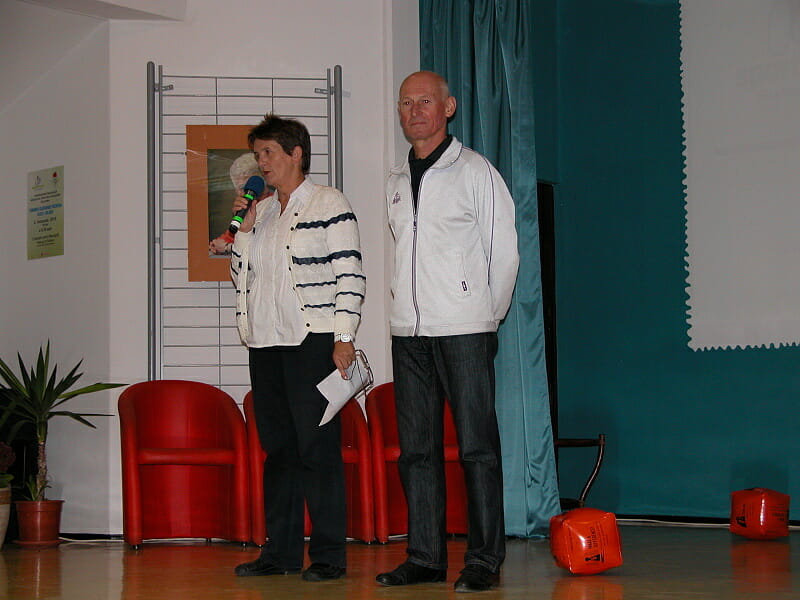 Can sports contribute to building a more united world? Could it become a field of action and a tool for unity among individuals and peoples? These were the queries that sparked up the experience of the founders of Sportmeet, motivated by the sharing of the common passion for sports. “Since we were not sure we had all the answers, we scouted out the people and experiences of the sports world that could help us, and through the years were able to establish, specifically three elements that trace the identity of Sportmeet: the high consideration for sports as an important aspect of society; the capacity and objective to unite the most diverse categories of people interested in sports; and the challenge to merge theory and practice in a framework which tends to separate the sports specialists from those who practice it.” These were some excerpts from the speech of Paolo Cipolli, President of Sportmeet for a United World, which opened the seventh convention organized by the Sportmeet network in Krizevci (Croatia). The intent was to consider sports in dialogue with contemporary society, with the conviction that it can give a specific, stimulating and positive contribution to culture and the construction of active and responsible citizenship.
Can sports contribute to building a more united world? Could it become a field of action and a tool for unity among individuals and peoples? These were the queries that sparked up the experience of the founders of Sportmeet, motivated by the sharing of the common passion for sports. “Since we were not sure we had all the answers, we scouted out the people and experiences of the sports world that could help us, and through the years were able to establish, specifically three elements that trace the identity of Sportmeet: the high consideration for sports as an important aspect of society; the capacity and objective to unite the most diverse categories of people interested in sports; and the challenge to merge theory and practice in a framework which tends to separate the sports specialists from those who practice it.” These were some excerpts from the speech of Paolo Cipolli, President of Sportmeet for a United World, which opened the seventh convention organized by the Sportmeet network in Krizevci (Croatia). The intent was to consider sports in dialogue with contemporary society, with the conviction that it can give a specific, stimulating and positive contribution to culture and the construction of active and responsible citizenship.  About a hundred participants – deans, teachers of movement control sciences schools, pedagogists, athletes, heads of sports clubs, referees, educators, university students, and sports journalists, most of whom did not declare any religious convictions – coming from various regions of Croatia and Serbia, turned up at the event held at the “Mariapolis Faro” in Croatia from 2 to 4 October. Also present were the local and regional institutions that sponsored the Convention, as well as the national TV channel, local radio, and athlete, Branko Zorko, half-marathon road running specialist and three times world Olympic champion in the 1500-metre race, a native of the place and who has been in contact with Sportmeet for some time now. The theme of the convention “Free time as a resource for the young generations,” which evidenced the great changes and risks deriving from the massive use of the internet and diffusion of new technologies, was clearly and passionately underlined by Mirna Andrijašević of the Faculty of Motor Sciences of Zagreb. Alexandar Ivanosky of the private Sports and Health Faculty of Belgrade (Serbia), underlined the importance of the presence of adults, and called all to face the challenge of seeking creative approaches together with the youth who are often alone in facing the powerful stimuli of technology and the social networks. Milan Čapalija, psychiatrist, and Majda Fajdetić, pedagogist of the Zagreb Ministry of Education, highlighted the various methodologies that promote pedagogic action in reassessing the importance of games and sports. Various interactive workshops ended with a game for boys and girls of the high school in the city’s charming main square. It was a testing ground and at the same time also an occasion to divulge the typical activities of Sportmeet which centres on dialogue as a resource and essential opportunity to promote a new sports culture. As a sign of the atmosphere of esteem and trust which has grown over the years, Alexandar Ivanosky (Serbia), underlined the capacity of Croatian sports athletes to excel in team sports and encouraged even greater stringent interaction to share the spirit of fraternity that drives this group in the Balkans and also in other parts of the world. The convention closed with the announcement of the next Summer School 2016 to be held in the same city of Krizevci from 14 to 17 July.
About a hundred participants – deans, teachers of movement control sciences schools, pedagogists, athletes, heads of sports clubs, referees, educators, university students, and sports journalists, most of whom did not declare any religious convictions – coming from various regions of Croatia and Serbia, turned up at the event held at the “Mariapolis Faro” in Croatia from 2 to 4 October. Also present were the local and regional institutions that sponsored the Convention, as well as the national TV channel, local radio, and athlete, Branko Zorko, half-marathon road running specialist and three times world Olympic champion in the 1500-metre race, a native of the place and who has been in contact with Sportmeet for some time now. The theme of the convention “Free time as a resource for the young generations,” which evidenced the great changes and risks deriving from the massive use of the internet and diffusion of new technologies, was clearly and passionately underlined by Mirna Andrijašević of the Faculty of Motor Sciences of Zagreb. Alexandar Ivanosky of the private Sports and Health Faculty of Belgrade (Serbia), underlined the importance of the presence of adults, and called all to face the challenge of seeking creative approaches together with the youth who are often alone in facing the powerful stimuli of technology and the social networks. Milan Čapalija, psychiatrist, and Majda Fajdetić, pedagogist of the Zagreb Ministry of Education, highlighted the various methodologies that promote pedagogic action in reassessing the importance of games and sports. Various interactive workshops ended with a game for boys and girls of the high school in the city’s charming main square. It was a testing ground and at the same time also an occasion to divulge the typical activities of Sportmeet which centres on dialogue as a resource and essential opportunity to promote a new sports culture. As a sign of the atmosphere of esteem and trust which has grown over the years, Alexandar Ivanosky (Serbia), underlined the capacity of Croatian sports athletes to excel in team sports and encouraged even greater stringent interaction to share the spirit of fraternity that drives this group in the Balkans and also in other parts of the world. The convention closed with the announcement of the next Summer School 2016 to be held in the same city of Krizevci from 14 to 17 July.
Oct 29, 2015 | Non categorizzato
On the 50th anniversary of Gravissimum educationis, the Second Vatican Council document on Education, a World Congress promoted by the Congregation for Catholic Education will held in Rome, Italy. The title of the conference: Educating Today and Tomorrow. . . .A Renewing Passion The congress will be attended by people engaged in the educational mission in Catholic schools and universities around the world. They will give a global glance to see what the contribution of the Christian community can be in multi-cultural and multi-religious contexts that are rapidly changing. The present educational and social emergency demands a review of educational approaches that are capable of transforming reality and are within the reach and the needs of children, teenagers and young people. The congress will include reports, testimonies and roundtables with experts from around the world. The congress will have three sessions:
- Opening Session(November 18, in Paolo VI Hall, Vatican City, Italy)
- The Main Session divided into Subsections: “School and University” (November 19-20, at the Mariapolis Centre of Castel Gandolfo, Italy); and OIEC Congress (at l’Auditorium di Via della Conciliazione, Rome, Italy)
- Closing Session (November 21, at Paul VI Hall, Vatican City, Italy) with an address by Pope Francis.
During the Closing Session in the presence of the Pope, the Service Learning Educational Model will be presented, which borrows several of its philosophical and methodological foundations from Chiara Lubich’s Education for Communion proposal as a proven educational approach that the Congregation for Catholic Education will recommend to educational institutions of the whole world.
Oct 29, 2015 | Non categorizzato
“Within a month, I will receive in Constantinople the Bishop Friends of the Movement:” The Ecumenical Patriarch of Constantinople himself announced to the press the news of the upcoming Meeting of Bishops from Different Churches, Friends of the Focolare that will be held in Istanbul on November 25-30, 2015. He made the announcement during an interview following the Ceremony of the Honorary Degree in the Culture of Unity, October 26, 2015 at Sophia University Institute, Loppiano, Italy. “We will have a meeting in Halki,” he continued, “at the school of theology, and there we will have the opportunity to remember Chiara Lubich and pray for the repose of her soul, and express our experiences and our will to work for the unity of the Churches. We, as the Church of Constantinople, are happy and ready to welcome them, to exchange our experiences and the Kiss of Peace between East and West.”
![Protagonists in building a world of peace]()
Oct 29, 2015 | Non categorizzato
 This is the title, but also the wish of the European Assembly of Religions for Peace (RfP), the organism that gathers the unites religious leaders of the world in walking together in the search for peace and justice, and Maria Voce is the co-president. Religions for Peace is currently involved in a global campaign called the Faiths for Earth project. “A very important initiative,” said Voce, because “humankind is facing an unprecedented challenge of global proportions, with little time left before it is too late. I see a providential synergy with the Pope’s Encyclical Laudato si’, which has generated such great interest around the world. In her opening address, on October 29, the Focolare’s president recalled the recent events that have changed the face of Europe. In front of the “tide of immigrants and migrants without historical precedent,” […] “Numerically speaking this phenomenon is far greater than the one million stateless people after the Second World War,” Maria Voce highlighted the dramatic situation that make us feel “dismayed, at a loss, and sometimes very uncomfortable, perhaps also deeply ashamed at our own powerlessness.” Among the causes she pointed to, also the “dramatic and questionable military interventions which destabilised whole nations in North Africa, the Middle East and Sub-Saharan Africa and other ongoing conflicts. Our European nations are certainly not completely blameless with regard to these conflicts. ” Great concern: “What is most worrisome about our continent is the deep identity crisis which prevents these emergencies from being addressed in a co-ordinated and united way; and the “people fleeing from hunger and war becoming often the cause of strife and nationalistic backlashes. They continue to be victims of selfish exploitation, and become tools in political strategies to win favour and promote dangerous populist action.” And so, “believers, as members of varied religious traditions, together with all men and women of good will” join the cause. “We are certainly different,” Maria Voce acknowledges, “but we are all united by the same imperative, so well expressed by the Golden Rule put in many different ways in all our scriptures. We can sum it up in these words: “Do to others as you would have them do to you.” (Luke 6:31). The Golden Rule is an ethical and spiritual norm that is too often forgotten. It has been put forward by Pope Francis as a true socio-political paradigm in his speech before Congress in the United States a few weeks ago.” The Golden Rule “calls us to respond to these crises, inviting us as leaders, as communities and as individuals to a shared commitment, one that is concrete, constant and heroic, even, so as to come to the aid of the mass of suffering people who plead for help, who are weeping and struggling and who, despite everything, carry on hoping. And it opens a window: “In fact, religion itself, which for centuries has been relegated to the private life of individuals and communities, and was considered by many as finished with until a few decades ago, has now become more accepted within the public life of our countries and our continent. It is needed today to give meaning and a soul, as well as true and satisfying answers, to humankind which is so confused and lost and traumatised today. It is enough to think of Pope Francis and the effect he is having in the world.” “This is the extraordinary adventure that we are called to live in our day and Religions for Peace is a providential platform: each one of us has a clear role in its immense workings. We are a wonderful international, intercultural and interreligious community, made one family above all by the shared ideal,” based on several basic points: Unity in diversity; Reciprocity in our relationships; and equality in our shared human dignity.” “On this solid foundation” it will be possible to “offer an effective contribution to peace and reconciliation in Europe;” and to set a final goal for ourselves: “humankind living according to God’s design fulfilled, which means universal fraternity.”
This is the title, but also the wish of the European Assembly of Religions for Peace (RfP), the organism that gathers the unites religious leaders of the world in walking together in the search for peace and justice, and Maria Voce is the co-president. Religions for Peace is currently involved in a global campaign called the Faiths for Earth project. “A very important initiative,” said Voce, because “humankind is facing an unprecedented challenge of global proportions, with little time left before it is too late. I see a providential synergy with the Pope’s Encyclical Laudato si’, which has generated such great interest around the world. In her opening address, on October 29, the Focolare’s president recalled the recent events that have changed the face of Europe. In front of the “tide of immigrants and migrants without historical precedent,” […] “Numerically speaking this phenomenon is far greater than the one million stateless people after the Second World War,” Maria Voce highlighted the dramatic situation that make us feel “dismayed, at a loss, and sometimes very uncomfortable, perhaps also deeply ashamed at our own powerlessness.” Among the causes she pointed to, also the “dramatic and questionable military interventions which destabilised whole nations in North Africa, the Middle East and Sub-Saharan Africa and other ongoing conflicts. Our European nations are certainly not completely blameless with regard to these conflicts. ” Great concern: “What is most worrisome about our continent is the deep identity crisis which prevents these emergencies from being addressed in a co-ordinated and united way; and the “people fleeing from hunger and war becoming often the cause of strife and nationalistic backlashes. They continue to be victims of selfish exploitation, and become tools in political strategies to win favour and promote dangerous populist action.” And so, “believers, as members of varied religious traditions, together with all men and women of good will” join the cause. “We are certainly different,” Maria Voce acknowledges, “but we are all united by the same imperative, so well expressed by the Golden Rule put in many different ways in all our scriptures. We can sum it up in these words: “Do to others as you would have them do to you.” (Luke 6:31). The Golden Rule is an ethical and spiritual norm that is too often forgotten. It has been put forward by Pope Francis as a true socio-political paradigm in his speech before Congress in the United States a few weeks ago.” The Golden Rule “calls us to respond to these crises, inviting us as leaders, as communities and as individuals to a shared commitment, one that is concrete, constant and heroic, even, so as to come to the aid of the mass of suffering people who plead for help, who are weeping and struggling and who, despite everything, carry on hoping. And it opens a window: “In fact, religion itself, which for centuries has been relegated to the private life of individuals and communities, and was considered by many as finished with until a few decades ago, has now become more accepted within the public life of our countries and our continent. It is needed today to give meaning and a soul, as well as true and satisfying answers, to humankind which is so confused and lost and traumatised today. It is enough to think of Pope Francis and the effect he is having in the world.” “This is the extraordinary adventure that we are called to live in our day and Religions for Peace is a providential platform: each one of us has a clear role in its immense workings. We are a wonderful international, intercultural and interreligious community, made one family above all by the shared ideal,” based on several basic points: Unity in diversity; Reciprocity in our relationships; and equality in our shared human dignity.” “On this solid foundation” it will be possible to “offer an effective contribution to peace and reconciliation in Europe;” and to set a final goal for ourselves: “humankind living according to God’s design fulfilled, which means universal fraternity.”
Oct 29, 2015 | Non categorizzato, Word of
[soundcloud url=”https://api.soundcloud.com/tracks/232719178″ params=”color=ff5500&auto_play=false&hide_related&visual=false&show_comments=true&show_user=true&show_reposts=false” width=”100%” height=”166″ iframe=”true” /]
‘That they may all be one’ (Jn 17:21). We can share God’s own dream and, as Jesus did, live and pray for unity. It will lead us down his path of death and resurrection together with him. This is the last, heartfelt prayer that Jesus spoke to the Father. He knew he was asking the thing closest to his heart. God, indeed, created humanity as his family, to give it every good thing, sharing his very own divine life. What do parents dream for their children if not that they should care for one another, help one another, live united with one another? And what saddens them more than seeing their children divided by jealousy or money matters, even to the point of not speaking to each other? God too has dreamt from all eternity of a family of his own living united as children in a communion of love with him and with one another. The Bible’s dramatic origin story speaks to us of sin and of the progressive break-up of the human family. As we read in the book of Genesis, the man accused the woman, Cain killed his own brother, Lamech took pride in his exaggerated vendetta, Babel generated misunderstanding and the separation of peoples… God’s project looked like a failure. Nonetheless, he did not give in and with determination sought the reunification of his family. The story begins again with Noah, with the choice of Abraham, with the birth of the chosen people. And so it goes on, to the point of deciding to send his Son to earth entrusted with a great mission: to gather into one family the separated children, to welcome the lost sinners into a single fold, to break down the walls of separation and the hostilities among peoples to create one new people (see Eph 2:14-16). God does not cease to dream of unity, and for this reason Jesus asks it of him as the greatest gift he can implore for all of us – ‘Father, I pray That they may all be one.’ Every family looks like its parents. So too the family of God. God is Love not only because he loves what he creates; but he is Love in himself, in mutual giving and communion, lived out by each of the three divine Persons with the others. Therefore when God created the human race he made it in his image and likeness and he impressed upon it the same capacity for relationship, so that every person may live in mutual self-giving. A more complete version of the words in the prayer of Jesus that we want to live this month, in fact, says: ‘that they may all be one. As you, Father, are in me and I am in you, may they also be in us.’ The model for our unity is nothing less than the unity that exists between the Father and Jesus. It seems impossible, so profound is it. It is, however, made possible by that ‘As’, which means also ‘Because’. We can be united as the Father and Jesus are united because they draw us into their own unity, they give it to us as a gift. ‘That they may all be one.’ Precisely this is the work of Jesus, making all of us one, as he is with the Father, one single family, one people. To do this he made himself one of us, took upon himself all our divisions and our sins, nailing them to the cross. He himself pointed out the way he would take to bring us to unity: ‘And I, when I am lifted up from the earth, will draw all people to myself’ (Jn 12:32). As the High Priest had prophesied, he had to die ‘to gather into one the dispersed children of God’ (Jn 11:52). In his mystery of death and resurrection, he has gathered up all things into himself (see Eph 1:10), has recreated the unity broken by sin, has remade the family around the Father and has made us again brothers and sisters of one another. Jesus has completed his mission. What is left now is our part, our participation, our ‘yes’ to his prayer: ‘That they may all be one.’ What is our contribution to fulfilling this prayer? In the first place we have to make it our own. We can offer our lips and heart to Jesus so that he can continue speaking these words to the Father and with trust we can repeat his prayer every day. Unity is a gift from above, to be asked with faith, without ever growing tired. More than this it must be constantly at the forefront of our thoughts and wishes. If this is God’s dream, we want it to be ours as well. Periodically and before every decision, every choice, every action, we can ask ourselves: does this help to build unity, is it the best thing to do to bring about unity? And finally we ought to run to wherever disunity is most evident and take it upon ourselves as Jesus did. There may be friction in our family or among people we know, tensions in our neighbourhood, disagreements at work, in the parish, among the Churches. Never shy away from dissension and incomprehension, never be indifferent, but take to them our love that becomes listening, attention to the other person, sharing in the pain that results from that open wound. And above all live in unity with whoever is open to sharing Jesus’s ideal and prayer, without giving weight to misunderstandings or contrasting ideas, but content with ‘what is less perfect in unity more than what is more perfect in disunity’, accepting the differences with joy, indeed considering them richnesses for a unity that is never a reduction to uniformity. Yes, at times this will put us on the cross, but is it precisely the way Jesus chose to remake the unity of the human family, the way we too wish to walk with him. Fabio Ciardi
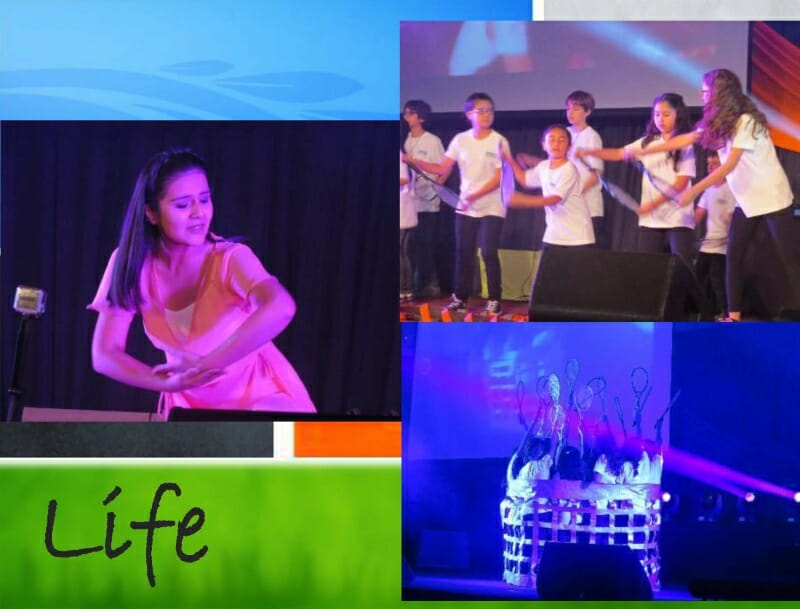
Oct 29, 2015 | Focolare Worldwide
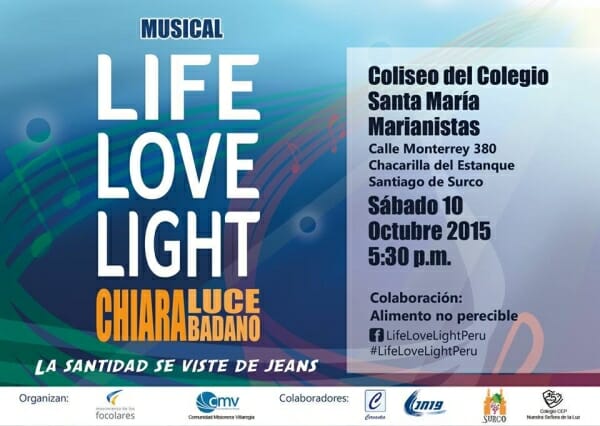 The musical, “Life, Love Light,” inspired by the life of Blessed Chiara Luce Badano, has arrived in Peru: on October 10th, just a few days after the 5th anniversary of the beatification of the young woman from Sassello, the show took the stage in Lima. Months ago, the Peruvian young people of the Focolare Movement had already contacted their Spanish peers, who had put on the same show in Burgos in their language, in order to obtain the materials. They were helped by the collaboration of the Community of Villaregia and the Misioneras Identes and several professionals – as they admit, “The show was beyond our capacities,” – who undertook the preparation of the musical.
The musical, “Life, Love Light,” inspired by the life of Blessed Chiara Luce Badano, has arrived in Peru: on October 10th, just a few days after the 5th anniversary of the beatification of the young woman from Sassello, the show took the stage in Lima. Months ago, the Peruvian young people of the Focolare Movement had already contacted their Spanish peers, who had put on the same show in Burgos in their language, in order to obtain the materials. They were helped by the collaboration of the Community of Villaregia and the Misioneras Identes and several professionals – as they admit, “The show was beyond our capacities,” – who undertook the preparation of the musical. 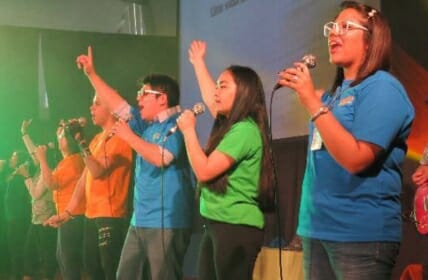 There were 75 young people who participated in the musical production, both from the Focolare and from other Movements who got involved. And one cannot overlook a series of “fortunate coincidences” in which the young people saw the hand of God’s Providence: from the availability of a hall which seats hundreds in a well-known section of Lima, to the meals brought for the whole team, thanks to the generosity of an adherent of the Movement, to the interviews released to two television stations – one of which taped the show for a pre-recorded broadcast.
There were 75 young people who participated in the musical production, both from the Focolare and from other Movements who got involved. And one cannot overlook a series of “fortunate coincidences” in which the young people saw the hand of God’s Providence: from the availability of a hall which seats hundreds in a well-known section of Lima, to the meals brought for the whole team, thanks to the generosity of an adherent of the Movement, to the interviews released to two television stations – one of which taped the show for a pre-recorded broadcast. 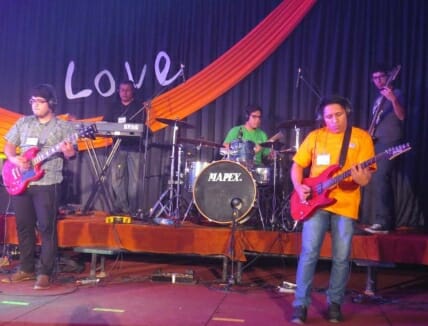 Even the 500 spectators did not hold back their generosity: while the admission was free, they responded to the appeal to donate dry or canned goods, which arrived in great quantities, to give to the needy people in the Community of Villaregia. The show was a great success in other ways, as the participants testified that it helped them to discover and value many hidden talents. A touching testimony was given by a mother of a 13-year-old girl affected by a serious form of depression, who said: “You have changed my daughter’s life.”
Even the 500 spectators did not hold back their generosity: while the admission was free, they responded to the appeal to donate dry or canned goods, which arrived in great quantities, to give to the needy people in the Community of Villaregia. The show was a great success in other ways, as the participants testified that it helped them to discover and value many hidden talents. A touching testimony was given by a mother of a 13-year-old girl affected by a serious form of depression, who said: “You have changed my daughter’s life.”  A message sent by Chiara Luce’s parents, Ruggero e Maria Teresa Badano, closed the evening, with their thanks for all that was achieved: “Her push towards sanctity and her faithfulness to the values of the Gospel of Jesus,” they wrote, “guided Chiara Luce even in the most difficult moments of her existence, and we are convinced that she will know how to inspire you. Because, as her spiritual mother Chiara Lubich said, ‘You have only one life, it’s worthwhile to live it well.’“
A message sent by Chiara Luce’s parents, Ruggero e Maria Teresa Badano, closed the evening, with their thanks for all that was achieved: “Her push towards sanctity and her faithfulness to the values of the Gospel of Jesus,” they wrote, “guided Chiara Luce even in the most difficult moments of her existence, and we are convinced that she will know how to inspire you. Because, as her spiritual mother Chiara Lubich said, ‘You have only one life, it’s worthwhile to live it well.’“
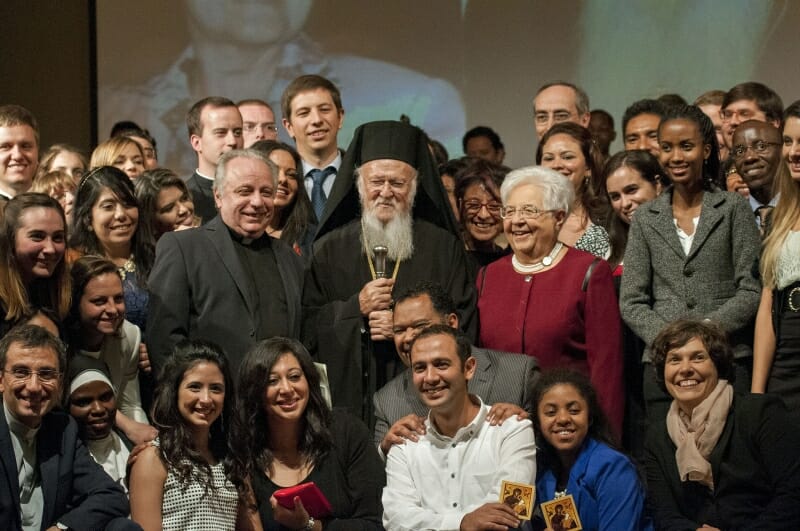
Oct 28, 2015 | Focolare Worldwide
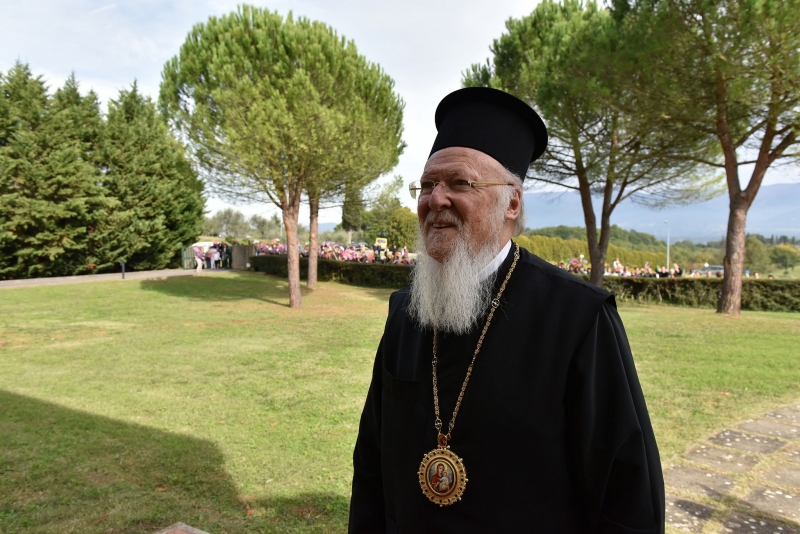
© CSC Audiovisivi

© CSC Audiovisivi
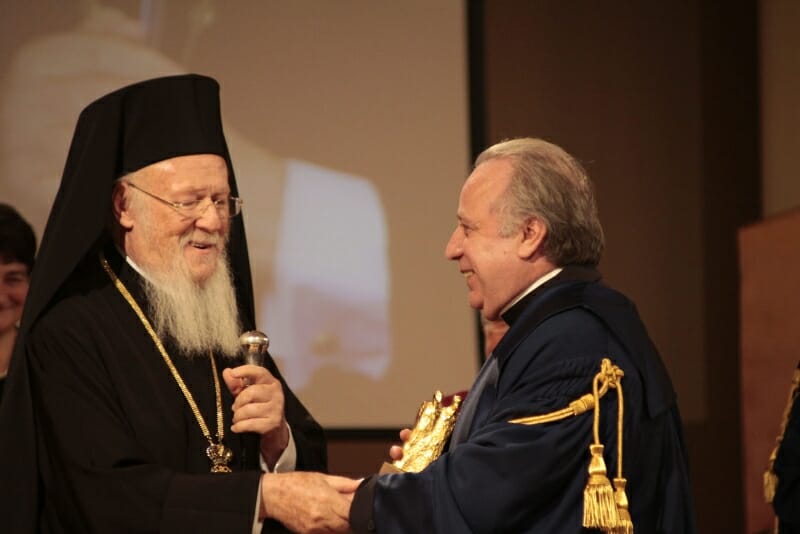
Oct 28, 2015 | Non categorizzato

Foto © CSC Audiovisivi
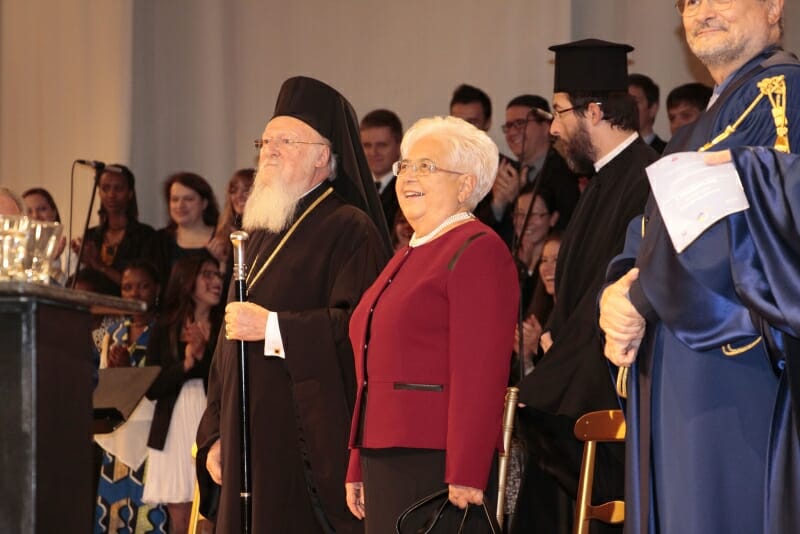
Oct 27, 2015 | Non categorizzato
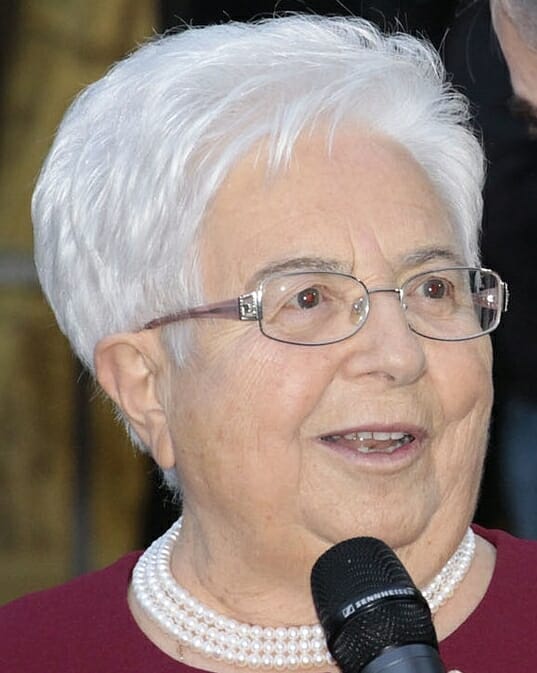 “Everyone was so touched by the brotherly affection that joins the Holy Father Francesco to His Holiness Patriarch Bartholomew. The Pope recognizes the Patriarch’s commitment in the journey of unity, which he describes as our common journey. Not only that: he very courageously says that this Honorary Degree is a step ahead in that journey.” You know the Patriarch very well, you have lived and now live even more intensely, this moment in a long history of closeness between the Focolare Movement and the Orthodox Church and its Patriarchs. What are your views on this Patriarch and the significance of this recognition? “Patriarch Bartholomew is the heir of the great Patriarch Athenagoras who really possessed this passion for unity which, in him, was almost a prophetic vision that he was not able to realize. This passion was transmitted particularly to Patriarch Bartholomew who never misses an opportunity to press for unity in the heart of the Orthodox Church, so that they can talk to one another to the Church of Rome with a voice that is already in a certain sense synodal. He tries in many ways to emphasise how much this journey together is alive. I think we are truly at a happy moment because there is gentle pressure being given by two heads of our two Churches, and that cannot but produce fruit. There will be resistance as Pope Francis pointed out at the conclusion of the Synod, but in the end there is the Holy Spirit who will help us, who pushes the Church securely towards the unity of the Churches. We think that this is a happy moment and that this recognition might be an important step, a concrete step on this journey.”
“Everyone was so touched by the brotherly affection that joins the Holy Father Francesco to His Holiness Patriarch Bartholomew. The Pope recognizes the Patriarch’s commitment in the journey of unity, which he describes as our common journey. Not only that: he very courageously says that this Honorary Degree is a step ahead in that journey.” You know the Patriarch very well, you have lived and now live even more intensely, this moment in a long history of closeness between the Focolare Movement and the Orthodox Church and its Patriarchs. What are your views on this Patriarch and the significance of this recognition? “Patriarch Bartholomew is the heir of the great Patriarch Athenagoras who really possessed this passion for unity which, in him, was almost a prophetic vision that he was not able to realize. This passion was transmitted particularly to Patriarch Bartholomew who never misses an opportunity to press for unity in the heart of the Orthodox Church, so that they can talk to one another to the Church of Rome with a voice that is already in a certain sense synodal. He tries in many ways to emphasise how much this journey together is alive. I think we are truly at a happy moment because there is gentle pressure being given by two heads of our two Churches, and that cannot but produce fruit. There will be resistance as Pope Francis pointed out at the conclusion of the Synod, but in the end there is the Holy Spirit who will help us, who pushes the Church securely towards the unity of the Churches. We think that this is a happy moment and that this recognition might be an important step, a concrete step on this journey.”  In his speech the Patriarch spoke precisely about what unity is and that it is different from union, which is different from uniqueness – diversity as richness, a concept that is quite present in the charism lived by Chiara Lubich. Could you explain to us a little more, in what way? “Chiara was always reminding us that the Church’s journey is guided by the Holy Spirit, and therefore He was surely maturing gifts in all the Churches of Christianity that would serve unity, that would serve if they were put in common. These gifts do not flatten but respect the diversity, precisely because they recognize a great richness in these diversities that only makes the Church more beautiful as Jesus wanted it. No uniformity therefore, but unity in diversity. Chiara would tell us that the highest model is the unity that joins the Most Holy Trinity where the Father is Himself because He is not the Son; the Son is Himself because He is not the Father; but the love that there is between the Father and the Son generates none other than the Holy Spirit who is the Third in this Trinitarian dimension, but is also the First since He links the Father and the Son. And this can happen because each of the Three Divine Persons of the Most Holy Trinity completely loses Himself in the other. This is precisely what is required for the Church’s journey; that is, that each one be able to completely lose himself in the other church; which means being able to reach all the way down to the bottom of one’s own richness and give it all to the other, to the others. Therefore, it requires knowing how to be love in order to build that Church of Christ in which each Christian, no matter what Christian community they belong to, feels like a sharer in the Body of Christ.” With this award, are there any new prospects that might open? “We were actually talking with the Patriarch himself about the possibility of eventually instituting a Chair at Sophia University Institute that would be part Roman Catholic and part Orthodox and would study such figures as Chiara Lubich and Patriarch Athenagoras, trying to sort out and understand the contribution they made and can continue make, through the encounter of their two charisms, to this journey of unity.” (From Vatican Radio)
In his speech the Patriarch spoke precisely about what unity is and that it is different from union, which is different from uniqueness – diversity as richness, a concept that is quite present in the charism lived by Chiara Lubich. Could you explain to us a little more, in what way? “Chiara was always reminding us that the Church’s journey is guided by the Holy Spirit, and therefore He was surely maturing gifts in all the Churches of Christianity that would serve unity, that would serve if they were put in common. These gifts do not flatten but respect the diversity, precisely because they recognize a great richness in these diversities that only makes the Church more beautiful as Jesus wanted it. No uniformity therefore, but unity in diversity. Chiara would tell us that the highest model is the unity that joins the Most Holy Trinity where the Father is Himself because He is not the Son; the Son is Himself because He is not the Father; but the love that there is between the Father and the Son generates none other than the Holy Spirit who is the Third in this Trinitarian dimension, but is also the First since He links the Father and the Son. And this can happen because each of the Three Divine Persons of the Most Holy Trinity completely loses Himself in the other. This is precisely what is required for the Church’s journey; that is, that each one be able to completely lose himself in the other church; which means being able to reach all the way down to the bottom of one’s own richness and give it all to the other, to the others. Therefore, it requires knowing how to be love in order to build that Church of Christ in which each Christian, no matter what Christian community they belong to, feels like a sharer in the Body of Christ.” With this award, are there any new prospects that might open? “We were actually talking with the Patriarch himself about the possibility of eventually instituting a Chair at Sophia University Institute that would be part Roman Catholic and part Orthodox and would study such figures as Chiara Lubich and Patriarch Athenagoras, trying to sort out and understand the contribution they made and can continue make, through the encounter of their two charisms, to this journey of unity.” (From Vatican Radio)
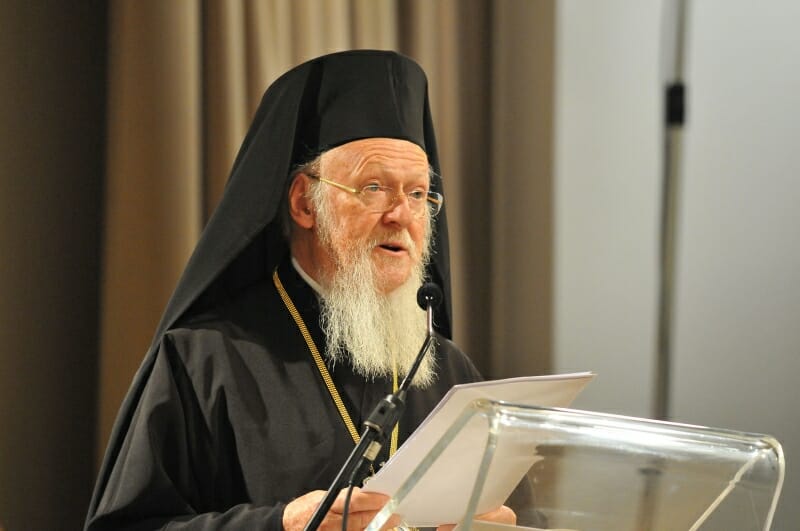
Oct 27, 2015 | Focolare Worldwide
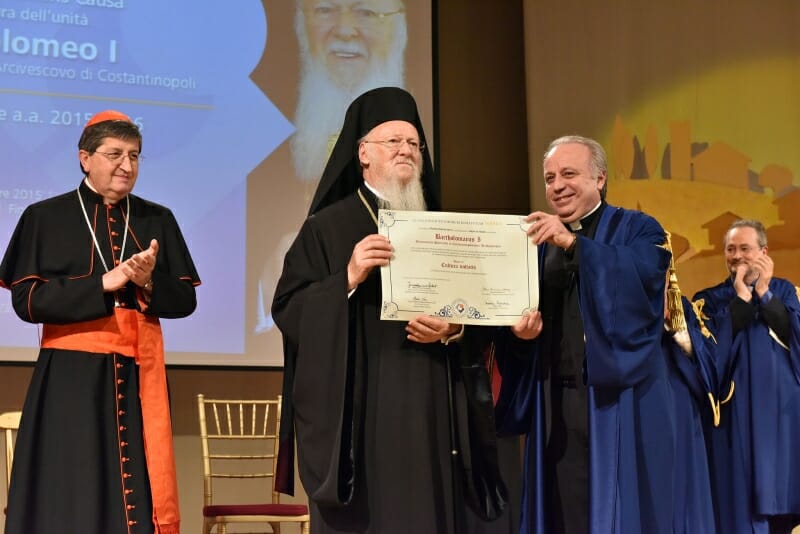 During his lecture on October 26, 2015, following the conferment of the title of Doctor in the “Culture of Unity” by Sophia University Institute, Bartholomew I recalled the history of relations between the two “sister” churches. Those relations had been marred by centuries of misunderstanding and, in time returned to the path towards unity with the lifting of the mutual excommunications and the steps taken by such figures as Paul VI and Athenagoras I whose legacy has been embraced by Bartholomew I. It is a path that has recently recalled the value of “synodality” as a key element in guiding the Church of Christ, and there were several occasions that expressed spiritual synergy. In his message, read by Cardinal Betori, Pope Francis addressed “the beloved brother Bartholomew” stressing “the common journey our Churches take towards full and visible unity, to which we aspire with dedication and perseverance.” The Patriarch was deeply touched by the Pope’s words and said he was “very” happy, confiding that he would “return to Istanbul stronger, more certain” knowing there was a “a brother in Rome who wished to work and pray with us to accelerate the unity of our churches” and to whom he responded with the “Kiss of Peace” invoking the prayer for a long life for Pope Francis.
During his lecture on October 26, 2015, following the conferment of the title of Doctor in the “Culture of Unity” by Sophia University Institute, Bartholomew I recalled the history of relations between the two “sister” churches. Those relations had been marred by centuries of misunderstanding and, in time returned to the path towards unity with the lifting of the mutual excommunications and the steps taken by such figures as Paul VI and Athenagoras I whose legacy has been embraced by Bartholomew I. It is a path that has recently recalled the value of “synodality” as a key element in guiding the Church of Christ, and there were several occasions that expressed spiritual synergy. In his message, read by Cardinal Betori, Pope Francis addressed “the beloved brother Bartholomew” stressing “the common journey our Churches take towards full and visible unity, to which we aspire with dedication and perseverance.” The Patriarch was deeply touched by the Pope’s words and said he was “very” happy, confiding that he would “return to Istanbul stronger, more certain” knowing there was a “a brother in Rome who wished to work and pray with us to accelerate the unity of our churches” and to whom he responded with the “Kiss of Peace” invoking the prayer for a long life for Pope Francis. 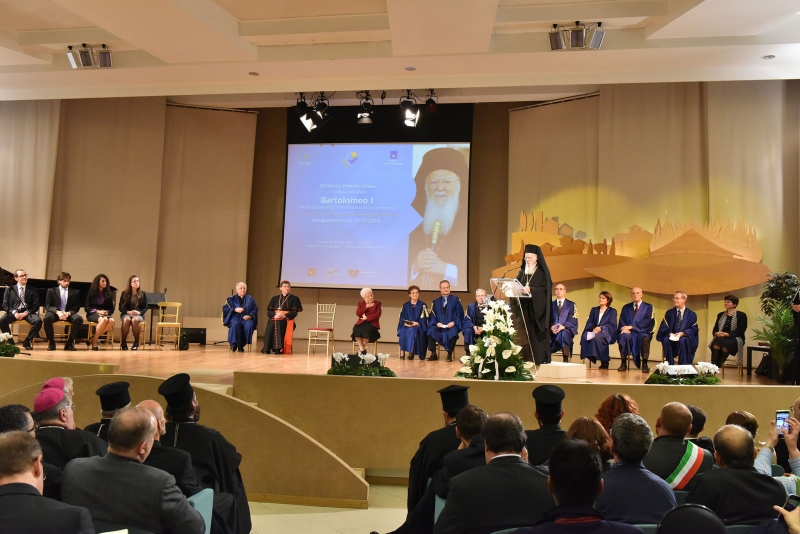 The Patriarch’s words breathed a history that had gone from “the refusal to recognise the other as Christian” to the rise of “protagonists of the new springtime in the Church who would make unity the main focus of their pastoral activity for the good of all” and because of their single desire of “advancing the ways of God.” His words also breathed a future history in which both Church and human institutions would understand that “diversities are a gift and not contrapositions, richness and not imbalance, life and not death” The ceremony was held in the Focolare town of Loppiano, Italy, where Sophia University Institute is located, and that day marked the opening of Sophia’s 8th academic year. More than a thousand people attended the extraordinary event with the presence of His Holiness Bartholomew I – several delegations from the Orthodox Church, representatives of the Roman Catholic Church, civic leaders, a Muslim community and over 4 thousand viewers connected via internet.
The Patriarch’s words breathed a history that had gone from “the refusal to recognise the other as Christian” to the rise of “protagonists of the new springtime in the Church who would make unity the main focus of their pastoral activity for the good of all” and because of their single desire of “advancing the ways of God.” His words also breathed a future history in which both Church and human institutions would understand that “diversities are a gift and not contrapositions, richness and not imbalance, life and not death” The ceremony was held in the Focolare town of Loppiano, Italy, where Sophia University Institute is located, and that day marked the opening of Sophia’s 8th academic year. More than a thousand people attended the extraordinary event with the presence of His Holiness Bartholomew I – several delegations from the Orthodox Church, representatives of the Roman Catholic Church, civic leaders, a Muslim community and over 4 thousand viewers connected via internet.  The recognition statement presented to the Patriarch of Constantinople expressed gratitude “for his courageous, enduring and fruitful patience in favour of a culture of unity” of which he is a “beloved and listened-to protagonist on the international level, on the ecclesial level in the dialogue between the Churches, on the interreligious level in the encounter amongst different religious traditions and experiences, and on the cultural level in the collaboration amongst women and men of all beliefs who follow the path of universal brotherhood.” In an interview, Dr. Piero Coda, President of the Institute, went on to say – explaining the culture of unity – it is not a utopia, but an “inspiration through which Chiara Lubich understood that the charism of unity given to her by God, could also be expressed by culture. There is always a need for mediations, models, as Pope Francis says, a cultural revolution, to channel existence towards new frontiers. This is why Sophia University Institute was begun.” Focolare president, Maria Voce, spoke for the whole Movement expressed to the Patriarch the joy and the honour of welcoming him to the town of Loppiano, mindful of the leading role he plays as a spiritual and intellectual figure, the value of his testimony and of his “calls to justice and the safeguarding of the environment which is our common home.” “Dialogue is our common priority,” Maria Voce continued, as she stated our wish to “pursue the path in total harmony of ideals and life witness.” Another step, recalled by Bartholomew I during an interview at the conclusion of the ceremony, was the November 2015 gathering in Istanbul, of Bishop Friends of the Focolare from different churches: “There,” he said, “we will be able to express our will to work for the unity of our Churches. We are glad and ready to welcome them and to exchange the Kiss of Peace between East and West.” Unity in diversity was one of the “new terms” that were mentioned, and that University president Piero Coda strongly emphasised: “the Gospel is not uniformity, but appreciation of differences. Flowing from the same font, they are ‘unity’ precisely in the measure to which they enter into relation with one another; that is, that they mutually recognize the gifts that each of them carries. Therefore, diversity is the flower of unity when it is lived as a relationship, as fraternity, as communion.” “And it is precisely in the acceptance of the diversity” – the Patriarch concluded – “through the dialogue of love, mutual respect, acceptance of the Other and our availability to welcome and be welcomed, that we will be able to become for the world icons of Christ and like Him, in unity, also be diversity.” Replay streaming Message from Pope Francis Press Release
The recognition statement presented to the Patriarch of Constantinople expressed gratitude “for his courageous, enduring and fruitful patience in favour of a culture of unity” of which he is a “beloved and listened-to protagonist on the international level, on the ecclesial level in the dialogue between the Churches, on the interreligious level in the encounter amongst different religious traditions and experiences, and on the cultural level in the collaboration amongst women and men of all beliefs who follow the path of universal brotherhood.” In an interview, Dr. Piero Coda, President of the Institute, went on to say – explaining the culture of unity – it is not a utopia, but an “inspiration through which Chiara Lubich understood that the charism of unity given to her by God, could also be expressed by culture. There is always a need for mediations, models, as Pope Francis says, a cultural revolution, to channel existence towards new frontiers. This is why Sophia University Institute was begun.” Focolare president, Maria Voce, spoke for the whole Movement expressed to the Patriarch the joy and the honour of welcoming him to the town of Loppiano, mindful of the leading role he plays as a spiritual and intellectual figure, the value of his testimony and of his “calls to justice and the safeguarding of the environment which is our common home.” “Dialogue is our common priority,” Maria Voce continued, as she stated our wish to “pursue the path in total harmony of ideals and life witness.” Another step, recalled by Bartholomew I during an interview at the conclusion of the ceremony, was the November 2015 gathering in Istanbul, of Bishop Friends of the Focolare from different churches: “There,” he said, “we will be able to express our will to work for the unity of our Churches. We are glad and ready to welcome them and to exchange the Kiss of Peace between East and West.” Unity in diversity was one of the “new terms” that were mentioned, and that University president Piero Coda strongly emphasised: “the Gospel is not uniformity, but appreciation of differences. Flowing from the same font, they are ‘unity’ precisely in the measure to which they enter into relation with one another; that is, that they mutually recognize the gifts that each of them carries. Therefore, diversity is the flower of unity when it is lived as a relationship, as fraternity, as communion.” “And it is precisely in the acceptance of the diversity” – the Patriarch concluded – “through the dialogue of love, mutual respect, acceptance of the Other and our availability to welcome and be welcomed, that we will be able to become for the world icons of Christ and like Him, in unity, also be diversity.” Replay streaming Message from Pope Francis Press Release
![Protagonists in building a world of peace]()
Oct 27, 2015 | Non categorizzato
 Their “ethical statute” defines them as people who are immersed in «the contradictions and difficulties of the present time, and who take on themselves the burdens and sufferings of the world of work …in the perspective of universal brotherhood.» In this tension one can see the signs of that essential “new school of thought” indicated by Pasquale Foresi (“life itself makes us comprehend”), co-founder of the Focolare Movement who affirmed: «work is not only a means of sustainment, but is something inherent to our human nature, and is thus also a means to get to know reality and understand life. » It was a working method revealed through the experience of the employees of the former CGlobal company of Pisa involved in one of the usual restructuring and delocalization of businesses, and the story of the “bonds of solidarity” trade union fund of Pomigliano d’Arco, Naples, created thanks to the Parish of San Felice in Pincis, to give mutual aid to a community on the verge of collapse due to the lack of jobs caused by the international division of work steered by the multinational corporations. This scenario was completed by the dissertation of Alberto Botto, Secretary General of the trade union Luz y Fuerza in Rosario, Argentina, on the resistance of the labour unions in a confrontation with the power of military dictatorships and the liberalist privatisation formulas that risked to dissolve their country.
Their “ethical statute” defines them as people who are immersed in «the contradictions and difficulties of the present time, and who take on themselves the burdens and sufferings of the world of work …in the perspective of universal brotherhood.» In this tension one can see the signs of that essential “new school of thought” indicated by Pasquale Foresi (“life itself makes us comprehend”), co-founder of the Focolare Movement who affirmed: «work is not only a means of sustainment, but is something inherent to our human nature, and is thus also a means to get to know reality and understand life. » It was a working method revealed through the experience of the employees of the former CGlobal company of Pisa involved in one of the usual restructuring and delocalization of businesses, and the story of the “bonds of solidarity” trade union fund of Pomigliano d’Arco, Naples, created thanks to the Parish of San Felice in Pincis, to give mutual aid to a community on the verge of collapse due to the lack of jobs caused by the international division of work steered by the multinational corporations. This scenario was completed by the dissertation of Alberto Botto, Secretary General of the trade union Luz y Fuerza in Rosario, Argentina, on the resistance of the labour unions in a confrontation with the power of military dictatorships and the liberalist privatisation formulas that risked to dissolve their country. 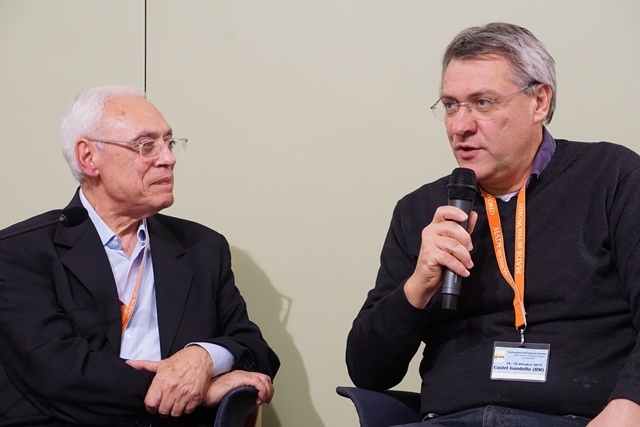 In the light of the paradigm of “this economy that kills,” to cite the Pope, precisely those who decided to take action in the trade union out of a “thirst for justice” are experiencing the fragility and limits of their organizational methods compared to the commercialization of all aspects of life. The three days thus aimed to create an “unarmed” zone, where each could express the reasons for his/her commitment. It was a mutual sharing that highlighted sharing sessions and moments of a challenging dialogue with Maurizio Landini and Marco Bentivogli, national secretaries of two Italian metalworkers’ unions (Fiom Cgil and Fim Cisl), and also with Giorgio Cremaschi of the radical, critical area. The programme included the confrontation with Cecilia Brighi who has worked years in the international employment organization of the trade unions, and with professors, Antonio Maria Baggio, Barbara Sena and Alberto Lo Presti, who presented the actuality of a fundamental text re-edited by Città Nuova (“Labour issues and Christianity,” by Von Ketteler).
In the light of the paradigm of “this economy that kills,” to cite the Pope, precisely those who decided to take action in the trade union out of a “thirst for justice” are experiencing the fragility and limits of their organizational methods compared to the commercialization of all aspects of life. The three days thus aimed to create an “unarmed” zone, where each could express the reasons for his/her commitment. It was a mutual sharing that highlighted sharing sessions and moments of a challenging dialogue with Maurizio Landini and Marco Bentivogli, national secretaries of two Italian metalworkers’ unions (Fiom Cgil and Fim Cisl), and also with Giorgio Cremaschi of the radical, critical area. The programme included the confrontation with Cecilia Brighi who has worked years in the international employment organization of the trade unions, and with professors, Antonio Maria Baggio, Barbara Sena and Alberto Lo Presti, who presented the actuality of a fundamental text re-edited by Città Nuova (“Labour issues and Christianity,” by Von Ketteler).  The working sessions under the guidance of Antonella Galluzzi and Stefano Biondi, “Made in The World” contact persons and followed up by the Focolare Movement’s leaders of cultural dialogue, Caterina Mulatero and Joao Manuel Motta, saw the participation of the president of the Movement, Maria Voce, who remarked: «the truth is that jobs are not lacking. God did not leave us without work; just look around and see the needs and emergencies of civil society! What seems to be lacking is money. Where has it gone? Corruption and thirst for unlimited profits has created a gap between work and money, and its usage.» This is why we have to «take on the wounds of humanity together» with our “expertise” which is « universal brotherhood, reconciling man with man.» The participants departed with the great desire to share what they had experienced in order to promote opportunities for dialogue with other trade unions. «We understood that we are not alone – one of the Argentinean union members said – and that it is vital to remain united to give a spirit to the unionist struggle, in order to convey it to everyone.»
The working sessions under the guidance of Antonella Galluzzi and Stefano Biondi, “Made in The World” contact persons and followed up by the Focolare Movement’s leaders of cultural dialogue, Caterina Mulatero and Joao Manuel Motta, saw the participation of the president of the Movement, Maria Voce, who remarked: «the truth is that jobs are not lacking. God did not leave us without work; just look around and see the needs and emergencies of civil society! What seems to be lacking is money. Where has it gone? Corruption and thirst for unlimited profits has created a gap between work and money, and its usage.» This is why we have to «take on the wounds of humanity together» with our “expertise” which is « universal brotherhood, reconciling man with man.» The participants departed with the great desire to share what they had experienced in order to promote opportunities for dialogue with other trade unions. «We understood that we are not alone – one of the Argentinean union members said – and that it is vital to remain united to give a spirit to the unionist struggle, in order to convey it to everyone.»
Oct 26, 2015 | Non categorizzato
His Holiness Bartholomew I, Ecumenical Patriarch of Constantinople, a pioneer in ecumenical dialogue and a peacemaker, will be receiving the first honory doctoral degree in the Culture of unity conferred by the Sophia University Institute, situated in Loppiano (Florence) and founded by Chiara Lubich to deal competently and effectively with the cultural transition taking place. The theologian Piero Coda, President of the University Institute said: “Today, the world needs people who seek the unity of the human family, and the Patriarch is constantly rendering a valuable service towards a culture that aims at placing fraternity at the heart of human history”. […]. Diretta streaming See more: Patriarch Bartholomew I visits the Focolare’s little town of Loppiano
![Protagonists in building a world of peace]()
Oct 26, 2015 | Focolare Worldwide, Senza categoria
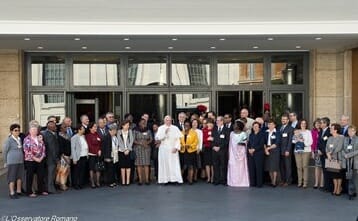 It was a living experience of the Church that was very important for them, a unique experience in their life that they will always carry in their hearts. That is how the family from Colombia described their experience – María Angélica, a dentist, and Luis, Director of the Ethics Department at the University of Gran Colombia, and their two sons of 18 and 20 years. From October 4th to the 25th, they attended the Ordinary Synod on the Family “The vocation and mission of the family in the Church and the contemporary world.” They have been working for families for over 20 years in connection with the Focolare Movement, accompanying couples in the process of preparing for marriage, and for the years that follow when the inevitable crises threaten to deteriorate the sacrament and the love. You had an active role in the work of the small groups. Which moments seemed important to you in making a contribution to the Synod? The experience in the small groups was quite beautiful, because we were able to offer our own experience and that of other families, presenting what we wish to live as a family: the dynamic of love that is lived in the Trinity – in which each of the Three Divine Persons is Love for the other. This is one thing we were able to contribute. Also: emphasising the importance of the Eucharist; we highlighted the need for the presence of Jesus amongst families through mutual love; and so we shared with them about the times we have asked forgiveness of one another when there was not full unity. Another contribution was the point about divorced and remarried couples. It is important to feel a particular love for these families. And that according to the measure in which the experience of faith in them begins to grow – accompanying them to the point that they feel that Jesus is also in their neighbour, in the Word of the Gospel that is meant to be lived, in the community that lives in mutual love – their nearness to Jesus grows. We felt that one important point to be presented to the Synod fathers was Jesus crucified and forsaken, since He took upon Himself the sufferings of humanity. In Him we see the one who was betrayed, humiliated, feeling alone, abandoned, culpable, left without an answer to His question. We are all joined in Him because He lived through all that, and in Him we can have this unique communion wherein all are contained in this yes to Him. This was our proposal: that there is no difference between the family that has not suffered failure and the one that has, because we have all feel accepted by Him. We described the experience of many families, also in the Movement, in which they had said this yes with the pain of not being able to receive the Eucharist, but still knowing that they were called to holiness. Therefore, they are not excluded from the invitation to holiness. As Pope Benedict once remarked: they highlight the beauty of the indissolubility of marriage; they are also builders of this indissolubility, so they make a huge contribution as they grow in this yes.
It was a living experience of the Church that was very important for them, a unique experience in their life that they will always carry in their hearts. That is how the family from Colombia described their experience – María Angélica, a dentist, and Luis, Director of the Ethics Department at the University of Gran Colombia, and their two sons of 18 and 20 years. From October 4th to the 25th, they attended the Ordinary Synod on the Family “The vocation and mission of the family in the Church and the contemporary world.” They have been working for families for over 20 years in connection with the Focolare Movement, accompanying couples in the process of preparing for marriage, and for the years that follow when the inevitable crises threaten to deteriorate the sacrament and the love. You had an active role in the work of the small groups. Which moments seemed important to you in making a contribution to the Synod? The experience in the small groups was quite beautiful, because we were able to offer our own experience and that of other families, presenting what we wish to live as a family: the dynamic of love that is lived in the Trinity – in which each of the Three Divine Persons is Love for the other. This is one thing we were able to contribute. Also: emphasising the importance of the Eucharist; we highlighted the need for the presence of Jesus amongst families through mutual love; and so we shared with them about the times we have asked forgiveness of one another when there was not full unity. Another contribution was the point about divorced and remarried couples. It is important to feel a particular love for these families. And that according to the measure in which the experience of faith in them begins to grow – accompanying them to the point that they feel that Jesus is also in their neighbour, in the Word of the Gospel that is meant to be lived, in the community that lives in mutual love – their nearness to Jesus grows. We felt that one important point to be presented to the Synod fathers was Jesus crucified and forsaken, since He took upon Himself the sufferings of humanity. In Him we see the one who was betrayed, humiliated, feeling alone, abandoned, culpable, left without an answer to His question. We are all joined in Him because He lived through all that, and in Him we can have this unique communion wherein all are contained in this yes to Him. This was our proposal: that there is no difference between the family that has not suffered failure and the one that has, because we have all feel accepted by Him. We described the experience of many families, also in the Movement, in which they had said this yes with the pain of not being able to receive the Eucharist, but still knowing that they were called to holiness. Therefore, they are not excluded from the invitation to holiness. As Pope Benedict once remarked: they highlight the beauty of the indissolubility of marriage; they are also builders of this indissolubility, so they make a huge contribution as they grow in this yes.  At times, it’s a matter of understanding the deep meaning of the sacrament. For many people of our day the sacrament of matrimony doesn’t say much, also because the couple has not been provided with an adequate formation, neither by parish nor ecclesial movement; whereas, it is a part of the journey of every human being to understand how to be human and to discover the transcendent dimension within oneself. It needs to be discovered how this sacrament can help in forming a family and why, through the family, we are responsible for children.” One day, coming out of the small group session, you felt the wish that the bishops would comprehend your deep love for the Church. . . “The relationship and the dialogue with the bishops has been drawing us closer and closer over the past few weeks, closer in knowing one another, listening to one another, also in trying to be ‘mothers’ towards them. For example, if they had a cough, a cold . . . we wished that they would be able to feel that we families also love the Church as they do; that we suffer for the Church as they do; that we also give our life for the Church. We’re on the same journey. As Chiara Lubich once told us: each one of us is like a piece of a mosaic, so our value lies in helping to create the beautiful reality that is the Church. It was very important that this was said – and heard.” One of your own offerings was included in the final document. “Yes, in the final small group meeting the relator asked if we would describe our experience as a family. Then, what was proposed for the final document also contained what each one of us had said. You can’t even tell, really, what was proposed by a family and what was proposed by a Synod father: it was everyone’s proposal, unanimously agreed upon.” What would your wish be for the conclusion of the Synod? “Many best wishes! The hope that, little by little, all families will discover the richness contained in them, no matter what their situation – ‘regular’ or ‘irregular’ – if they live as a real family, to make society better: for the growth of humanity.”
At times, it’s a matter of understanding the deep meaning of the sacrament. For many people of our day the sacrament of matrimony doesn’t say much, also because the couple has not been provided with an adequate formation, neither by parish nor ecclesial movement; whereas, it is a part of the journey of every human being to understand how to be human and to discover the transcendent dimension within oneself. It needs to be discovered how this sacrament can help in forming a family and why, through the family, we are responsible for children.” One day, coming out of the small group session, you felt the wish that the bishops would comprehend your deep love for the Church. . . “The relationship and the dialogue with the bishops has been drawing us closer and closer over the past few weeks, closer in knowing one another, listening to one another, also in trying to be ‘mothers’ towards them. For example, if they had a cough, a cold . . . we wished that they would be able to feel that we families also love the Church as they do; that we suffer for the Church as they do; that we also give our life for the Church. We’re on the same journey. As Chiara Lubich once told us: each one of us is like a piece of a mosaic, so our value lies in helping to create the beautiful reality that is the Church. It was very important that this was said – and heard.” One of your own offerings was included in the final document. “Yes, in the final small group meeting the relator asked if we would describe our experience as a family. Then, what was proposed for the final document also contained what each one of us had said. You can’t even tell, really, what was proposed by a family and what was proposed by a Synod father: it was everyone’s proposal, unanimously agreed upon.” What would your wish be for the conclusion of the Synod? “Many best wishes! The hope that, little by little, all families will discover the richness contained in them, no matter what their situation – ‘regular’ or ‘irregular’ – if they live as a real family, to make society better: for the growth of humanity.”
Oct 25, 2015 | Non categorizzato
“God created the family, and he formed it in this way. He wants there to be love between husband and wife. If love is missing, there’s no marriage, no matrimony. Unfortunately, because of sin, this love has been spoiled to some extent. This love has been clouded over because sin entered humanity. So Jesus came and healed the situation, bringing a stronger love, a greater love, the very love that comes from God, the love which is God himself. So, we must take advantage of what Jesus brought, use this love in order to maintain natural love as well. For example, if you didn’t love your husband any more, you would have to love him because he is Jesus, because he is another Jesus, because you have to be the first to love, because you have to love everyone, because you have to make yourself one, because you have to love him as yourself. In other words, you bring supernatural love into the situation, with all that it means, in order to safeguard human love too. This is what to do and this way of doing things is the foundation of our New Families Movement.” Source: Chiara Lubich Center Video (italian soundtrack) https://vimeo.com/142517715
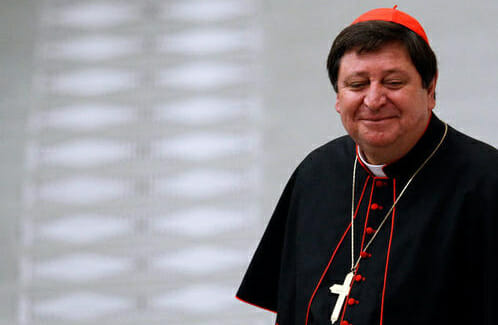
Oct 25, 2015 | Non categorizzato
 “It was the Son of God, Jesus Christ who revealed to us the true image of God and the true image of man and woman. God is Father, Son and Holy Spirit. We are, therefore, not dealing with three gods but one God in three Persons, as lengthily described in the doctrine of the Trinity. The Church has deepened and preserved this doctrine in all its integrity throughout the centuries. Besides finding the correct language in its profession of faith, the Church has always adored the Three Divine Persons. Up to the present, the spiritual Trinitarian doctrine has shown us the deep relationship the disciples of Jesus had with each of these Three Divine Persons. The Word of God does not present God only as a perfect Spirit, creator of heaven and earth, (as declared in the Christian Doctrine’s Second Catechism), but affirms that “God is love” (1 John 4,8.16). Saint Augustine tried to delve deeper into the path of love in God and reached the point of affirming that God is the Lover, the Beloved, and Love itself. However, he felt incapable of pursuing this path and bequeathed to us the deepening of this mystery in man and woman, in the three qualities of intelligence, memory and will. But what remained to be fully developed was the deeper understanding of the mystery of God who is Love. In our time, in which culture affirms the individual up to the point of falling into an exasperated individualism, and we struggle to make the synthesis between unity and diversity in the human relationships in this globalised world where human relationships are still re-evaluated in all senses, it would be opportune to seek in the Holy Trinity, that essentially Christian foundation, the path towards the fulfillment of love as a human identity. What is love? How can we understand and experience love? Our pathway must be found in the pathway of He who came to us from the womb of the Father, that is, the Son. To meet man, God who is love made himself nothing (Nazareth, Maria, Joseph, Bethlehem, the flight to Egypt. The Cross) (cfr text of Paul to the Philppians 2,5-11). Love passes through the incarnation and the mystery of the resurrection. Love makes itself nothing to be able to meet the other. This is the Kenotic dimension of love. Without this path it would be difficult for man and woman to find that relationship with God, but also with each other, whether man or woman. In this sense I think we could find the Trinitarian path of anthropology, not only theoretically but concretely.”
“It was the Son of God, Jesus Christ who revealed to us the true image of God and the true image of man and woman. God is Father, Son and Holy Spirit. We are, therefore, not dealing with three gods but one God in three Persons, as lengthily described in the doctrine of the Trinity. The Church has deepened and preserved this doctrine in all its integrity throughout the centuries. Besides finding the correct language in its profession of faith, the Church has always adored the Three Divine Persons. Up to the present, the spiritual Trinitarian doctrine has shown us the deep relationship the disciples of Jesus had with each of these Three Divine Persons. The Word of God does not present God only as a perfect Spirit, creator of heaven and earth, (as declared in the Christian Doctrine’s Second Catechism), but affirms that “God is love” (1 John 4,8.16). Saint Augustine tried to delve deeper into the path of love in God and reached the point of affirming that God is the Lover, the Beloved, and Love itself. However, he felt incapable of pursuing this path and bequeathed to us the deepening of this mystery in man and woman, in the three qualities of intelligence, memory and will. But what remained to be fully developed was the deeper understanding of the mystery of God who is Love. In our time, in which culture affirms the individual up to the point of falling into an exasperated individualism, and we struggle to make the synthesis between unity and diversity in the human relationships in this globalised world where human relationships are still re-evaluated in all senses, it would be opportune to seek in the Holy Trinity, that essentially Christian foundation, the path towards the fulfillment of love as a human identity. What is love? How can we understand and experience love? Our pathway must be found in the pathway of He who came to us from the womb of the Father, that is, the Son. To meet man, God who is love made himself nothing (Nazareth, Maria, Joseph, Bethlehem, the flight to Egypt. The Cross) (cfr text of Paul to the Philppians 2,5-11). Love passes through the incarnation and the mystery of the resurrection. Love makes itself nothing to be able to meet the other. This is the Kenotic dimension of love. Without this path it would be difficult for man and woman to find that relationship with God, but also with each other, whether man or woman. In this sense I think we could find the Trinitarian path of anthropology, not only theoretically but concretely.”

Oct 24, 2015 | Focolare Worldwide
 “We also felt the need to do something for all the poor families in our city. And we discovered that here in Teramo (Italy), the Caritas association runs an emporium where they collect basic goods for those in need. And so, with our parents, we visited this emporium and having discovered – to our great joy – that some bakers in the city donate not only the leftovers but also fresh bread, we decided to take eggs, jam, toilet paper, and refreshing tissues (since, as they said, they work like water). We filled up three trolleys with gifts!!! We all, kids and adults were all very happy, because we discovered a way of helping people who have nothing to eat. Now that we know about this special supermarket, we shall return and try to involve all our friends.” (The gen4 and gen3 boys and girls of Teramo, Italy)
“We also felt the need to do something for all the poor families in our city. And we discovered that here in Teramo (Italy), the Caritas association runs an emporium where they collect basic goods for those in need. And so, with our parents, we visited this emporium and having discovered – to our great joy – that some bakers in the city donate not only the leftovers but also fresh bread, we decided to take eggs, jam, toilet paper, and refreshing tissues (since, as they said, they work like water). We filled up three trolleys with gifts!!! We all, kids and adults were all very happy, because we discovered a way of helping people who have nothing to eat. Now that we know about this special supermarket, we shall return and try to involve all our friends.” (The gen4 and gen3 boys and girls of Teramo, Italy)
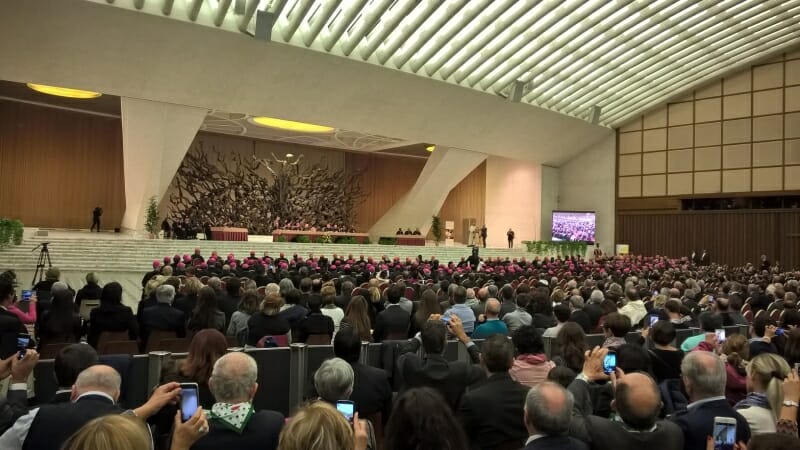
Oct 24, 2015 | Senza categoria
 It was a solemn celebration in the presence of all the synod Fathers, delegations, ambassadors and Pope Francis – who gave one of the most important speeches of his pontificate – on 17 October in the Nervi Hall, to commemorate 50 years since the institution of the Bishops’ Synod by Pope Paul VI. Focolare President, Maria Voce defined it, “a masterpiece”, when asked to comment on the spur of the moment, on the Pope’s speech. “He illustrated that there cannot be a progress of the Church if not as a synodal body. I was struck when he underlined the importance of the sensus fidei, that is, the sense of faith, and the infallibility of the people of God, who together listen to the Holy Spirit, thus expressing the faith of the Church. And this starts always from the base. In this manner, with all the juridical collegiate figures that emerged after the Second Vatican Council – Pope Francis makes us see – that if we don’t live this synodal spirit, starting from the people it addresses, they will not serve to enhance communion. They would all be just masks.” And regarding the primacy of service: “Let us never forget this!” the Pope exclaimed. “For the disciples of Jesus, of the past, today and for always, the only authority is that of service, the sole power is the cross, in the Master’s words: ”’You know that the governors of the nations rule over them and the leaders oppress them. Among you it will not be so; whoever wishes to be great among you, will be your servant and whoever wants to be first among you, will be your slave’ (Mt 20,25-27). Among you it will not be so: in this expression we reach that very heart in which we have been trying for some time now to reflect ourselves, exactly in the sense which he explained: “the top is found below the base. Due to this, those who exert authority are called ‘ministers’ because, according to the original meaning of the word, they are the smallest among all.” What comes out once more in his speech is the same wavelength between Pope Francis and Patriarch Bartholomew I: “The commitment to build a synodal Church – a mission to which we are all called, each in the role the Lord entrusted us with – is burdened by ecumenical implications. Due to this, in speaking to a delegation of the Patriarchate of Costantinople, I recently stressed the conviction that ‘the careful examination of how the principle of synodality is expressed in the life of the church and the service of he who presides it, will offer an important contribution to the progress of relationships between our Churches.” Maria Voce also underlined, “It is a synergy – that not only regards the problems of creation expressed in the encyclical Laudato si’; it is precisely this feeling of synodality of the Church that pushes Pope Francis to open a door to say: we must get together as one. It is a responsibility that urges him to find a way of getting down to concrete steps towards a full communion among Christians, because only in this can the synodal spirit of the Church be seen.” Lastly, Maria Voce continued, “The effort is not to seek compromises, but that which the Holy Spirit wants to say to us, which is a challenge that requires a strong unity of the entire Church. We spoke with various participants of the Synod for Families in the past days, and also with the family of married focolarini from Colombia, María Angélica and Luis Rojas, and all asked us for prayers. So let us intensify our prayers as if we were there, trying to understand how to respond to the anguish and difficulties of the family in the modern world, and regard the family as part of God’s plan.” The motivation and strong words of Paul VI that accompanied the institution of the Synod of Bishops on 15 September 1965 are particularly important for the Focolare Movement, precisely because the institution of the Synod, Maria Voce explained, “brought a new climate within the Church, a turning point: that of collegiality, communion, passing from a manner of conducting the individual and rather hierarchical Church, to a collegial one. As the Focolare Movement, as a movement of unity, we thus could not but take this event into consideration, and with joy I accepted Cardinal Baldisseri’s invitation to participate in the commemoration.” The Synods, in fact, are the concrete prosecution of the Second Vatican Council: «Paul VI, evidently inspired by the Holy Spirit after having made such a beautiful experience of the council, which had stirred up new realities in the Church – just think of the documents Gaudium et Spes, Lumen Gentium, Nostra Aetate – felt that this experience had to continue.» “Synod,” in fact, precisely means “journey together” as Cardinal Schönborn explained in his speech on the birth of the Synod of Bishops and on the various Synods, with the force of the Pope. It thus means that «the Church is walking together, not the Pope by himself, the bishops by themselves, the people of God by themselves, or the laity by themselves: this journey is undertaken by the Church, in which all have something to say and give.” Read more: press release on the participation of the Focolare in the commemoration of the 50th anniversary of the Synod of Bishops.
It was a solemn celebration in the presence of all the synod Fathers, delegations, ambassadors and Pope Francis – who gave one of the most important speeches of his pontificate – on 17 October in the Nervi Hall, to commemorate 50 years since the institution of the Bishops’ Synod by Pope Paul VI. Focolare President, Maria Voce defined it, “a masterpiece”, when asked to comment on the spur of the moment, on the Pope’s speech. “He illustrated that there cannot be a progress of the Church if not as a synodal body. I was struck when he underlined the importance of the sensus fidei, that is, the sense of faith, and the infallibility of the people of God, who together listen to the Holy Spirit, thus expressing the faith of the Church. And this starts always from the base. In this manner, with all the juridical collegiate figures that emerged after the Second Vatican Council – Pope Francis makes us see – that if we don’t live this synodal spirit, starting from the people it addresses, they will not serve to enhance communion. They would all be just masks.” And regarding the primacy of service: “Let us never forget this!” the Pope exclaimed. “For the disciples of Jesus, of the past, today and for always, the only authority is that of service, the sole power is the cross, in the Master’s words: ”’You know that the governors of the nations rule over them and the leaders oppress them. Among you it will not be so; whoever wishes to be great among you, will be your servant and whoever wants to be first among you, will be your slave’ (Mt 20,25-27). Among you it will not be so: in this expression we reach that very heart in which we have been trying for some time now to reflect ourselves, exactly in the sense which he explained: “the top is found below the base. Due to this, those who exert authority are called ‘ministers’ because, according to the original meaning of the word, they are the smallest among all.” What comes out once more in his speech is the same wavelength between Pope Francis and Patriarch Bartholomew I: “The commitment to build a synodal Church – a mission to which we are all called, each in the role the Lord entrusted us with – is burdened by ecumenical implications. Due to this, in speaking to a delegation of the Patriarchate of Costantinople, I recently stressed the conviction that ‘the careful examination of how the principle of synodality is expressed in the life of the church and the service of he who presides it, will offer an important contribution to the progress of relationships between our Churches.” Maria Voce also underlined, “It is a synergy – that not only regards the problems of creation expressed in the encyclical Laudato si’; it is precisely this feeling of synodality of the Church that pushes Pope Francis to open a door to say: we must get together as one. It is a responsibility that urges him to find a way of getting down to concrete steps towards a full communion among Christians, because only in this can the synodal spirit of the Church be seen.” Lastly, Maria Voce continued, “The effort is not to seek compromises, but that which the Holy Spirit wants to say to us, which is a challenge that requires a strong unity of the entire Church. We spoke with various participants of the Synod for Families in the past days, and also with the family of married focolarini from Colombia, María Angélica and Luis Rojas, and all asked us for prayers. So let us intensify our prayers as if we were there, trying to understand how to respond to the anguish and difficulties of the family in the modern world, and regard the family as part of God’s plan.” The motivation and strong words of Paul VI that accompanied the institution of the Synod of Bishops on 15 September 1965 are particularly important for the Focolare Movement, precisely because the institution of the Synod, Maria Voce explained, “brought a new climate within the Church, a turning point: that of collegiality, communion, passing from a manner of conducting the individual and rather hierarchical Church, to a collegial one. As the Focolare Movement, as a movement of unity, we thus could not but take this event into consideration, and with joy I accepted Cardinal Baldisseri’s invitation to participate in the commemoration.” The Synods, in fact, are the concrete prosecution of the Second Vatican Council: «Paul VI, evidently inspired by the Holy Spirit after having made such a beautiful experience of the council, which had stirred up new realities in the Church – just think of the documents Gaudium et Spes, Lumen Gentium, Nostra Aetate – felt that this experience had to continue.» “Synod,” in fact, precisely means “journey together” as Cardinal Schönborn explained in his speech on the birth of the Synod of Bishops and on the various Synods, with the force of the Pope. It thus means that «the Church is walking together, not the Pope by himself, the bishops by themselves, the people of God by themselves, or the laity by themselves: this journey is undertaken by the Church, in which all have something to say and give.” Read more: press release on the participation of the Focolare in the commemoration of the 50th anniversary of the Synod of Bishops.
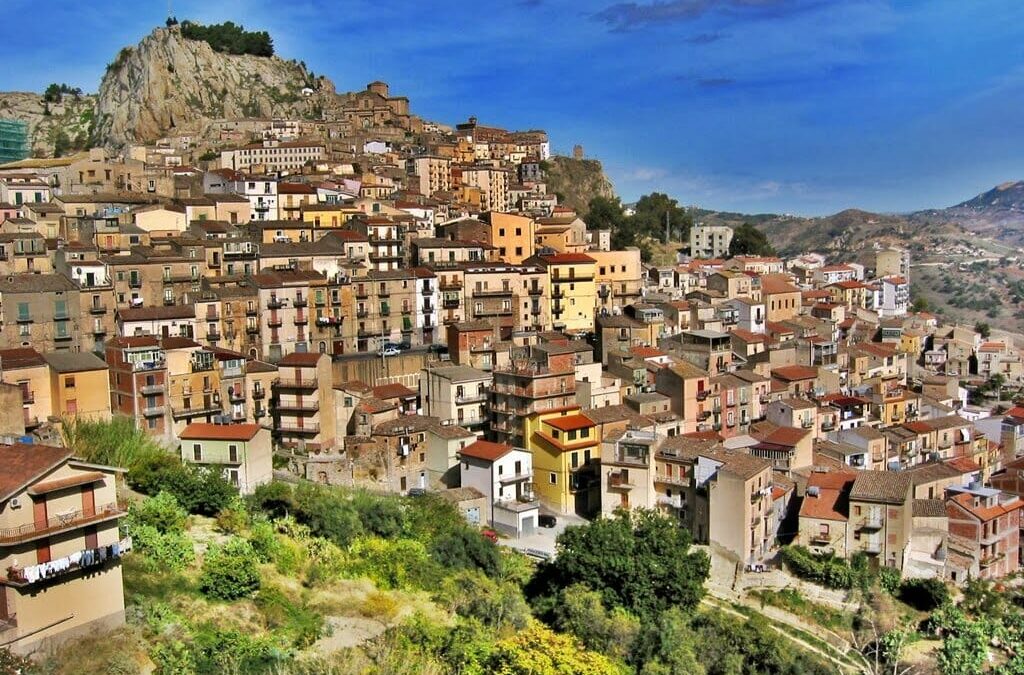
Oct 24, 2015 | Non categorizzato
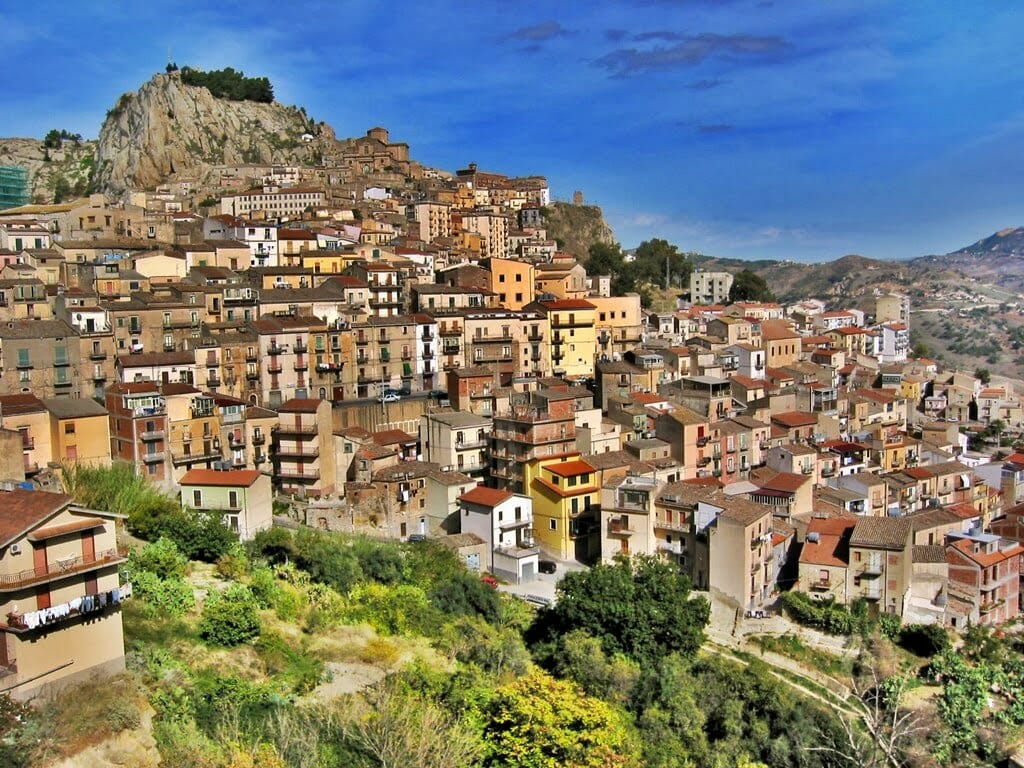 “I live in Nicosia and was born and grew up in an Orthodox family that was Christian in name only. There was no depth, no relationship with Jesus. Indeed, God was the ally of my parents, and they seemed to have a monopoly on Him when they wanted us to obey them. When I finished high school, I received a scholarship to study orthodontics in Hungary. It was difficult for me to get used to the new sitaution. For the first time I was far from my family, living with people I didn’t know. Back then, we were far from the multicultural spirit that prevails today. I was filled with prejudices, with an attitude of rejection. During that year I encountered many disappointments, also from my friends. Meanwhile, the deep search for a more authentic life had begun in me. At the new college I met a Hungarian girl. I had been struck by her cheerfulness and also the way she accepted others. She even offered to help me learn Hungarian. Disappointed by my previous experience with friends, her way of acting made me wonder: ‘Is she sincere, or only kidding?’ But . . . I began to trust her. We shared joys, sorrows, failures and also material things. When she went home to her family on the weekends, around 50 km from Budapest, she took me along so that I wouldn’t be missing my own family. Her family were farmers, very loving, warm and hospitable. But there was one question: Every day at the same hour, and one evening every week she would disappear without explanation. All I knew was that she was with other friends. It turns out that she was with several young women who belonged to the growing Focolare community in Hungary. Back then – when were under the Socialist Regime – anyone discovered belonging to a religious movement was persecuted with serious consequences, such as loss of one’s job, or place at university. One day she felt comfortable enough to confide in me. She told me how she had come to know the Focolare Movement. A priest from her village had recounted to her the story of Chiara Lubich, a young woman like us, of our same age, and how she had been struck by the fact that during the Second World War, Chiara saw everything crumbling around her and the only ideal that didn’t crumble under the bombs was God. She wanted God to be her ideal in life, and to live according to His will. She explained to me that she and those young women she met with were trying to do the same thing. They placed God first in their life, living the Word of Life each day, a sentence taken from the Gospel with an explanation by Chiara. Then they recounted their daily experiences to each other, as a gift for each other. Everything she told me touched me so deeply, I began reading the New Testament, which I had never done before, and this was a decisive moment for my future. Life began to change. All the people I met each day, I could no longer ignore them, nor judge them, nor undervalue them, because now a new mentality had been born in me: we’re all children of One Father and therefore brothers and sisters to each other. Every person is a candidate for the unity that Jesus asked of His Father: that all may be one: the good, the bad, the ugly, the unlikeable, the big and the small. . . The theology of the Fathers had been awakened in me, especically that saying of Saint John Chrysostom: ‘I see my brother, I see my God’. The walls of prejudice that I built up within me, began to crumble. I realised that the Gospel was not only something to be read out in church and that was it; rather, it could bring about a revolution if we took it seriously and translated it into daily life: at the university, at the factory, at the hospital, in the family! Amidst all of this enthusiasm and joy that was filling my life, there was one great sorrow: The other girls were all Catholics, and I was the only Orthodox. They attended Mass every day. I strongly desired to be with them in those moments, but they suggested that I look for my Orthodox Church in Budapest so that I could attend the Liturgy and receive the Eucharist. This separation was painful, but Chiara had invited the members of the Movement belonging to other Christian Churches, to love their Churches, just as she had loved hers. This explanation gave me peace and, once again, it confirmed in me the wisdom, love and descretion that Chiara possessed in front of the believers of different Churches. It could not have been anything but the fruit of God’s intervention in our times. I found the Orthodox parish and got to know it more. I went every Sunday and, with the permission of the priest was able to receive Holy Communion any time there was a Divine Liturgy. They never left me alone in this new initiative. The other young Catholic women often attended the Liturgy with me. The liturgical and sacramental life was no longer something formal or external, but a relationship that was building with Jesus, the activation of God’s grace in my heart that helped in the daily struggles and increased the fruits of love, joy and peace within me.” At Istanbul, March 14, 2015, on the occasion of the publication of the Greek editions of Chiara Lubich’s writings.
“I live in Nicosia and was born and grew up in an Orthodox family that was Christian in name only. There was no depth, no relationship with Jesus. Indeed, God was the ally of my parents, and they seemed to have a monopoly on Him when they wanted us to obey them. When I finished high school, I received a scholarship to study orthodontics in Hungary. It was difficult for me to get used to the new sitaution. For the first time I was far from my family, living with people I didn’t know. Back then, we were far from the multicultural spirit that prevails today. I was filled with prejudices, with an attitude of rejection. During that year I encountered many disappointments, also from my friends. Meanwhile, the deep search for a more authentic life had begun in me. At the new college I met a Hungarian girl. I had been struck by her cheerfulness and also the way she accepted others. She even offered to help me learn Hungarian. Disappointed by my previous experience with friends, her way of acting made me wonder: ‘Is she sincere, or only kidding?’ But . . . I began to trust her. We shared joys, sorrows, failures and also material things. When she went home to her family on the weekends, around 50 km from Budapest, she took me along so that I wouldn’t be missing my own family. Her family were farmers, very loving, warm and hospitable. But there was one question: Every day at the same hour, and one evening every week she would disappear without explanation. All I knew was that she was with other friends. It turns out that she was with several young women who belonged to the growing Focolare community in Hungary. Back then – when were under the Socialist Regime – anyone discovered belonging to a religious movement was persecuted with serious consequences, such as loss of one’s job, or place at university. One day she felt comfortable enough to confide in me. She told me how she had come to know the Focolare Movement. A priest from her village had recounted to her the story of Chiara Lubich, a young woman like us, of our same age, and how she had been struck by the fact that during the Second World War, Chiara saw everything crumbling around her and the only ideal that didn’t crumble under the bombs was God. She wanted God to be her ideal in life, and to live according to His will. She explained to me that she and those young women she met with were trying to do the same thing. They placed God first in their life, living the Word of Life each day, a sentence taken from the Gospel with an explanation by Chiara. Then they recounted their daily experiences to each other, as a gift for each other. Everything she told me touched me so deeply, I began reading the New Testament, which I had never done before, and this was a decisive moment for my future. Life began to change. All the people I met each day, I could no longer ignore them, nor judge them, nor undervalue them, because now a new mentality had been born in me: we’re all children of One Father and therefore brothers and sisters to each other. Every person is a candidate for the unity that Jesus asked of His Father: that all may be one: the good, the bad, the ugly, the unlikeable, the big and the small. . . The theology of the Fathers had been awakened in me, especically that saying of Saint John Chrysostom: ‘I see my brother, I see my God’. The walls of prejudice that I built up within me, began to crumble. I realised that the Gospel was not only something to be read out in church and that was it; rather, it could bring about a revolution if we took it seriously and translated it into daily life: at the university, at the factory, at the hospital, in the family! Amidst all of this enthusiasm and joy that was filling my life, there was one great sorrow: The other girls were all Catholics, and I was the only Orthodox. They attended Mass every day. I strongly desired to be with them in those moments, but they suggested that I look for my Orthodox Church in Budapest so that I could attend the Liturgy and receive the Eucharist. This separation was painful, but Chiara had invited the members of the Movement belonging to other Christian Churches, to love their Churches, just as she had loved hers. This explanation gave me peace and, once again, it confirmed in me the wisdom, love and descretion that Chiara possessed in front of the believers of different Churches. It could not have been anything but the fruit of God’s intervention in our times. I found the Orthodox parish and got to know it more. I went every Sunday and, with the permission of the priest was able to receive Holy Communion any time there was a Divine Liturgy. They never left me alone in this new initiative. The other young Catholic women often attended the Liturgy with me. The liturgical and sacramental life was no longer something formal or external, but a relationship that was building with Jesus, the activation of God’s grace in my heart that helped in the daily struggles and increased the fruits of love, joy and peace within me.” At Istanbul, March 14, 2015, on the occasion of the publication of the Greek editions of Chiara Lubich’s writings.
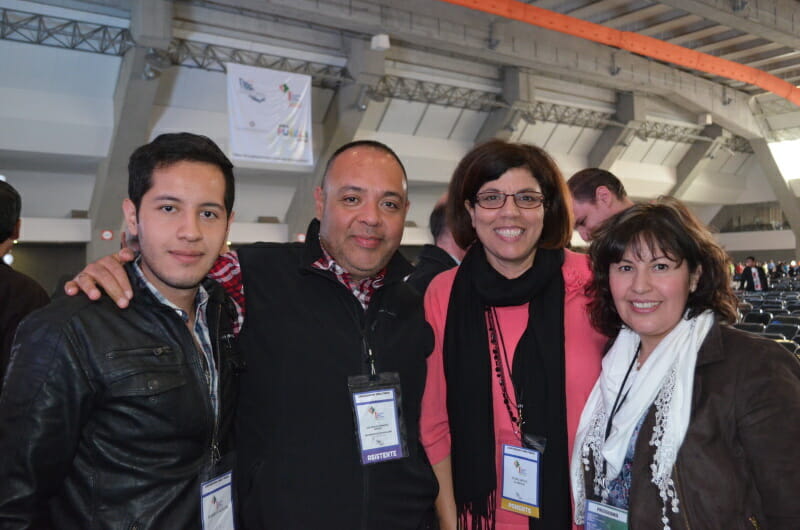
Oct 23, 2015 | Non categorizzato
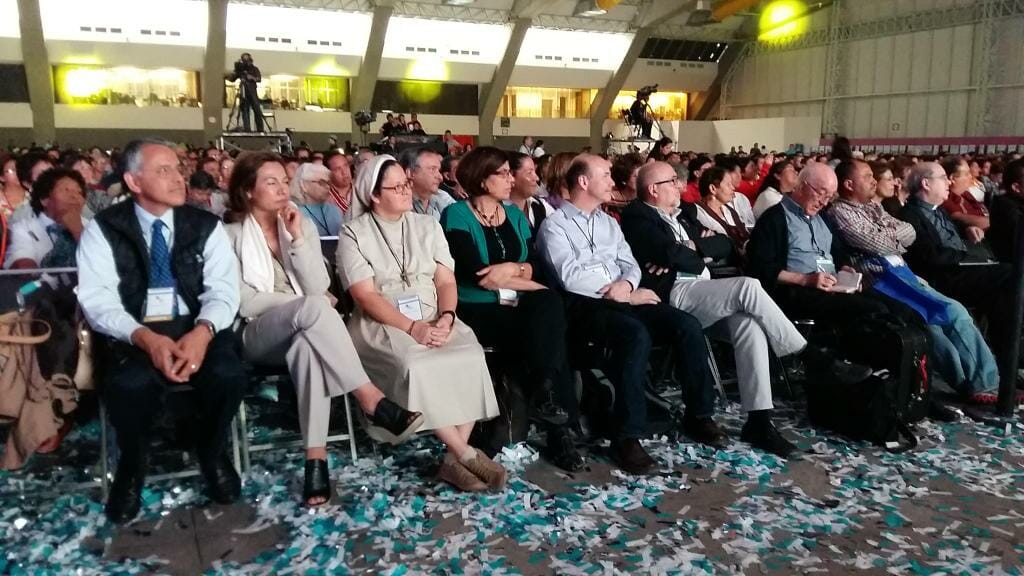 “It’s a historic event”; “There’s no turning back”; “Only through our communion will we solve the problems of Mexico.” These were some of the phrases that were joyfully echoing in the corridors of the Centro Expositor, an avant-garde but functional structure that adds to the already rich architectural patrimony of the city of Puebla. The slogan “Young people, family and life united in the joy of the New Evangelisation” was the backdrop of the three-day conference (October 16-18, 2015). Accompanying the reflections presented at the main assembly, there was also a series of reports and roundtables, with twenty simultaneous focus groups that strengthened awareness in the thousands of participants, of the important social role that comes with being part of a Church movement.
“It’s a historic event”; “There’s no turning back”; “Only through our communion will we solve the problems of Mexico.” These were some of the phrases that were joyfully echoing in the corridors of the Centro Expositor, an avant-garde but functional structure that adds to the already rich architectural patrimony of the city of Puebla. The slogan “Young people, family and life united in the joy of the New Evangelisation” was the backdrop of the three-day conference (October 16-18, 2015). Accompanying the reflections presented at the main assembly, there was also a series of reports and roundtables, with twenty simultaneous focus groups that strengthened awareness in the thousands of participants, of the important social role that comes with being part of a Church movement. 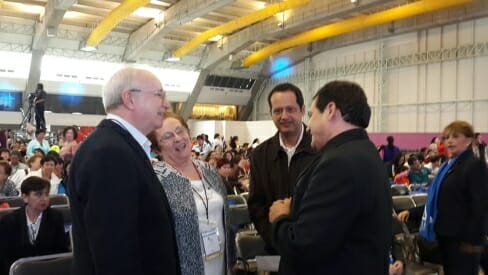 The first report was presented by Anna and Alberto Friso, members of the Pontifical Council for the Family, who examined the challenges to an institution that is more and more under attack due to the influence of individualism , but which remains as a light for society precisely because it is a “little church”. A variety of academics, civil leaders and members of the most prestigious institutions in the country, such as IMDOSOC, Mexicanos Primeros, A favor de lo mejor, México Evalúa and others, offered interesting presentations that helped to understand this North American country from many different angles: politics, mass media, education and social action. Among the testimonies there were also three aritsts of international fame: Liana Rebolledo, Eduardo Verástegui and Emmanuel. A very touching testimony was given by Margaret Karran, an Arab Christian focolarina from Haifa who up to a short time before had lived in the Holy Land in direct contact with the diverse religious expressions that are found there.
The first report was presented by Anna and Alberto Friso, members of the Pontifical Council for the Family, who examined the challenges to an institution that is more and more under attack due to the influence of individualism , but which remains as a light for society precisely because it is a “little church”. A variety of academics, civil leaders and members of the most prestigious institutions in the country, such as IMDOSOC, Mexicanos Primeros, A favor de lo mejor, México Evalúa and others, offered interesting presentations that helped to understand this North American country from many different angles: politics, mass media, education and social action. Among the testimonies there were also three aritsts of international fame: Liana Rebolledo, Eduardo Verástegui and Emmanuel. A very touching testimony was given by Margaret Karran, an Arab Christian focolarina from Haifa who up to a short time before had lived in the Holy Land in direct contact with the diverse religious expressions that are found there.

Margaret Karram (second from right)
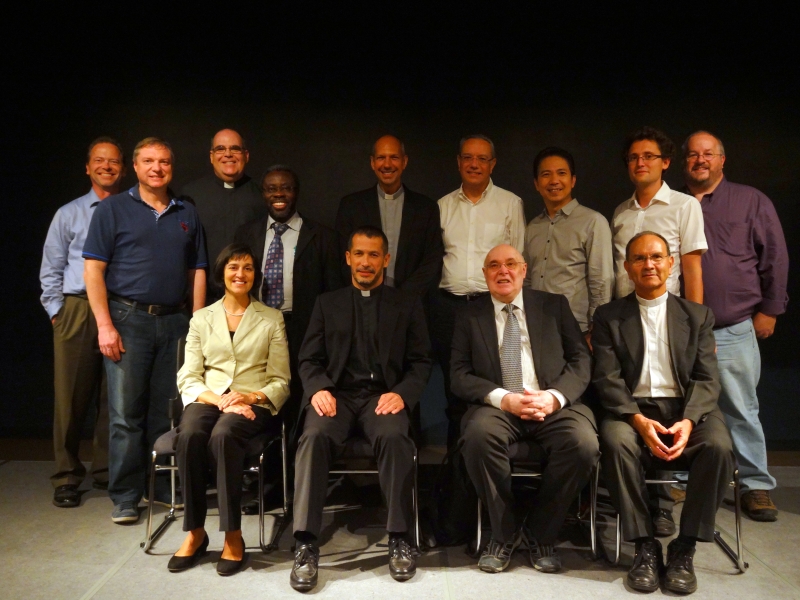
Oct 22, 2015 | Non categorizzato
 “The place of my dreams, ever since I was small, was Canada. I would certainly never have dreamed of actually going there, much less in a town called Saskatoon in the prairies of Saskatchewan. Even more beautiful was the reason that brought me there. I went to take part in the final session of the Consultation between the World Evangelical Alliance (WEA) and the Pontifical Council for Promoting Christian Unity of which I have been a member since 2009. I thought back over some experiences that were undertaken with Lutherans in South Brazil that followed a safe path. But with the first contact, I immediately realised that here it was another reality. I encountered a group of Evangelicals – in some countries they are called ‘Evangelists’, in others ‘Evangelicals’. There was a group of Christians included amongst them from different churches: Lutheran, Reformed, Baptist, Pentecostal, Mennonite and Anglican. They identified with a common missionary project, while living and being Church in very different ways from one another. There were thirteen of us – five Catholics and eight Evangelicals. I was the only lay person, and a woman. They came from Brazil, Canada, Colombia, Philippines, Germany, Guatemala, Italy, Kenya, Spain and the United States. It was an unforgettable week marked by prayer, study, reflection and, at times, heated discussions. The questions we asked helped us to know one another better, especially on a confessional and missionary level: What do we have in common? What still divides us? The diversity I encountered was a valuable enrichment and a serious challenge. Above all, we tried to clarify our positions in order to overcome the conflicts through truthful dialogue in charity. It wasn’t easy, and there wasn’t a lack of problems. We experienced the pain of the divisions. We realised that the road ahead would be long. What to do? Let it go, or carry on? Personally, I discovered that any obstacle can become an opportunity for dialogue and an invitation to have an even greater measure of love. We faced the problems in the light of the Gospel, working like real disciples of Christ. Amongst the Catholics were bishops, priests and laity; and we also came from different countries and backgrounds, different points of view. Yet, together, we managed to have a living experience of full and real communion which we enjoy. This is fraternal communion born over years together, along with the hope that every one of us can contribute something towards the reconciliation between Catholics and Evangelicals in our own country. Now, we are awaiting the publication of the final report of this Consultation. Because of the personal friendship established with them, Pope Francis has triggered a new ‘march’ of this dialogue. Encouraged by him, we would like to promote this experience everywhere, because it is in the local community that we live with one another; it is there that we forgive one another; and it is there that we offer the witness that Jesus asks us for: “By this everyone will know that you are my disciples, if you have love for one another” (Jn 13:35).
“The place of my dreams, ever since I was small, was Canada. I would certainly never have dreamed of actually going there, much less in a town called Saskatoon in the prairies of Saskatchewan. Even more beautiful was the reason that brought me there. I went to take part in the final session of the Consultation between the World Evangelical Alliance (WEA) and the Pontifical Council for Promoting Christian Unity of which I have been a member since 2009. I thought back over some experiences that were undertaken with Lutherans in South Brazil that followed a safe path. But with the first contact, I immediately realised that here it was another reality. I encountered a group of Evangelicals – in some countries they are called ‘Evangelists’, in others ‘Evangelicals’. There was a group of Christians included amongst them from different churches: Lutheran, Reformed, Baptist, Pentecostal, Mennonite and Anglican. They identified with a common missionary project, while living and being Church in very different ways from one another. There were thirteen of us – five Catholics and eight Evangelicals. I was the only lay person, and a woman. They came from Brazil, Canada, Colombia, Philippines, Germany, Guatemala, Italy, Kenya, Spain and the United States. It was an unforgettable week marked by prayer, study, reflection and, at times, heated discussions. The questions we asked helped us to know one another better, especially on a confessional and missionary level: What do we have in common? What still divides us? The diversity I encountered was a valuable enrichment and a serious challenge. Above all, we tried to clarify our positions in order to overcome the conflicts through truthful dialogue in charity. It wasn’t easy, and there wasn’t a lack of problems. We experienced the pain of the divisions. We realised that the road ahead would be long. What to do? Let it go, or carry on? Personally, I discovered that any obstacle can become an opportunity for dialogue and an invitation to have an even greater measure of love. We faced the problems in the light of the Gospel, working like real disciples of Christ. Amongst the Catholics were bishops, priests and laity; and we also came from different countries and backgrounds, different points of view. Yet, together, we managed to have a living experience of full and real communion which we enjoy. This is fraternal communion born over years together, along with the hope that every one of us can contribute something towards the reconciliation between Catholics and Evangelicals in our own country. Now, we are awaiting the publication of the final report of this Consultation. Because of the personal friendship established with them, Pope Francis has triggered a new ‘march’ of this dialogue. Encouraged by him, we would like to promote this experience everywhere, because it is in the local community that we live with one another; it is there that we forgive one another; and it is there that we offer the witness that Jesus asks us for: “By this everyone will know that you are my disciples, if you have love for one another” (Jn 13:35).
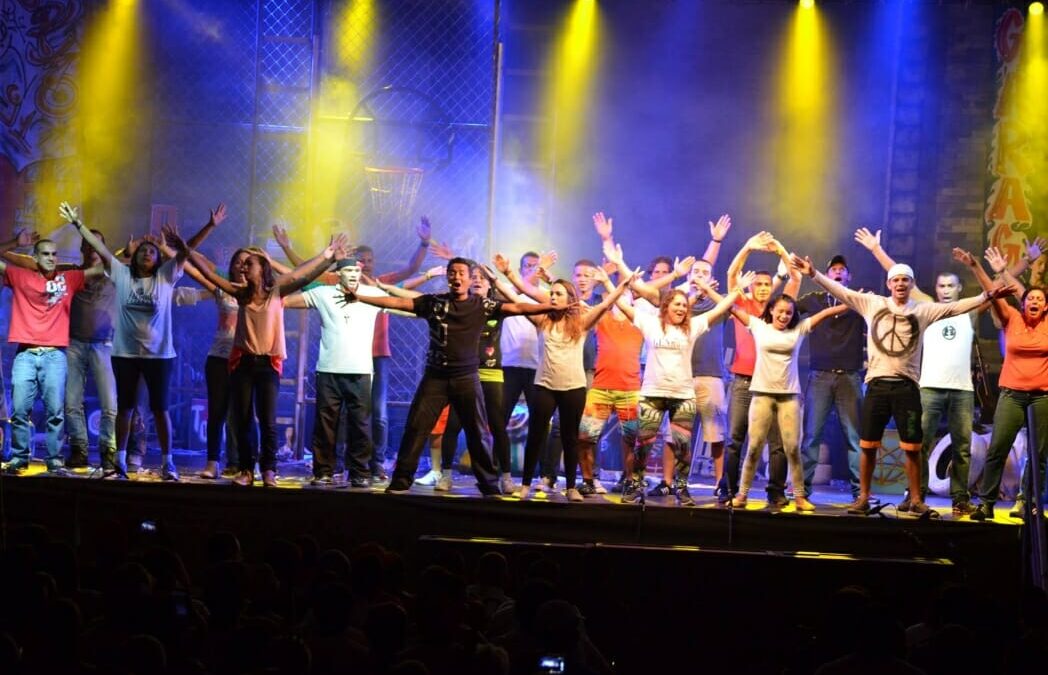
Oct 21, 2015 | Non categorizzato
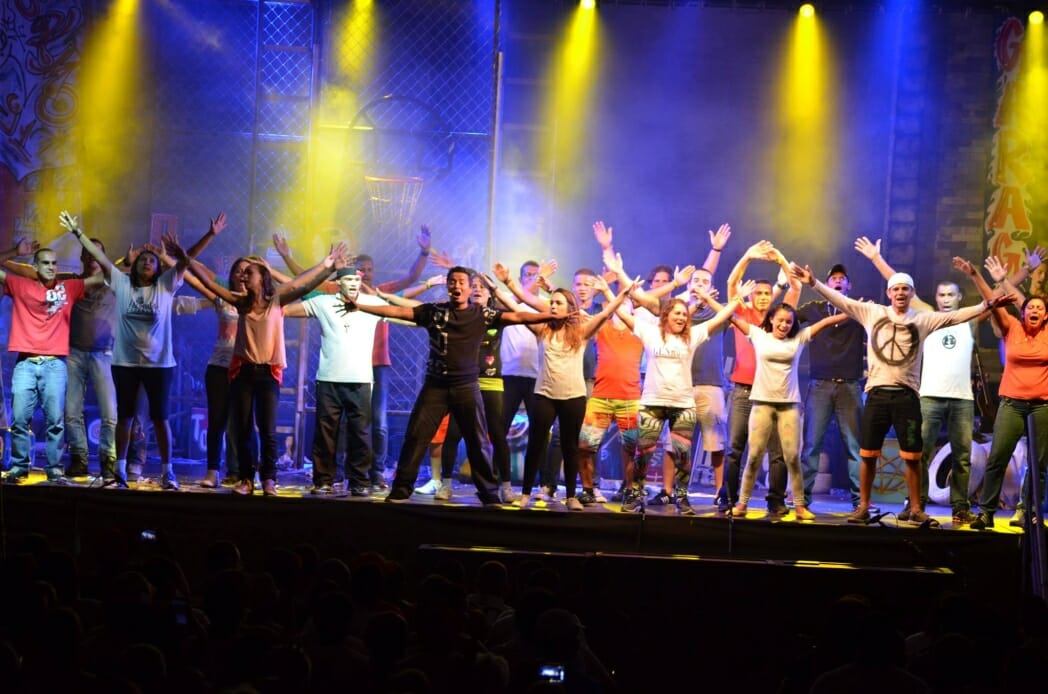 These are the figures of Gen Rosso’s tour in Brazil: the band that resides in Loppiano has undertaken seven projects – one for every city – in collaboration with Fazenda da Esperança – a community founded in 1983 by Frei Hans, Nelson, Lucy and Iraçi – and the prefecture of Guarapuava. The first city to host the band was Palmas, in the state of Tocantins where the Fazenda da Esperança hosts 25 youths under rehab programmes from drugs, alcohol and violence, and who will work with Gen Rosso – together with other youths of other 4 Fazende in neighbouring cities – and take part of an intense workshop through which they will not only stage their musical Streetlight, but also undertake a spiritual journey of communion. Also 170 youths of the Focolare Movement of various parishes and diocesan movements will participate in the nine artistic workshops. The two evening shows resulting from the workshops attracted an audience of 2,300 people, as well as the national TV Globo channel, other media and the local civil and religious authorities. Also the second third stopover in Caxias and Manaus, in the states of Maranhão and the Amazon, followed the same pattern: the spirit of the tour is to involve the youth, especially those with difficult backgrounds and vicissitudes, within a programme of education towards peace and a different lifestyle transmitted through music, dance and mutual sharing. There were numerous touching testimonials in this sense: «I have lived for two years in the square of the theatre, sleeping on that bench in front, and ate what I found in the trashcans… I never thought that I would one day see what was behind those doors, and even go onstage to express my wish for redemption and a new life,» a boy from Manaus said. «I was familiar with the backstage door. I would enter to steal and when it was closed, it was the corner where I would assume drugs . And now, here I am, trying to give the best of myself: life is marvelous!» another boy relayed. Also the audience wrote very meaningful impressions – the final celebrations in Manaus saw the participation of 6,000 people – among these, the Bishop of Caxias, who underlined how «this type of evangelisation goes directly to the hearts of the youth, and from the stage reaches out to the public in an unmistakable and exciting way, » and various journalists gave ample reportages and footage in their various newspapers and TV channels. The tour is under way and will bring the band to Garanhuns (Pernambuco), Casca (Rio Grande do Sul), Guaratinguetá (San Paolo)
These are the figures of Gen Rosso’s tour in Brazil: the band that resides in Loppiano has undertaken seven projects – one for every city – in collaboration with Fazenda da Esperança – a community founded in 1983 by Frei Hans, Nelson, Lucy and Iraçi – and the prefecture of Guarapuava. The first city to host the band was Palmas, in the state of Tocantins where the Fazenda da Esperança hosts 25 youths under rehab programmes from drugs, alcohol and violence, and who will work with Gen Rosso – together with other youths of other 4 Fazende in neighbouring cities – and take part of an intense workshop through which they will not only stage their musical Streetlight, but also undertake a spiritual journey of communion. Also 170 youths of the Focolare Movement of various parishes and diocesan movements will participate in the nine artistic workshops. The two evening shows resulting from the workshops attracted an audience of 2,300 people, as well as the national TV Globo channel, other media and the local civil and religious authorities. Also the second third stopover in Caxias and Manaus, in the states of Maranhão and the Amazon, followed the same pattern: the spirit of the tour is to involve the youth, especially those with difficult backgrounds and vicissitudes, within a programme of education towards peace and a different lifestyle transmitted through music, dance and mutual sharing. There were numerous touching testimonials in this sense: «I have lived for two years in the square of the theatre, sleeping on that bench in front, and ate what I found in the trashcans… I never thought that I would one day see what was behind those doors, and even go onstage to express my wish for redemption and a new life,» a boy from Manaus said. «I was familiar with the backstage door. I would enter to steal and when it was closed, it was the corner where I would assume drugs . And now, here I am, trying to give the best of myself: life is marvelous!» another boy relayed. Also the audience wrote very meaningful impressions – the final celebrations in Manaus saw the participation of 6,000 people – among these, the Bishop of Caxias, who underlined how «this type of evangelisation goes directly to the hearts of the youth, and from the stage reaches out to the public in an unmistakable and exciting way, » and various journalists gave ample reportages and footage in their various newspapers and TV channels. The tour is under way and will bring the band to Garanhuns (Pernambuco), Casca (Rio Grande do Sul), Guaratinguetá (San Paolo)
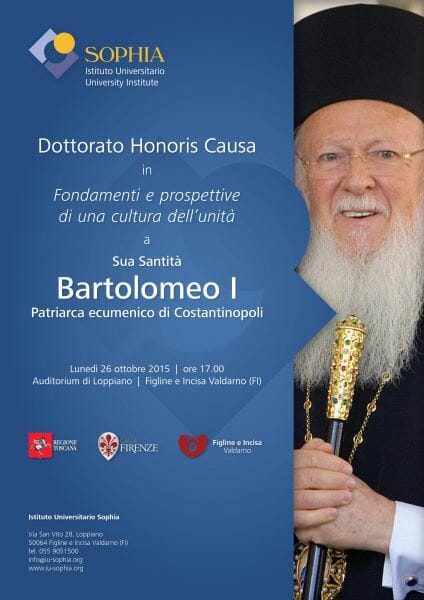
Oct 20, 2015 | Non categorizzato
 On October 26, 2015, at 5.00 pm
His Holiness Bartholomew I, Ecumenical Patriarch of Constantinople will be receiving the first honory doctoral degree in the culture of unity conferred by the Sophia University Institute, situated in Loppiano (Florence) and founded by Chiara Lubich to deal competently and effectively with the cultural transition taking place. The ceremony will be held on October 26 at 17.00 hrs at the Auditorium of the international Centre of the Focolare.The Patriarch, a pioneer in ecumenical dialogue and a peacemaker, is a point of reference in the complex contemporary scene. During some recent important historical events, he stood out for his leading role in promoting unity on several fronts. On May 25, 2014, at the end of the pilgrimage to Jerusalem, he joined Pope Francis in signing a declaration to confirm their respective churches’ commitment “towards unity for which Christ, our Lord prayed to the Father so ‘that all may be one’”. On June 8, 2014 he was at the Vatican together with President Mahmoud Abbas and President Shimon Peres to pray with the Pope for peace in the Holy Land. Bartholomew I is known for his spiritual environmental leadership.His teachings on the environment have been widely quoted by Pope Francis in his encyclical “Laudato si”. The Patriarch has been invited to address the assembly during the ecumenical service at Notre Dame Cathedral on December 3, at the time when the United Nations Climate Change Conference will be taking place in Paris.
The theologian Piero Coda, President of the University Institute said: “Today, the world needs people who seek the unity of the human family, and the Patriarch is constantly rendering a valuable service towards a culture that aims at placing fraternity at the heart of human history”. The recommendation specifies that: “The Ecumenical Patriarch of Constantinople is accredited for his active leading role in the ecumenical journey towards full Christian unity and in the dialogue with people of different beliefs and religions. He distinguishes himself for promoting justice, peace and protection of the environment, in conformity with the vision on humanity, history and the universe, that comes from the treasured spiritual and theological Eastern Orthodox Christian tradition”.
The Ecumenical Patriarch of Constantinople and the Focolare Movement – It all began with a meeting between Patriarch Athenagoras I and Chiara Lubich. “It was June 13, 1967”‐Lubich related‐ “The Patriarch welcomed me as if he had always known me and he asked me about the Movement’s contacts with the Lutherans and the Anglicans”. Between 1967 and 1972, Athenagoras met the founder of the Focolare Movement 23 times, and thus she became the messenger between Pope Paul VI and the Patriarch. This relationship continued with his successor, Demetrio I. Contacts with the current Ecumenical Patriarch Bartholomew I continue in the same spirit of spiritual friendship. His Holiness Bartholomew I, who visited Chiara Lubich at the Gemelli hospital a few days before her passing away on March 14, 2008 said: “I wanted to come here to give my personal greetings and those of the Ecumenical Patriarchate of Constantinople to dearest Chiara, who, through her life, has given and gives so much to the Church.I gave her my blessing with gratitude. I am happy to have met her.” Two years later, when he welcomed Maria Voce, the newly elected president of the Focolare Movement at the Phanar, he said “ I thank God for your friendship, your visit, the fruits of your Movement, and for the continuation of this work of God that gives glory to His name”.
This event takes place when Loppiano celebrates the first 50 years of its foundation, and it continues to strengthen the relationship of esteem and collaboration between the Patriarchate of Constantinople and the Focolare Movement.
On October 26, 2015, at 5.00 pm
His Holiness Bartholomew I, Ecumenical Patriarch of Constantinople will be receiving the first honory doctoral degree in the culture of unity conferred by the Sophia University Institute, situated in Loppiano (Florence) and founded by Chiara Lubich to deal competently and effectively with the cultural transition taking place. The ceremony will be held on October 26 at 17.00 hrs at the Auditorium of the international Centre of the Focolare.The Patriarch, a pioneer in ecumenical dialogue and a peacemaker, is a point of reference in the complex contemporary scene. During some recent important historical events, he stood out for his leading role in promoting unity on several fronts. On May 25, 2014, at the end of the pilgrimage to Jerusalem, he joined Pope Francis in signing a declaration to confirm their respective churches’ commitment “towards unity for which Christ, our Lord prayed to the Father so ‘that all may be one’”. On June 8, 2014 he was at the Vatican together with President Mahmoud Abbas and President Shimon Peres to pray with the Pope for peace in the Holy Land. Bartholomew I is known for his spiritual environmental leadership.His teachings on the environment have been widely quoted by Pope Francis in his encyclical “Laudato si”. The Patriarch has been invited to address the assembly during the ecumenical service at Notre Dame Cathedral on December 3, at the time when the United Nations Climate Change Conference will be taking place in Paris.
The theologian Piero Coda, President of the University Institute said: “Today, the world needs people who seek the unity of the human family, and the Patriarch is constantly rendering a valuable service towards a culture that aims at placing fraternity at the heart of human history”. The recommendation specifies that: “The Ecumenical Patriarch of Constantinople is accredited for his active leading role in the ecumenical journey towards full Christian unity and in the dialogue with people of different beliefs and religions. He distinguishes himself for promoting justice, peace and protection of the environment, in conformity with the vision on humanity, history and the universe, that comes from the treasured spiritual and theological Eastern Orthodox Christian tradition”.
The Ecumenical Patriarch of Constantinople and the Focolare Movement – It all began with a meeting between Patriarch Athenagoras I and Chiara Lubich. “It was June 13, 1967”‐Lubich related‐ “The Patriarch welcomed me as if he had always known me and he asked me about the Movement’s contacts with the Lutherans and the Anglicans”. Between 1967 and 1972, Athenagoras met the founder of the Focolare Movement 23 times, and thus she became the messenger between Pope Paul VI and the Patriarch. This relationship continued with his successor, Demetrio I. Contacts with the current Ecumenical Patriarch Bartholomew I continue in the same spirit of spiritual friendship. His Holiness Bartholomew I, who visited Chiara Lubich at the Gemelli hospital a few days before her passing away on March 14, 2008 said: “I wanted to come here to give my personal greetings and those of the Ecumenical Patriarchate of Constantinople to dearest Chiara, who, through her life, has given and gives so much to the Church.I gave her my blessing with gratitude. I am happy to have met her.” Two years later, when he welcomed Maria Voce, the newly elected president of the Focolare Movement at the Phanar, he said “ I thank God for your friendship, your visit, the fruits of your Movement, and for the continuation of this work of God that gives glory to His name”.
This event takes place when Loppiano celebrates the first 50 years of its foundation, and it continues to strengthen the relationship of esteem and collaboration between the Patriarchate of Constantinople and the Focolare Movement.
Source: Press Release 19 October 2015 Other material available at Focolare Information Service Bartholomew I – Biographical Profile Sophia University Institute – Dossier “Athenagoras I, Paul VI and Chiara Lubich” – video (available in high definition, please send your request to sif.press@focolare.org) Photo gallery
Oct 20, 2015 | Focolare Worldwide
http://vimeo.com/95726085 Jerusalem, May 24th: the encounter with Pope Francis and Patriarch Bartholomew recalls the historic embrace of 50 years ago between Paul VI and the Ecumenical Patriarch of Constantinople, Athenagoras I, which was the start of a new page in history following centuries of separation. We retrace this unedited page in the history of ecumenical dialogue.
Oct 19, 2015 | Non categorizzato
This is the title that has been chosen for the 9th UNESCO Youth Forum, which preceeds the UNESCO General Conference. Nancy Nanjala (Kenya) and Danilo Gomes (Brazil) will attend the Forum, representing the youth of the New Humanity NGO, which represents the Focolare Movement in international organisations. The event will be held at the UNESCO headquarters in Paris, on October 26–28, 2015.
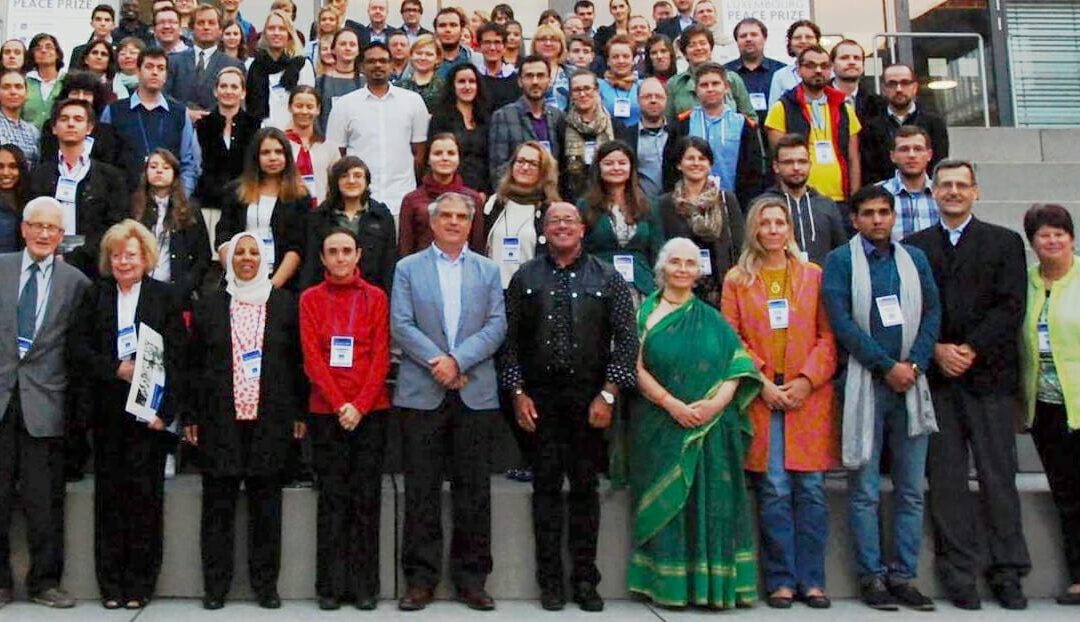
Oct 19, 2015 | Non categorizzato
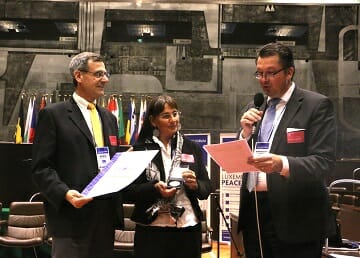 The prize, given by the Schengen Peace Foundation was assigned to New Humanity, an NGO that represents the Focolare Movement among international organisations, during the Youth World Peace Forum that both organisations had collaborated in organising at Rowad American College in Cairo last May, as part of the Living Peace Project that involves more than 80 thousand students and 200 schools around the world in planning and carrying out peace education projects. “After being so struck by the extraordinary volunteer work of so many young members of the Focolare Movement,” writes Dominicus Rhode, president of the forum and of the foundation, “we immediately decided to award the 2015 Luxembourg Peace Prize to New Humanity.” In accepting the award, Marco Desalvo, president of the organisation, remarked: “We are especially pleased because this was the reason for which New Humanity was begun, to contribute to the creation of the unity of the human family, respecting everyone’s identity, and and promoting the spirit of universal brotherhood. This is an award for which we are grateful, but mostly an encouragement to continue on with our work.” While describing the activities of New Humanity in the world’s ‘hot spots’ like Syria and the Middle East, but also in Europe, Desalvo, vice president Cecilia Landucci and Anita Martinez also announced the beginning of a collection of signatures for a petition that would be taken to international leaders and to the United Nations: “In this appeal,” he explained, “we ask all governments to fight extreme poverty with renewed commitment to reducing inequality; to continue in the effort to guarantee a basic education for everyone; to reduce public spending for arms so as to free up resources for development; to take a second look at the current systems of government in terms of a greater democratic control of economic and monetary politics; and to adopt new systems and applications of the laws to fight organised crime.”
The prize, given by the Schengen Peace Foundation was assigned to New Humanity, an NGO that represents the Focolare Movement among international organisations, during the Youth World Peace Forum that both organisations had collaborated in organising at Rowad American College in Cairo last May, as part of the Living Peace Project that involves more than 80 thousand students and 200 schools around the world in planning and carrying out peace education projects. “After being so struck by the extraordinary volunteer work of so many young members of the Focolare Movement,” writes Dominicus Rhode, president of the forum and of the foundation, “we immediately decided to award the 2015 Luxembourg Peace Prize to New Humanity.” In accepting the award, Marco Desalvo, president of the organisation, remarked: “We are especially pleased because this was the reason for which New Humanity was begun, to contribute to the creation of the unity of the human family, respecting everyone’s identity, and and promoting the spirit of universal brotherhood. This is an award for which we are grateful, but mostly an encouragement to continue on with our work.” While describing the activities of New Humanity in the world’s ‘hot spots’ like Syria and the Middle East, but also in Europe, Desalvo, vice president Cecilia Landucci and Anita Martinez also announced the beginning of a collection of signatures for a petition that would be taken to international leaders and to the United Nations: “In this appeal,” he explained, “we ask all governments to fight extreme poverty with renewed commitment to reducing inequality; to continue in the effort to guarantee a basic education for everyone; to reduce public spending for arms so as to free up resources for development; to take a second look at the current systems of government in terms of a greater democratic control of economic and monetary politics; and to adopt new systems and applications of the laws to fight organised crime.” 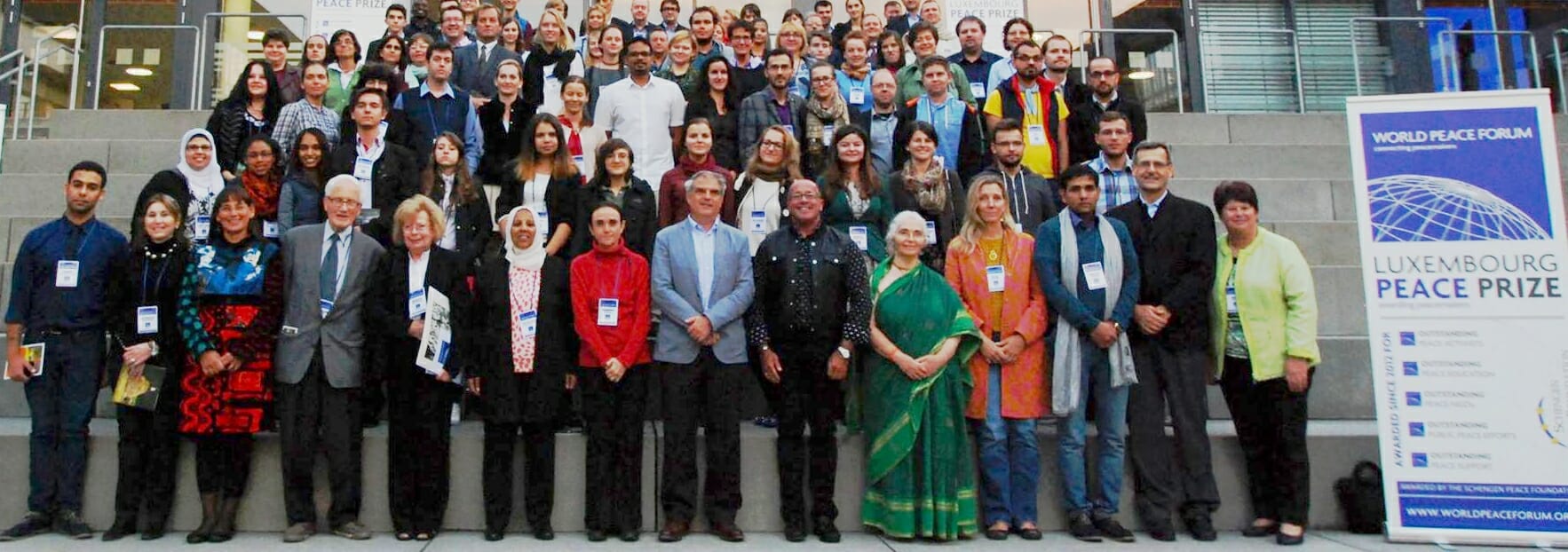 The Youth World Youth Peace Forum, within which the prize was awarded, is a global platform for improving the exchange of best practices amongst associations and individuals active in the area of peace, and joins a large number of professionals from all backgrounds from around the world, who share their hope. Several presentations highlighted ways of coming up with peaceful alternatives to conflicts which have always proven to be more efficacious, at all levels and from every standpoint – rather than war. Testimonies were also given by Syrian refugees and people from other lands, as well as by those who welcomed them in, and of others who are currently giving medical, artistic, and spiritual contributions to peace. The next Forum will be held in Florianopolis, Brazil, in September 2016. Preparations are already underway, but the end goal of all the work involves an ongoing daily commitment and involvement, as was expressed in many of the impressions and testimonies that were shared. One Syrian woman, for example, was asked what she would say to her Focolare friends who stayed behind in Aleppo, Damascus and other places in Syria. She answered: “Life is precious. If they are still in Syria, it is because they have a duty, and a message to bring. Those who cross and leave Syria must continue the work, with the same spirit of the people who could not leave the country. I continually pray to God that He will stop the war and save us from this tragedy, so that all can live in peace.”
The Youth World Youth Peace Forum, within which the prize was awarded, is a global platform for improving the exchange of best practices amongst associations and individuals active in the area of peace, and joins a large number of professionals from all backgrounds from around the world, who share their hope. Several presentations highlighted ways of coming up with peaceful alternatives to conflicts which have always proven to be more efficacious, at all levels and from every standpoint – rather than war. Testimonies were also given by Syrian refugees and people from other lands, as well as by those who welcomed them in, and of others who are currently giving medical, artistic, and spiritual contributions to peace. The next Forum will be held in Florianopolis, Brazil, in September 2016. Preparations are already underway, but the end goal of all the work involves an ongoing daily commitment and involvement, as was expressed in many of the impressions and testimonies that were shared. One Syrian woman, for example, was asked what she would say to her Focolare friends who stayed behind in Aleppo, Damascus and other places in Syria. She answered: “Life is precious. If they are still in Syria, it is because they have a duty, and a message to bring. Those who cross and leave Syria must continue the work, with the same spirit of the people who could not leave the country. I continually pray to God that He will stop the war and save us from this tragedy, so that all can live in peace.”
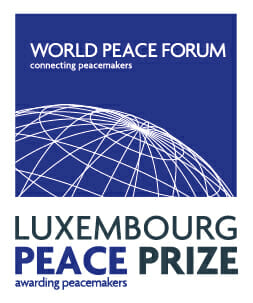
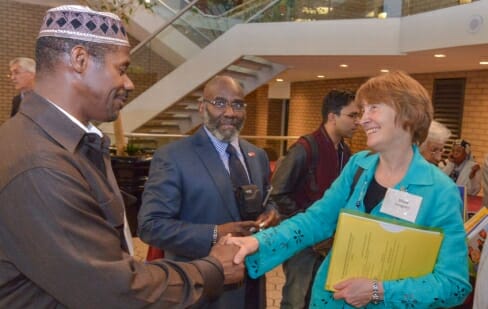
Oct 18, 2015 | Non categorizzato
 “Inculturation of faith is an intrinsic aspect of Christianity. This regards the difficult and complex processes that need time, and in this process the local people themselves are particularly important. By living the Gospel authentically, they who are already deeply rooted in their own cultures will draw forth those adaptations which they will then share with the others, through the customs, artistic expressions and mindsets of their own people. I am totally convinced that the important thing is God himself. This obviously does not mean that one can remain inactive or indifferent. Also we are gathering for example, the African proverbs or those of other peoples, and our publishing house has published books on the great religions. Chiara Lubich established a school for inculturation in Africa , after which she launched another one in Latin America. But whoever thinks that it would suffice to study the various cultures in order to make relate with the Gospel teachings, would be going down the wrong path. We have to bring God. He is the one open and fully ‘involved’ in what He himself created and He will be the one to achieve inculturation. Of course, there are many forms of inculturation and many attempts that should be encouraged and blessed. However, only God can achieve real inculturation. The greatest contribution we can give is love. If each one gives of himself, foregoing one’s own self in the other, and accepting the other in oneself, then the personality of each one will flourish at best and complete the personality of each one. The same would occur among peoples: if each people is able to “lose” its culture out of love, and open out to God in the other, the best of each culture would be “saved” and each would emerge and be enriched not only in the spiritual but also the humane, cultural, and ethnic aspects. Initially, the journey will be slow, but once the road has been paved, it will accelerate and bring enormous results.”
“Inculturation of faith is an intrinsic aspect of Christianity. This regards the difficult and complex processes that need time, and in this process the local people themselves are particularly important. By living the Gospel authentically, they who are already deeply rooted in their own cultures will draw forth those adaptations which they will then share with the others, through the customs, artistic expressions and mindsets of their own people. I am totally convinced that the important thing is God himself. This obviously does not mean that one can remain inactive or indifferent. Also we are gathering for example, the African proverbs or those of other peoples, and our publishing house has published books on the great religions. Chiara Lubich established a school for inculturation in Africa , after which she launched another one in Latin America. But whoever thinks that it would suffice to study the various cultures in order to make relate with the Gospel teachings, would be going down the wrong path. We have to bring God. He is the one open and fully ‘involved’ in what He himself created and He will be the one to achieve inculturation. Of course, there are many forms of inculturation and many attempts that should be encouraged and blessed. However, only God can achieve real inculturation. The greatest contribution we can give is love. If each one gives of himself, foregoing one’s own self in the other, and accepting the other in oneself, then the personality of each one will flourish at best and complete the personality of each one. The same would occur among peoples: if each people is able to “lose” its culture out of love, and open out to God in the other, the best of each culture would be “saved” and each would emerge and be enriched not only in the spiritual but also the humane, cultural, and ethnic aspects. Initially, the journey will be slow, but once the road has been paved, it will accelerate and bring enormous results.”
Pasquale Foresi
Excerpt from:Pasquale Foresi,Colloqui, New City Press 2009, pp.133-136. Collection of conversations with members of the Focolare Movement dated 1990/98
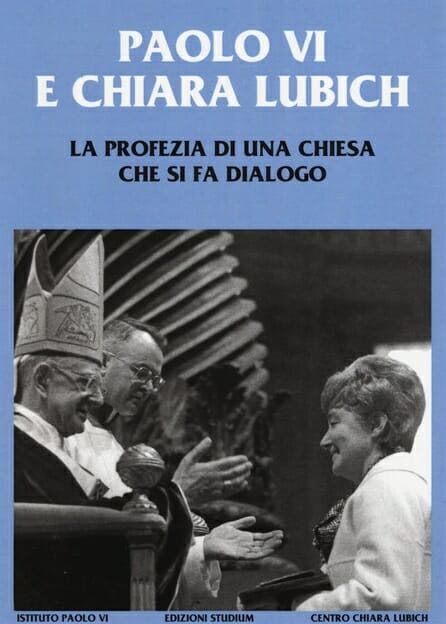
Oct 17, 2015 | Non categorizzato
 «Along the years, there have been studies and in-depth reflections on the Foundress of the Focolare Movement and Paul VI, the “helmsman of Vatican II.” But the time was not ripe for the deepening of the providential weft of relationships established between Giovanni Battista Montini and Chiara Lubich traced precisely to that period. A Pope and a lay woman: what could they have had in common? History never fails to surprise us, and the works carried out by the Paolo VI Institute and the Chiara Lubich Centre resulted in the two study days of 7/8 November 2014, centered on Paul VI, Chiara Lubich and the prophecy of a Church that impersonates dialogue. All these activities have contributed to this long-awaited publication. The book, published in July 2015, traces those events that had revealed under a historical, social, ecclesial, ecumenical and theological profile, the relationship that began in 1952 between Chiara Lubich and Montini, then the special deputy of the Secretary of State, and which continued up to the death of Paul VI in 1978. The path highlighted important moments for both the Church and the Focolare Movement, with the charismatic drive which distinguished it from the very beginning when it made its first steps in the city of Trent. As seen in the studies of the 1950s, the ecclesiastical authorities nurtured strong doubts with regard to the novelty the Movement represented, and the overcoming of this stance towards the start of the 1960s with the first approvals. At this stage, Paul VI played a fundamental role through his personal commitment in the progressive, juridical and institutional configuration of the Movement. Still quite an unknown but a highly interesting topic, it related to the presence of the Focolare in the Eastern European countries from the start of the 1960s, at the height of the Cold War, along with the intensification of contacts in the ecumenical field that came about in the same period. This account is extensively documented by an intense exchange of letters between Chiara and Paul VI, and of what Lubich wrote in her diary after the audiences with Pope Montini. The events also highlighted, alongside these two figures, the role of Igino Giordani. He was a personal friend of Paul VI who, when still a young bishop in Rome, used to frequent his home. In those times Giordani was the Vatican librarian, and future member of the Constituent assembly and Cofounder of the Focolare Movement with Chiara Lubich. Maria Voce, President of the Focolare, stressed that «there is a profound consonance which particularly reveals Pope Paul’s extreme sensitivity and capacity to see in the charism God endowed to Chiara Lubich, the work of the Holy Spirit at the crucial moment of the celebration of the Second Vatican Council that opened out to dialogue beyond frontiers. Upon meeting Chiara, he listened, appreciated, and encouraged. In 1964, struck by the ecumenical feature of the Movement, he exhorted: ”In the same way as you have started a dialogue with the non-Catholic Christians, do the same also with those who do not profess a faith.”» «This was underlined by Don Angelo Maffeis, president of the Paul VI Institute: “the beginnings of this story traces back to long before the Second Vatican Council and deserves to be reconstructed so as to highlight the background of personal contacts and ecclesial experiences that gradually led to the full development of the orientations set by Paul VI in the course of his pontificate.» The other works by Andrea Riccardi, Alberto Monticone, Lucia Abignente, Paolo Siniscalco, Joan Patricia Back, Alberto Lo Presti, Adriana Cosseddu and Piero Coda – have focused under various aspects, «the grandeur of the prophecy of a Church that became the personification of dialogue.» Two charisms met, recognised one another, and worked together to make the Church a “house of communion,” which sets itself in dialogue with the world. The volume on Paul VI and Chiara Lubich, the prophecy of a Church that personifies dialogue, was curated by Paolo Siniscalco and Xenio Toscani, and edited by ‘Studium.’» Caterina Ruggiu
«Along the years, there have been studies and in-depth reflections on the Foundress of the Focolare Movement and Paul VI, the “helmsman of Vatican II.” But the time was not ripe for the deepening of the providential weft of relationships established between Giovanni Battista Montini and Chiara Lubich traced precisely to that period. A Pope and a lay woman: what could they have had in common? History never fails to surprise us, and the works carried out by the Paolo VI Institute and the Chiara Lubich Centre resulted in the two study days of 7/8 November 2014, centered on Paul VI, Chiara Lubich and the prophecy of a Church that impersonates dialogue. All these activities have contributed to this long-awaited publication. The book, published in July 2015, traces those events that had revealed under a historical, social, ecclesial, ecumenical and theological profile, the relationship that began in 1952 between Chiara Lubich and Montini, then the special deputy of the Secretary of State, and which continued up to the death of Paul VI in 1978. The path highlighted important moments for both the Church and the Focolare Movement, with the charismatic drive which distinguished it from the very beginning when it made its first steps in the city of Trent. As seen in the studies of the 1950s, the ecclesiastical authorities nurtured strong doubts with regard to the novelty the Movement represented, and the overcoming of this stance towards the start of the 1960s with the first approvals. At this stage, Paul VI played a fundamental role through his personal commitment in the progressive, juridical and institutional configuration of the Movement. Still quite an unknown but a highly interesting topic, it related to the presence of the Focolare in the Eastern European countries from the start of the 1960s, at the height of the Cold War, along with the intensification of contacts in the ecumenical field that came about in the same period. This account is extensively documented by an intense exchange of letters between Chiara and Paul VI, and of what Lubich wrote in her diary after the audiences with Pope Montini. The events also highlighted, alongside these two figures, the role of Igino Giordani. He was a personal friend of Paul VI who, when still a young bishop in Rome, used to frequent his home. In those times Giordani was the Vatican librarian, and future member of the Constituent assembly and Cofounder of the Focolare Movement with Chiara Lubich. Maria Voce, President of the Focolare, stressed that «there is a profound consonance which particularly reveals Pope Paul’s extreme sensitivity and capacity to see in the charism God endowed to Chiara Lubich, the work of the Holy Spirit at the crucial moment of the celebration of the Second Vatican Council that opened out to dialogue beyond frontiers. Upon meeting Chiara, he listened, appreciated, and encouraged. In 1964, struck by the ecumenical feature of the Movement, he exhorted: ”In the same way as you have started a dialogue with the non-Catholic Christians, do the same also with those who do not profess a faith.”» «This was underlined by Don Angelo Maffeis, president of the Paul VI Institute: “the beginnings of this story traces back to long before the Second Vatican Council and deserves to be reconstructed so as to highlight the background of personal contacts and ecclesial experiences that gradually led to the full development of the orientations set by Paul VI in the course of his pontificate.» The other works by Andrea Riccardi, Alberto Monticone, Lucia Abignente, Paolo Siniscalco, Joan Patricia Back, Alberto Lo Presti, Adriana Cosseddu and Piero Coda – have focused under various aspects, «the grandeur of the prophecy of a Church that became the personification of dialogue.» Two charisms met, recognised one another, and worked together to make the Church a “house of communion,” which sets itself in dialogue with the world. The volume on Paul VI and Chiara Lubich, the prophecy of a Church that personifies dialogue, was curated by Paolo Siniscalco and Xenio Toscani, and edited by ‘Studium.’» Caterina Ruggiu
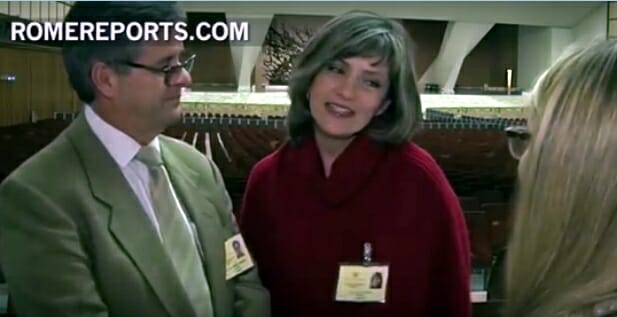
Oct 16, 2015 | Non categorizzato
 They have been married for 23 years and have two teenage sons. Raised in Catholic families, they met in the Focolare Movement to which they still belong. “We had worked in the past with a group of other young people in a marginalised quarter on the periphery of Bogota,” they recounted in their testimony at the Synod assembly. “We played with the children, taught the adults how to read, and offered free medical and dental assistance. They were talking about the Los Chircales quarter where the Centro Sociale Unidad is headquartered: “Obstacles were not lacking,” the Colombian couple who spoke at the Synod the family, said, “beginning from our concern for our personal well-being, and the fear of going into those rundown neighbourhoods and slums. But the desire to serve those brothers and sisters was more powerful than our fragility.”
They have been married for 23 years and have two teenage sons. Raised in Catholic families, they met in the Focolare Movement to which they still belong. “We had worked in the past with a group of other young people in a marginalised quarter on the periphery of Bogota,” they recounted in their testimony at the Synod assembly. “We played with the children, taught the adults how to read, and offered free medical and dental assistance. They were talking about the Los Chircales quarter where the Centro Sociale Unidad is headquartered: “Obstacles were not lacking,” the Colombian couple who spoke at the Synod the family, said, “beginning from our concern for our personal well-being, and the fear of going into those rundown neighbourhoods and slums. But the desire to serve those brothers and sisters was more powerful than our fragility.”  “We married and the grace of the sacrament soon began to manifest itself.” They are very different from one another: Luis, “the calm type”, Maria Angélica “a volcano”. “We knew that human love easily vanishes. The years go by and the initial enchantment diminishes. For this reason it was important for us to bulk up on God’s love, which taught us to love in the small things of everyday life.” Luis admitted: “For me that means not waiting to be waited on, but rather to help out washing the dishes, or to listen more attentively when she wants to tell me something. On her part, M. Angélica watches the Formula 1 with me..” By nourishing ourselves on the Eucharist, approaching the sacrament of Confession and remaining in this relationship of mutual love, we experience that Jesus becomes present in our midst, and then we have the light to raise our sons, and the strength to face the inevitable difficulties that come our way.” “A short time ago we had a rather strong conversation and the unity between us was shattered. That night, we went to bed without apologising to each other” (one of the three things that Pope Francis says should never be done in the life of a couple): “I telephoned Lucho,” M. Angélica recounts, “and told him I was sorry for having answered him so awfully. Then it turned into an opportunity to begin again loving every time we fail.” Together with bishops and priests from several cities in Colombia, and with other families and young people, they organized a series of visits to several poor communities; “The idea was to share our experiences and offer some formation as a family. Some of the couples confided their desire to receive the sacrament of matrimony.”
“We married and the grace of the sacrament soon began to manifest itself.” They are very different from one another: Luis, “the calm type”, Maria Angélica “a volcano”. “We knew that human love easily vanishes. The years go by and the initial enchantment diminishes. For this reason it was important for us to bulk up on God’s love, which taught us to love in the small things of everyday life.” Luis admitted: “For me that means not waiting to be waited on, but rather to help out washing the dishes, or to listen more attentively when she wants to tell me something. On her part, M. Angélica watches the Formula 1 with me..” By nourishing ourselves on the Eucharist, approaching the sacrament of Confession and remaining in this relationship of mutual love, we experience that Jesus becomes present in our midst, and then we have the light to raise our sons, and the strength to face the inevitable difficulties that come our way.” “A short time ago we had a rather strong conversation and the unity between us was shattered. That night, we went to bed without apologising to each other” (one of the three things that Pope Francis says should never be done in the life of a couple): “I telephoned Lucho,” M. Angélica recounts, “and told him I was sorry for having answered him so awfully. Then it turned into an opportunity to begin again loving every time we fail.” Together with bishops and priests from several cities in Colombia, and with other families and young people, they organized a series of visits to several poor communities; “The idea was to share our experiences and offer some formation as a family. Some of the couples confided their desire to receive the sacrament of matrimony.”

Interview with Rome Reports
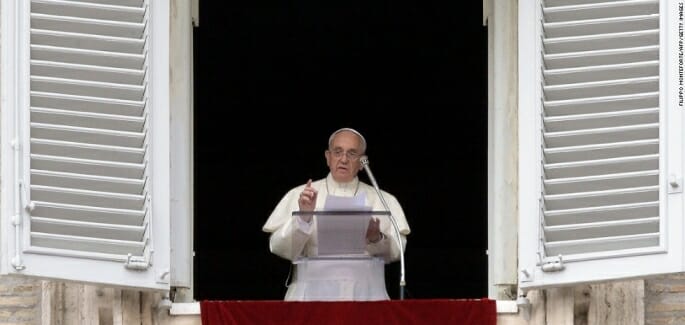
Oct 15, 2015 | Focolare Worldwide
 “We are painfully wounded and follow with deep concern what is taking place in Syria, Iraq, Jerusalem and the West Bank where we are witnessing an escalation in the violence that involves innocent civilians and continues to increase a humanitarian crisis of enormous proportions. War only brings destruction and multiplies the sufferings of entire populations,” stated Pope Francis during the works of the Synod on the Family. “Thank you for your prayers, for this situation we are going through in the Holy Land,” writes the local Focolare Community there. “The hatred leads to violence, and the violence to more hatred . . . a vicious circle is spinning out of control. You can see the situation here transmitted on the media every day. All of us, from both sides, like many other people are deeply saddened and feel helpless in front of this evil. We try to move carefully; we pray more; we try to sow love with a smile or an act of kindness. . .” “We continue to pray and to build peace,” they conclude, “hoping that the longing for reconciliation prevails.”
“We are painfully wounded and follow with deep concern what is taking place in Syria, Iraq, Jerusalem and the West Bank where we are witnessing an escalation in the violence that involves innocent civilians and continues to increase a humanitarian crisis of enormous proportions. War only brings destruction and multiplies the sufferings of entire populations,” stated Pope Francis during the works of the Synod on the Family. “Thank you for your prayers, for this situation we are going through in the Holy Land,” writes the local Focolare Community there. “The hatred leads to violence, and the violence to more hatred . . . a vicious circle is spinning out of control. You can see the situation here transmitted on the media every day. All of us, from both sides, like many other people are deeply saddened and feel helpless in front of this evil. We try to move carefully; we pray more; we try to sow love with a smile or an act of kindness. . .” “We continue to pray and to build peace,” they conclude, “hoping that the longing for reconciliation prevails.”
Oct 15, 2015 | Non categorizzato
https://www.youtube.com/watch?v=om7WN06PMiU
Oct 14, 2015 | Non categorizzato
In 5 September the Gen Rosso International Performing Arts Group started its tour with the Fazenda da Esperança which is celebrating in 6 different cities the definitive approval of the work of Frei Hans, Nelson, Lucy and Iraçi called Familia da Esperança. First stopover: Palmas, at the geographic centre of Brazil, a recently built city and capital of the new state of Tocantins. 9 workshops (stage scenery, theatre, music, hip-hop gang, hip hop combination, Festao, strong moves, percussions and broadway) and 2 concerts with a total of 2,300 people. Also the National network TV Globo, the Director of the TV Anhaguera channel, the Director of the local newspaper, the Prefect, Archbishop and 2 bishops will be present. The second stopover from 14 to 20 September: Caxias in the state of Maranão which is a state with prevalently farming activities. Third stopover in Manaus (21-25 September) and Garanhuns in the State of Pernambuco. In October the group will be in Casca in the State of Rio Grande do Sul, up the 17th after which, in Guaratinguetá in the state of San Paolo and Guarapuava in the State of Paraná. TOUR Programme in Brazil
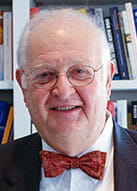
Oct 14, 2015 | Non categorizzato
 The 2015 Nobel Prize awarded to Angus Deaton for his studies on economic development, wellbeing, inequality, consumption choices and the determination of poverty is a very important sign: after years of the financial crisis, Stockholm and its consultants continued to award economists who had studied and promoted economy and finance that contributed to generating the crisis. In this most important seat of contemporary science and social sciences, the awarding of the Nobel Prize to Deaton has returned to promoting the really all-around social scientists of the world, and advocates of a political or civil science which is at the origin of modern economy. Stockholm’s policy has been somewhat bizarre over the last years: from 2010 to 2013, while capitalism was running the risk of an implosion under an unprecedented financial crisis, the Nobel Prizes for Economy were awarded to some economists who were among the major advocates of the economic and financial paradigm that was revealing all its tragic limits. It was almost as if during a summer with the highest number of arson crimes ever, the award was to go to those who studied sophisticated fire-lighting techniques. This is why the Nobel Prize this time, and in some way that of last year assigned to the Frenchman, Jean Tirole, could be a sign of a reverse trend since the award to Deaton closely resembles the awards given to Amartya Sen, Joseph E. Stiglitz, Elinor Ostrom and more recently to Eugene Fama and Lloyd Stowell Shapley. We must not forget that the financial and economic crisis we experienced and are still undergoing, is not independent from the economic theories of the last decade, since unlike the astrophysicists whose theories do not modify the orbit of the planets, economists and their theories strongly impact on economic choices. Over the last years the best of the world’s economic departments were increasingly filled with more mathematicians with increasingly scarce humanistic backgrounds, and experts of hyper-specialised models most of whom were no longer capable of having an overall view of the economic system and thus associate their models with the socio-economic reality. Besides the award to Deaton following that given to Tirole, this could indicate a return to a more European economic theory, which pays greater attention to the social dimension of the profession, and more sensitivity to the themes of collective wellbeing and not only individual profits and turnovers. This probable dawning will, however, reach its peak if the next Nobel prizes highlight more philosopher economists and less mathematician economists, as once described by the British economist, Robert Sugden, in 1991: “The economist today needs to return to being more of a philosopher and less of a mathematician.” It was an invitation which at that time was hardly noticed by professionals of the sector, but we may still be on time to do so. Angus Deaton is furthermore, an economist who not only writes mathematic articles but also books. We recommend his latest work, “The Great Escape: Health, Wealth, and the Origins of Inequality,” in which the new Nobel laureate and authentic social scientist and rightful heir of this co-citizen, Adam Smith (philosopher and economist), asked himself whether humanity will, in the future, enjoy a period of progress without inequality, a fundamental issue today when we are paying the price for progress with growing inequality in the world and a decrease in happiness. Economics could return to being a moral, society-friendly science if it will start again to ask itself questions which were too rapidly abandoned to respond to easier queries, less useful to human progress. Luigino Bruni
The 2015 Nobel Prize awarded to Angus Deaton for his studies on economic development, wellbeing, inequality, consumption choices and the determination of poverty is a very important sign: after years of the financial crisis, Stockholm and its consultants continued to award economists who had studied and promoted economy and finance that contributed to generating the crisis. In this most important seat of contemporary science and social sciences, the awarding of the Nobel Prize to Deaton has returned to promoting the really all-around social scientists of the world, and advocates of a political or civil science which is at the origin of modern economy. Stockholm’s policy has been somewhat bizarre over the last years: from 2010 to 2013, while capitalism was running the risk of an implosion under an unprecedented financial crisis, the Nobel Prizes for Economy were awarded to some economists who were among the major advocates of the economic and financial paradigm that was revealing all its tragic limits. It was almost as if during a summer with the highest number of arson crimes ever, the award was to go to those who studied sophisticated fire-lighting techniques. This is why the Nobel Prize this time, and in some way that of last year assigned to the Frenchman, Jean Tirole, could be a sign of a reverse trend since the award to Deaton closely resembles the awards given to Amartya Sen, Joseph E. Stiglitz, Elinor Ostrom and more recently to Eugene Fama and Lloyd Stowell Shapley. We must not forget that the financial and economic crisis we experienced and are still undergoing, is not independent from the economic theories of the last decade, since unlike the astrophysicists whose theories do not modify the orbit of the planets, economists and their theories strongly impact on economic choices. Over the last years the best of the world’s economic departments were increasingly filled with more mathematicians with increasingly scarce humanistic backgrounds, and experts of hyper-specialised models most of whom were no longer capable of having an overall view of the economic system and thus associate their models with the socio-economic reality. Besides the award to Deaton following that given to Tirole, this could indicate a return to a more European economic theory, which pays greater attention to the social dimension of the profession, and more sensitivity to the themes of collective wellbeing and not only individual profits and turnovers. This probable dawning will, however, reach its peak if the next Nobel prizes highlight more philosopher economists and less mathematician economists, as once described by the British economist, Robert Sugden, in 1991: “The economist today needs to return to being more of a philosopher and less of a mathematician.” It was an invitation which at that time was hardly noticed by professionals of the sector, but we may still be on time to do so. Angus Deaton is furthermore, an economist who not only writes mathematic articles but also books. We recommend his latest work, “The Great Escape: Health, Wealth, and the Origins of Inequality,” in which the new Nobel laureate and authentic social scientist and rightful heir of this co-citizen, Adam Smith (philosopher and economist), asked himself whether humanity will, in the future, enjoy a period of progress without inequality, a fundamental issue today when we are paying the price for progress with growing inequality in the world and a decrease in happiness. Economics could return to being a moral, society-friendly science if it will start again to ask itself questions which were too rapidly abandoned to respond to easier queries, less useful to human progress. Luigino Bruni
Oct 14, 2015 | Non categorizzato
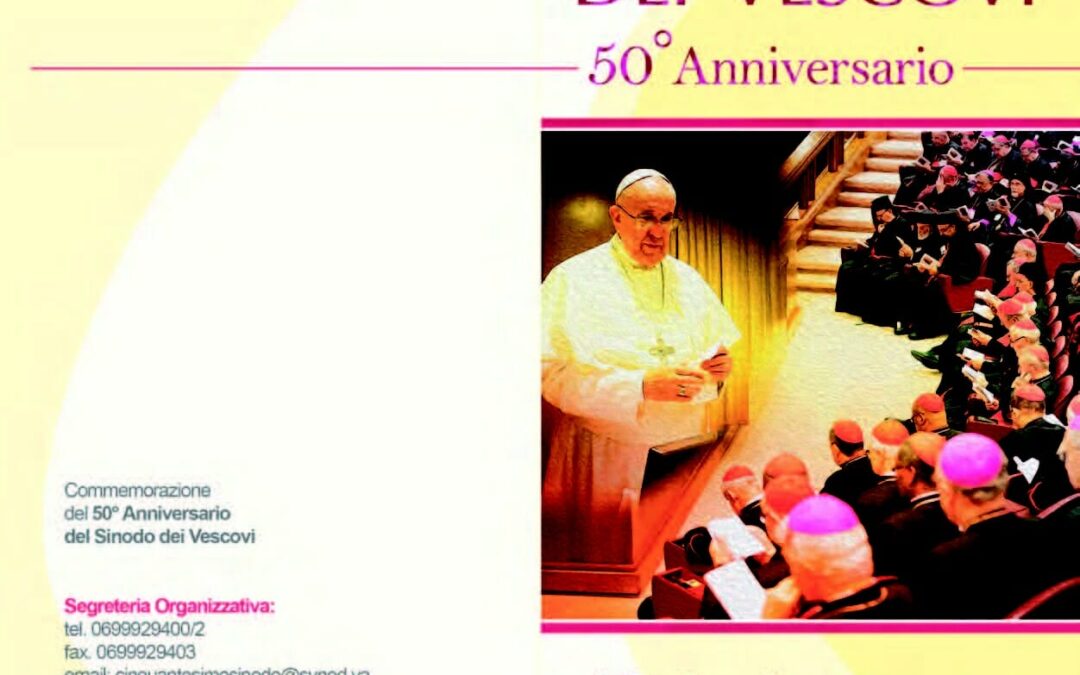
Oct 13, 2015 | Non categorizzato
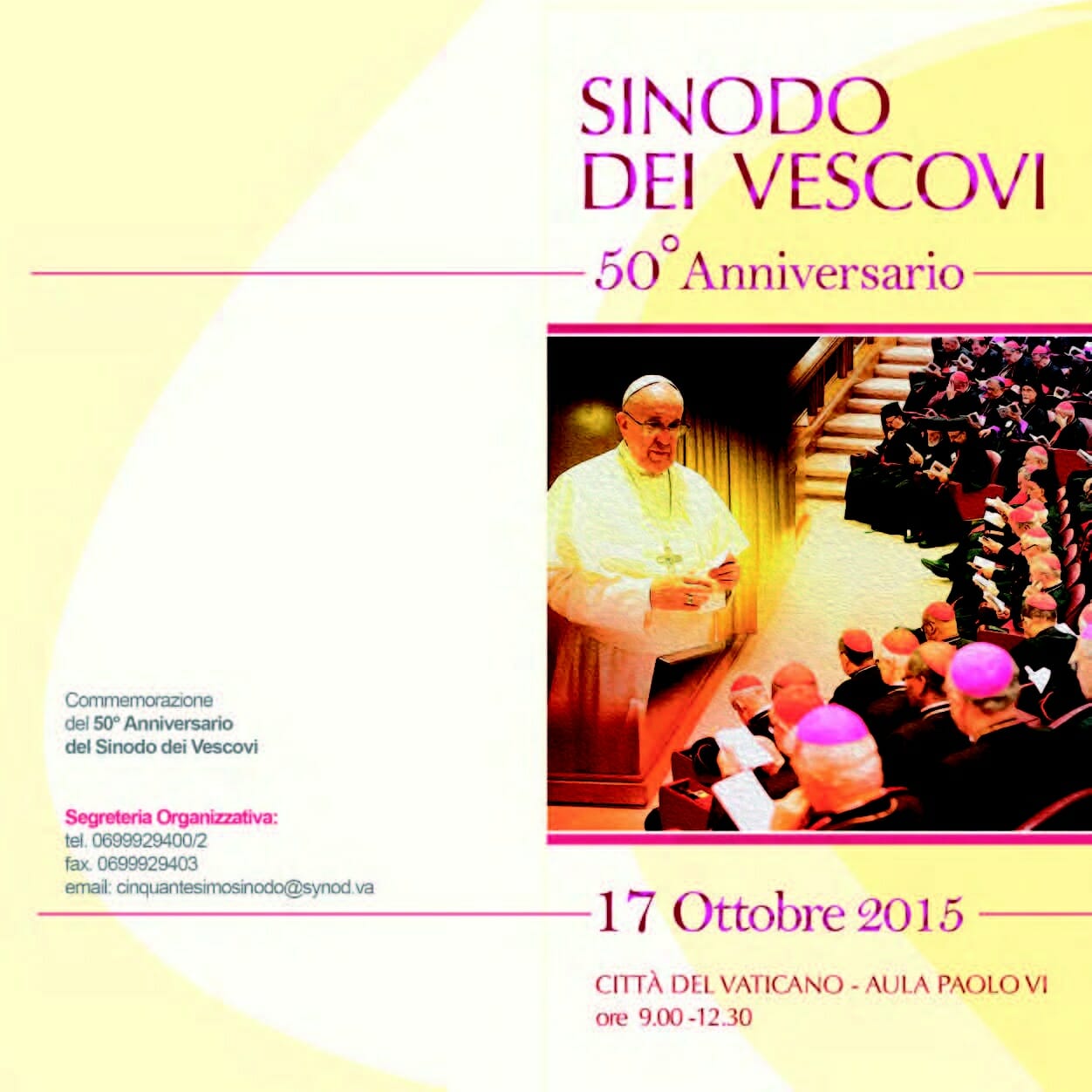 The Synod of Bishops is a permanent institution that was created by Paul VI on September 15, 1965, to keep alive the spirit of collegiality of the Second Vatican Council. This year marks the 50th anniversary of the institution, and the Catholic Church remembers it during the ordinary assembly of the Synod of Bishops, on “the vocation and mission of the family in the Church and in the contemporary world (October 5-25, 2015). On the morning of October 17, in the presence of Pope Francis, interventions will be given by Cardinal Lorenzo Baldisseri, General Secretary of the Synod of Bishops, and Cardinal Christoph Schönborn, President of the Bishops Conference of Austria. This will be followed by messages of bishops from the five continents, and the concluding address by the Holy Father. There is a large delegation from the Focolare amongst the invited guests, including Focolare president Maria Voce who described the Synod of Bishops as “one of the best fruits of the Second Vatican Council for a new sense of collegiality and deeper communion for the further building up of the Universal Church.” Synod comes from the Greek word “syn-hodos” which means “meeting” or “together”. The original meaning of the word, which is to “walk together”, expresses the essence of the Synod: a place for the bishops to encounter one another with the Pope, to share their thoughts and experiences in the common search for pastoral solutions that can be offered to the Church around the world.
The Synod of Bishops is a permanent institution that was created by Paul VI on September 15, 1965, to keep alive the spirit of collegiality of the Second Vatican Council. This year marks the 50th anniversary of the institution, and the Catholic Church remembers it during the ordinary assembly of the Synod of Bishops, on “the vocation and mission of the family in the Church and in the contemporary world (October 5-25, 2015). On the morning of October 17, in the presence of Pope Francis, interventions will be given by Cardinal Lorenzo Baldisseri, General Secretary of the Synod of Bishops, and Cardinal Christoph Schönborn, President of the Bishops Conference of Austria. This will be followed by messages of bishops from the five continents, and the concluding address by the Holy Father. There is a large delegation from the Focolare amongst the invited guests, including Focolare president Maria Voce who described the Synod of Bishops as “one of the best fruits of the Second Vatican Council for a new sense of collegiality and deeper communion for the further building up of the Universal Church.” Synod comes from the Greek word “syn-hodos” which means “meeting” or “together”. The original meaning of the word, which is to “walk together”, expresses the essence of the Synod: a place for the bishops to encounter one another with the Pope, to share their thoughts and experiences in the common search for pastoral solutions that can be offered to the Church around the world.
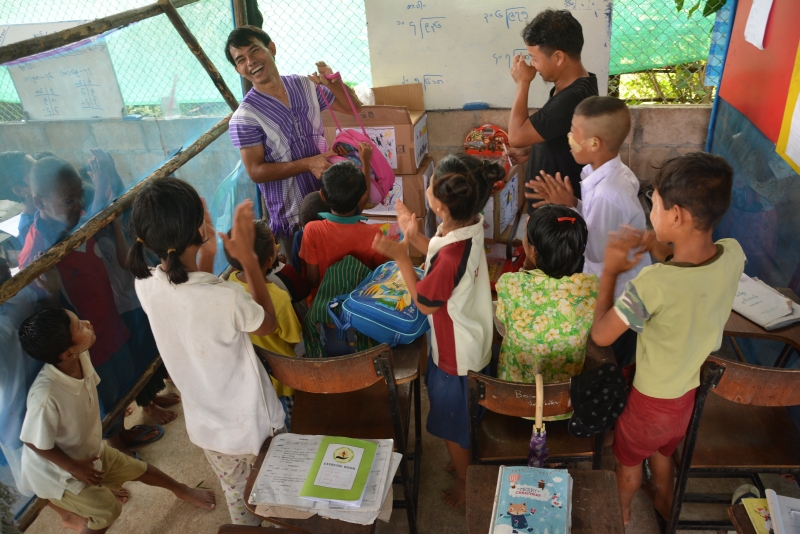
Oct 13, 2015 | Focolare Worldwide
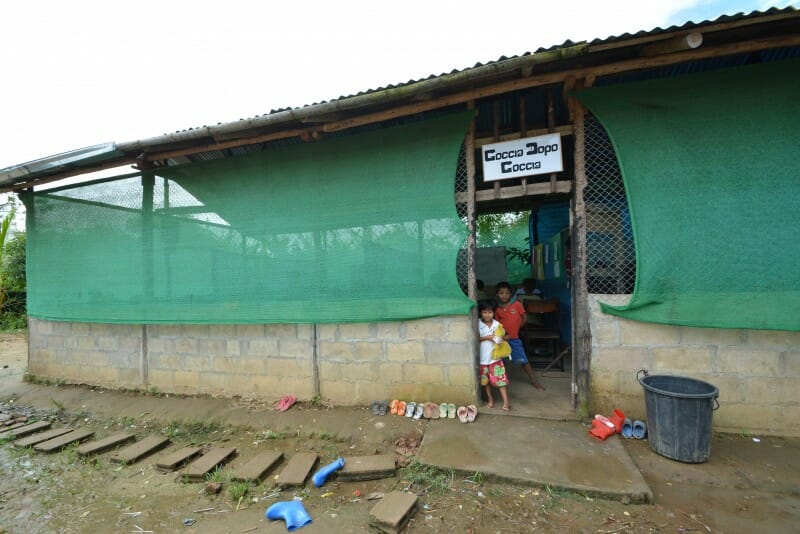 “It’s early morning, following a night of rain on the border between Thailand and Myanmar. Our breakfast consists of a hard-boiled egg and coffee. It’s the beginning of our adventure: four days in Mae Sot with a priest who works for refugees, the least of the least, the ones who don’t get into the official United Nations camps, the ones nobody cares for and who are often unpaid by those for whom they do a week’s work. They’re undocumented and don’ts have the power to protest, because nobody will defend them. Many of them have spent many years in the forests, and finally they can come out. Living amongst the walls and tunnels of factories and makeshift huts, it’s a miracle they’re still alive. Nobody talks about them, and nobody knows about their situation, but everyone knows that they’re worth their weight in gold, a low-cost work force of people ready to work for small salaries, just enough to live on. It’s why Mae-Sot will become such a special economic zone with many industries. We want to be here for at least a few of them. We’ve begun a project that helps the children in a school that didn’t exist too long ago, if not in the dreams of the children of Latina, Italy, and the refugee peers in Mae-Sot.
“It’s early morning, following a night of rain on the border between Thailand and Myanmar. Our breakfast consists of a hard-boiled egg and coffee. It’s the beginning of our adventure: four days in Mae Sot with a priest who works for refugees, the least of the least, the ones who don’t get into the official United Nations camps, the ones nobody cares for and who are often unpaid by those for whom they do a week’s work. They’re undocumented and don’ts have the power to protest, because nobody will defend them. Many of them have spent many years in the forests, and finally they can come out. Living amongst the walls and tunnels of factories and makeshift huts, it’s a miracle they’re still alive. Nobody talks about them, and nobody knows about their situation, but everyone knows that they’re worth their weight in gold, a low-cost work force of people ready to work for small salaries, just enough to live on. It’s why Mae-Sot will become such a special economic zone with many industries. We want to be here for at least a few of them. We’ve begun a project that helps the children in a school that didn’t exist too long ago, if not in the dreams of the children of Latina, Italy, and the refugee peers in Mae-Sot. 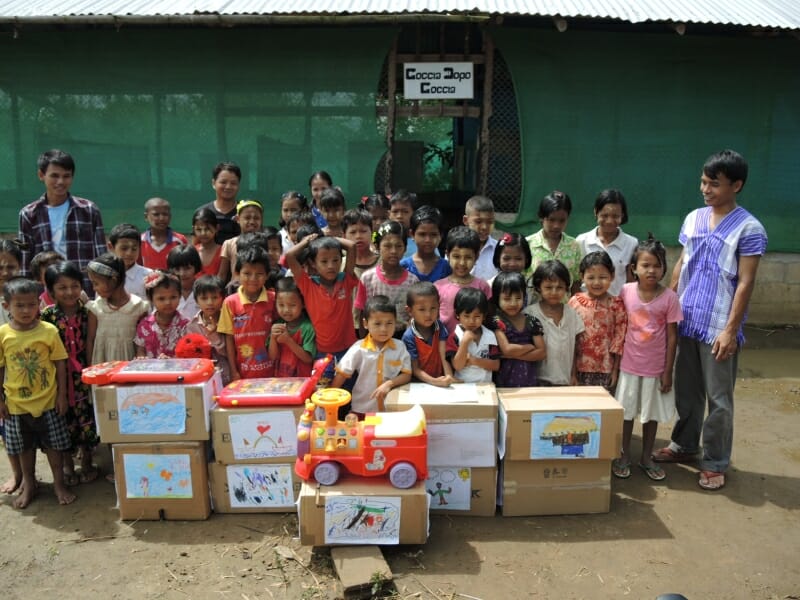 Now, the school does exist and it’s named is “Drop by Drop”. It’s an unlikely pairing between Latina and the mire of Mae-Sot: injustice, illness, rape, abuse, and so on. Some do well, and some thank God that they are still alive in the morning. . . and at night! Like one of the children at the school. I ask his mother: “What is your son’s name?” “Chit Yin Htoo,” she tells me. It means: “If you love me answer me.” “Did you give him the name when he was born?” I ask. “Maybe 3 or 4 years ago, maybe 5 or 6.” At this point I stop and am unable to go on writing. I can only pray that I don’t cry in front of this mother. How can this be? This project was a “loving folly“’ that only the mind of a child could dream up. And that’s what love is, it makes the desert flower, it spurs you to do the impossible, and it makes you glad! We adults follow these children with fear and trembling and respect, I would say: “Their angels gaze upon the Father in Heaven.” When I’m with “If you love me, answer me” I find it hard to make him smile. He’s shy and reserved. Only after much time am I able to take him in my arms: 6 years old, or perhaps 5. . . nobody is really sure . . . fragile and light as a feather. What have his small eyes seen? With a faint voice he’s just able to whisper a message. We distribute food, milk and especially puppets and toys: lanterns, then clothes that make everyone happy. “We don’t have enough for everyone, but let’s ask for a miracle,” I suggest. Let’s try to love one another and take care of each other as we do of ourselves.” Their eyes brighten when they see the football and football uniforms that have been given by a Football Academy of Priverno, Italy. So much love arrives, and the children are gladdened because they feel the love. It changes their sad eyes.
Now, the school does exist and it’s named is “Drop by Drop”. It’s an unlikely pairing between Latina and the mire of Mae-Sot: injustice, illness, rape, abuse, and so on. Some do well, and some thank God that they are still alive in the morning. . . and at night! Like one of the children at the school. I ask his mother: “What is your son’s name?” “Chit Yin Htoo,” she tells me. It means: “If you love me answer me.” “Did you give him the name when he was born?” I ask. “Maybe 3 or 4 years ago, maybe 5 or 6.” At this point I stop and am unable to go on writing. I can only pray that I don’t cry in front of this mother. How can this be? This project was a “loving folly“’ that only the mind of a child could dream up. And that’s what love is, it makes the desert flower, it spurs you to do the impossible, and it makes you glad! We adults follow these children with fear and trembling and respect, I would say: “Their angels gaze upon the Father in Heaven.” When I’m with “If you love me, answer me” I find it hard to make him smile. He’s shy and reserved. Only after much time am I able to take him in my arms: 6 years old, or perhaps 5. . . nobody is really sure . . . fragile and light as a feather. What have his small eyes seen? With a faint voice he’s just able to whisper a message. We distribute food, milk and especially puppets and toys: lanterns, then clothes that make everyone happy. “We don’t have enough for everyone, but let’s ask for a miracle,” I suggest. Let’s try to love one another and take care of each other as we do of ourselves.” Their eyes brighten when they see the football and football uniforms that have been given by a Football Academy of Priverno, Italy. So much love arrives, and the children are gladdened because they feel the love. It changes their sad eyes.  The school doesn’t have actual walls: slightly damaged blackboards. The teachers are volunteers who are only able to be paid a monthly salary of 50 €. Then there is the net and the toilets. . . I feel that I am inside a sanctuary of love, the kind of cathedral that Pope Francis would like. Years ago, I made a vow – that this would be my people and I would never abandon them. In front of this school, this “Drop of love” in the ocean of evil that surrounds us, I renew that vow.” Luigi Butori https://vimeo.com/140934325
The school doesn’t have actual walls: slightly damaged blackboards. The teachers are volunteers who are only able to be paid a monthly salary of 50 €. Then there is the net and the toilets. . . I feel that I am inside a sanctuary of love, the kind of cathedral that Pope Francis would like. Years ago, I made a vow – that this would be my people and I would never abandon them. In front of this school, this “Drop of love” in the ocean of evil that surrounds us, I renew that vow.” Luigi Butori https://vimeo.com/140934325
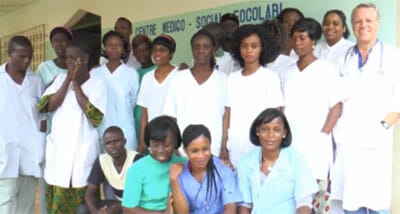
Oct 12, 2015 | Focolare Worldwide
 «During these years I think I alone visited 50,000 patients,» says Dr. A. Carlo Montaguti, a focolarino doctor and Director of the Social Medical Centre of the little Focolare town in Man, Ivory Coast. «I was a doctor in my country, Italy, but my practice was not so intense. Those who preceded me when there was still the war, told me before my departure: Carlo, if you don’t treat them, no one else will.» The patients arrived also in the night. The health records were compiled in the apatam (shed) in front of the hospital, and then they entered for the medical checkup by any of the three doctors of the centre, one of which is Muslim. The doctors prescribed the lab tests and got the results in about two hours. In a second visit, the diagnosis was done and the treatment prescribed. In the span of a morning one manages to get everything done. «It is not usual to have a lab for analysis in such a small centre in the suburbs,» Carlo continues; «I worked for four years without a lab and it was really difficult.» Luc Dro, head of the laboratory, explained that being in a tropical zone, there is great need for studies on parasites that cause malaria and other endemic diseases, but the lab is able to perform a complete check-up. The centre also has a small pharmacy, where over a 100,000 consultations were registered. «We do all that is possible to put the patients at the core of our work – says Dr. Alavo Bazini – and this explains the great influx. It does not suffice to say “the medicines are free of charge,” if the people are not satisfied. This is where the centre’s originality lies.» When possible, there is also a cultural mediator who translates into the local tongues. «We also have the internet and wi-fi connection – explained Dr. Eliassa Sow – In this way we can do research work and cooperate with other doctors from afar.» Dr. Montaguti continues «I came in 2004 – when the centre consisted of two tiny rooms for visits and one for medications. The people have appreciated our work especially because during the war in 2002, in the most difficult moments when all the foreigners were leaving the country, we decided to stay on, and risk our lives. They understood that we were there for them and this generated their trust. At times it came about that on a Monday, after the weekend break, the patients said: ”Doctor, I tried to endure in order to come to you.” If their situation was not too serious, they preferred to wait another day and suffer a bit more, to be able to come here!» One of the strong points of the centre is also the healthcare team which is involved in the entire care process. When the political-military crisis ended and the situation in the region calmed down, the term of the centre was extended and in 2008 we moved into a new facility. «It seemed like a dream – Carlo recalls – but after two years with the influx of patients – more than 80 a day plus their relatives – quite a crowd! – the old structure could not take any more. And we continued to dream.» And so last 10 October, the new Focolare Social Medical Centre, opened last 7 September, was inaugurated in Man, a stone’s throw from Mariapolis Victoria. It is a modern architecture for a facility of over 1,000 sq. m, with the addition of new services: 15 beds, a dentist’s studio, a physiotherapy room, and new diagnostics equipment (ultrasound scans, hemoglobin electrophoresis and microbiology). In the last days the nutrition centre, previously located in the district of Libreville, was completed and transferred to cure infantile malnutrition..
«During these years I think I alone visited 50,000 patients,» says Dr. A. Carlo Montaguti, a focolarino doctor and Director of the Social Medical Centre of the little Focolare town in Man, Ivory Coast. «I was a doctor in my country, Italy, but my practice was not so intense. Those who preceded me when there was still the war, told me before my departure: Carlo, if you don’t treat them, no one else will.» The patients arrived also in the night. The health records were compiled in the apatam (shed) in front of the hospital, and then they entered for the medical checkup by any of the three doctors of the centre, one of which is Muslim. The doctors prescribed the lab tests and got the results in about two hours. In a second visit, the diagnosis was done and the treatment prescribed. In the span of a morning one manages to get everything done. «It is not usual to have a lab for analysis in such a small centre in the suburbs,» Carlo continues; «I worked for four years without a lab and it was really difficult.» Luc Dro, head of the laboratory, explained that being in a tropical zone, there is great need for studies on parasites that cause malaria and other endemic diseases, but the lab is able to perform a complete check-up. The centre also has a small pharmacy, where over a 100,000 consultations were registered. «We do all that is possible to put the patients at the core of our work – says Dr. Alavo Bazini – and this explains the great influx. It does not suffice to say “the medicines are free of charge,” if the people are not satisfied. This is where the centre’s originality lies.» When possible, there is also a cultural mediator who translates into the local tongues. «We also have the internet and wi-fi connection – explained Dr. Eliassa Sow – In this way we can do research work and cooperate with other doctors from afar.» Dr. Montaguti continues «I came in 2004 – when the centre consisted of two tiny rooms for visits and one for medications. The people have appreciated our work especially because during the war in 2002, in the most difficult moments when all the foreigners were leaving the country, we decided to stay on, and risk our lives. They understood that we were there for them and this generated their trust. At times it came about that on a Monday, after the weekend break, the patients said: ”Doctor, I tried to endure in order to come to you.” If their situation was not too serious, they preferred to wait another day and suffer a bit more, to be able to come here!» One of the strong points of the centre is also the healthcare team which is involved in the entire care process. When the political-military crisis ended and the situation in the region calmed down, the term of the centre was extended and in 2008 we moved into a new facility. «It seemed like a dream – Carlo recalls – but after two years with the influx of patients – more than 80 a day plus their relatives – quite a crowd! – the old structure could not take any more. And we continued to dream.» And so last 10 October, the new Focolare Social Medical Centre, opened last 7 September, was inaugurated in Man, a stone’s throw from Mariapolis Victoria. It is a modern architecture for a facility of over 1,000 sq. m, with the addition of new services: 15 beds, a dentist’s studio, a physiotherapy room, and new diagnostics equipment (ultrasound scans, hemoglobin electrophoresis and microbiology). In the last days the nutrition centre, previously located in the district of Libreville, was completed and transferred to cure infantile malnutrition..
Video presentation of the Medical Centre (in French) https://vimeo.com/141902777
![Protagonists in building a world of peace]()
Oct 10, 2015 | Non categorizzato
 “If one day all people, not as individuals but as nations, learn to put themselves aside, to put aside the idea they have about their own country, … and if they were to do this as the expression of the mutual love between States that God wants, just as he wants mutual love among individuals, that day will mark the beginning of a new era. For on that day, Jesus will be alive and present among peoples. … Now is the time for every people to go beyond its own borders, to look farther. Now is the time to love other countries as our own, to acquire a new purity of vision. To be Christians it is not enough to be detached from ourselves. The times we live in ask something more of the followers of Christ: the awareness of Christianity’s social dimension. … … We hope that the Lord may have mercy on this divided and confused world, on peoples closed within their own shells, contemplating their own beauty – so special to them – although it is limited and unsatisfying. With clenched teeth they hang on to their own treasures, those very treasures that could help other peoples, where many are dying of hunger. May the Lord cause the barriers to fall, and charity to flow unhindered between one land and another, in an endless stream of spiritual and material goods. Let us hope that the Lord brings about a new order in the world. Only he can make humanity one family and cultivate the distinctive characteristics of each people, so that the splendour of each, placed at the service of others, may shine with the one light of life. By making each earthly country beautiful, this light will make each one a foretaste of the eternal Country”. Chiara Lubich
“If one day all people, not as individuals but as nations, learn to put themselves aside, to put aside the idea they have about their own country, … and if they were to do this as the expression of the mutual love between States that God wants, just as he wants mutual love among individuals, that day will mark the beginning of a new era. For on that day, Jesus will be alive and present among peoples. … Now is the time for every people to go beyond its own borders, to look farther. Now is the time to love other countries as our own, to acquire a new purity of vision. To be Christians it is not enough to be detached from ourselves. The times we live in ask something more of the followers of Christ: the awareness of Christianity’s social dimension. … … We hope that the Lord may have mercy on this divided and confused world, on peoples closed within their own shells, contemplating their own beauty – so special to them – although it is limited and unsatisfying. With clenched teeth they hang on to their own treasures, those very treasures that could help other peoples, where many are dying of hunger. May the Lord cause the barriers to fall, and charity to flow unhindered between one land and another, in an endless stream of spiritual and material goods. Let us hope that the Lord brings about a new order in the world. Only he can make humanity one family and cultivate the distinctive characteristics of each people, so that the splendour of each, placed at the service of others, may shine with the one light of life. By making each earthly country beautiful, this light will make each one a foretaste of the eternal Country”. Chiara Lubich
Excerpt from “Mary, bond of unity among nations”, Summer 1959 – Published in “Essential Writings”, New City Press, New York, 2007. pp. 231-2
Oct 9, 2015 | Focolare Worldwide
“Dear Synod Fathers, dear brothers and sisters, In resuming this morning the work of the General Congregation, I invite you to dedicate the prayer of the Third Hour to the intention of reconciliation and peace in the Middle East. We are painfully struck and we follow with great concern what is happening in Syria, in Iraq, in Jerusalem and the West Bank, where we see an escalation of violence that involves innocent civilians and continues to fuel a humanitarian crisis of enormous proportions. War brings destruction and multiplies the sufferings of peoples. Hope and progress come only from choices for peace. Let us unite, therefore, in an intense and confident prayer to the Lord, a prayer that intends to be an expression of solidarity at once with [our] brother Patriarchs and Bishops from those regions, who are present here [at the Synod Assembly], as well as with their priests and faithful, and to everyone who lives there. At the same time, together with the [whole] Synod, I send a heartfelt appeal to the international community, that the nations of the world might find a way effectively to help the parties concerned to broaden their horizons beyond the immediate interests and to use the instruments of international law [and] diplomacy, to resolve the conflicts underway at present. Finally, I wish to extend our prayer also to those areas of the African continent, which are experiencing analogous situations of conflict. May Mary, Queen of Peace and loving Mother of her children intercede for all”. (from Vatican Radio)
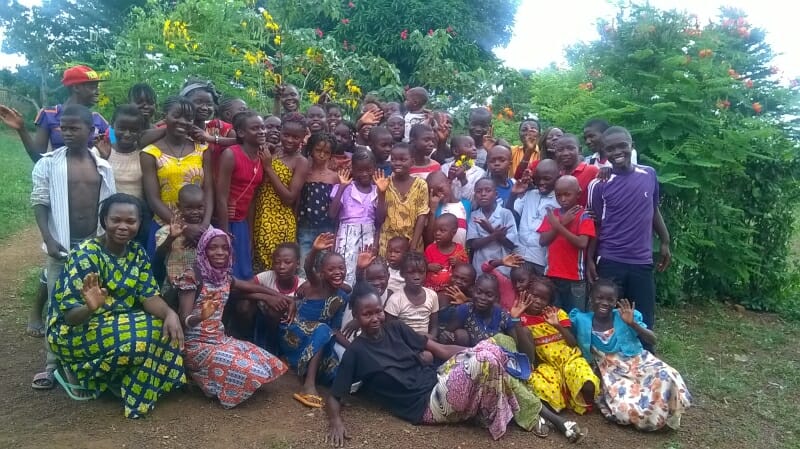
Oct 9, 2015 | Focolare Worldwide
 It is difficult to know the numbers – Misna sources report 60 dead with 300 wounded – and describe the events in a country that has been sinking in political crisis since March 2013 when a group of rebels overthrew the president; and there have been further outbreak in recent days. “The socio-political situation has worsened,” writes Geneviève Sanzé from the Central African Republic. “Christian families live between the house and the forest, so that they won’t be discovered at home and lose their lives. One priest, who lives in the north where the situation is quite serious, is offering shelter to 12,000 refugees in his parish, who are taking refuge from projectiles that are being launched all around them. He doesn’t know how he will care and find food for them. There is no more adminstrative , political or military authority in the region, and there is the constant danger of bombs in crowded areas.” From the Focolare of Bangui they write: “We were preparing to do something concrete to help promote the peace that our country is so much in need of: a sport competition with mixed teams of Christians and Muslims; a march for reconcilliation comprised of all sorts of ethnic and religious groups; a concert by several musical groups, including our own to help sway public opinion towards the need for peace; continuing visits to refugees here in Bangui and in the prison. We invited our Muslim friends and friends from different Christian churches to take part in organising these and other events, and they enthusiastically accepted.” “The first event had been planned for the 26th of September, but was not held because of a massacre that taken place here in Bangui on that day,” recounts Berndadine who works at the Nunciature. “It all began with the discovery of the lifeless body of a young Muslim woman in a Christian area. But the murderer and the circumstances surrounding the death are still unknown. In the span of a few hours non-Muslim homes were attacked, and many people were killed.” Death is everywhere, looting, destruction of houses, churches, schools, offices of international organisations and many displaced persons, including several from the Focolare community. Some have lost close relatives. They write: “We encourage each other to love, each one of us wherever we are, ready to die for our own people. Pray with us, for us and for everyone living in similar situations.” The city has seemed dead for days. “You didn’t go to work,” wrote Bernardine. “The shops were closed, the only vehicles on the street were those of the United Nations and the French Military. The population organised a protest calling everyone to civil disobedience, demanding the restoration of the national military to protect the people. More people died during the manifestation and everything stopped. Things have improved a bit in recent days, we’ve resumed some of our activities, although schools are still closed. We’re in God’s hands and we always believe in His love. Sooner or later there will even be peace in the Central African Republic.” And this hope is supported by the upcoming visit of the Pope in late November. Fidelia, from the focolare in Bangui, recounts: “The entire population, regardless of ethnic or religious group, joyfully awaits his coming. You can feel it in the air, that the people are expecting him as the bearer of hope. Everyone is preparing spiritually and materially in order to be disposed to welcome the graces that Pope Francis’s visit will bring.”
It is difficult to know the numbers – Misna sources report 60 dead with 300 wounded – and describe the events in a country that has been sinking in political crisis since March 2013 when a group of rebels overthrew the president; and there have been further outbreak in recent days. “The socio-political situation has worsened,” writes Geneviève Sanzé from the Central African Republic. “Christian families live between the house and the forest, so that they won’t be discovered at home and lose their lives. One priest, who lives in the north where the situation is quite serious, is offering shelter to 12,000 refugees in his parish, who are taking refuge from projectiles that are being launched all around them. He doesn’t know how he will care and find food for them. There is no more adminstrative , political or military authority in the region, and there is the constant danger of bombs in crowded areas.” From the Focolare of Bangui they write: “We were preparing to do something concrete to help promote the peace that our country is so much in need of: a sport competition with mixed teams of Christians and Muslims; a march for reconcilliation comprised of all sorts of ethnic and religious groups; a concert by several musical groups, including our own to help sway public opinion towards the need for peace; continuing visits to refugees here in Bangui and in the prison. We invited our Muslim friends and friends from different Christian churches to take part in organising these and other events, and they enthusiastically accepted.” “The first event had been planned for the 26th of September, but was not held because of a massacre that taken place here in Bangui on that day,” recounts Berndadine who works at the Nunciature. “It all began with the discovery of the lifeless body of a young Muslim woman in a Christian area. But the murderer and the circumstances surrounding the death are still unknown. In the span of a few hours non-Muslim homes were attacked, and many people were killed.” Death is everywhere, looting, destruction of houses, churches, schools, offices of international organisations and many displaced persons, including several from the Focolare community. Some have lost close relatives. They write: “We encourage each other to love, each one of us wherever we are, ready to die for our own people. Pray with us, for us and for everyone living in similar situations.” The city has seemed dead for days. “You didn’t go to work,” wrote Bernardine. “The shops were closed, the only vehicles on the street were those of the United Nations and the French Military. The population organised a protest calling everyone to civil disobedience, demanding the restoration of the national military to protect the people. More people died during the manifestation and everything stopped. Things have improved a bit in recent days, we’ve resumed some of our activities, although schools are still closed. We’re in God’s hands and we always believe in His love. Sooner or later there will even be peace in the Central African Republic.” And this hope is supported by the upcoming visit of the Pope in late November. Fidelia, from the focolare in Bangui, recounts: “The entire population, regardless of ethnic or religious group, joyfully awaits his coming. You can feel it in the air, that the people are expecting him as the bearer of hope. Everyone is preparing spiritually and materially in order to be disposed to welcome the graces that Pope Francis’s visit will bring.”
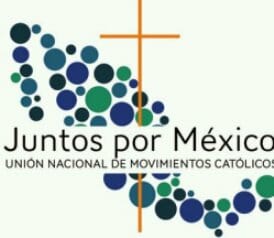
Oct 8, 2015 | Non categorizzato
 JUNTOS POR MEXICO (Together for Mexico) is a venue for meetings and mutual respect in order to facilitate joint actions for the spiritual and social good of the country. The event will have a festive but also reflective nature, with formation and education dedicated to the whole family. More than 10,000 people are expected to attend, and will reflect on the theme of the family and the role of the lay person in society according to different perspectives: anthropological, spiritual, social, and political. One of the most anticipated and important topics is the vision of young people. On the list of international speakers are Dr. Giovanni Impagliazzo (Italy), Coordinator for Latin America of the Community of Sant’Egidio; Mr. Ricardo Sada L.C., the local director of Regnum Christi; Dr. Maria Consuelo Queremel, the Vice Minister General of the Secular Franciscan Order. Speaking for the Focolare Movement are the co-president, Dr. Jesús Morán (Spain) and spouses Anna and Alberto Friso (Italy), members of the Pontifical Council for the Family. Also present will be Margaret Karram (Israel) and Marc St-Hilaire (Canada), who are responsible for the dialogue with other ecclesial movements. The event will be transmitted in streaming at www.juntospormexico.org.mx
JUNTOS POR MEXICO (Together for Mexico) is a venue for meetings and mutual respect in order to facilitate joint actions for the spiritual and social good of the country. The event will have a festive but also reflective nature, with formation and education dedicated to the whole family. More than 10,000 people are expected to attend, and will reflect on the theme of the family and the role of the lay person in society according to different perspectives: anthropological, spiritual, social, and political. One of the most anticipated and important topics is the vision of young people. On the list of international speakers are Dr. Giovanni Impagliazzo (Italy), Coordinator for Latin America of the Community of Sant’Egidio; Mr. Ricardo Sada L.C., the local director of Regnum Christi; Dr. Maria Consuelo Queremel, the Vice Minister General of the Secular Franciscan Order. Speaking for the Focolare Movement are the co-president, Dr. Jesús Morán (Spain) and spouses Anna and Alberto Friso (Italy), members of the Pontifical Council for the Family. Also present will be Margaret Karram (Israel) and Marc St-Hilaire (Canada), who are responsible for the dialogue with other ecclesial movements. The event will be transmitted in streaming at www.juntospormexico.org.mx
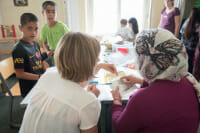
Oct 8, 2015 | Non categorizzato
 Germany has repeatedly made it in the headlines due to its controversial policies regarding refugees, that stirred up a reaction of the people in welcoming the many migrants who have arrived. Also the Focolare Movement in Germany has been working for many years now for the integration of immigrants into the social context, and intensifying its welcoming initiatives in this period. Starting from the most basic needs – such as the collection of food, clothing, furniture and other basic items, German lessons and looking for medical or legal aid – to that of a man in Aschaffenburg, define “a counter attack.” In some cities there were also some violent episodes against the refugees and those who were helping them, but there was the firm decision to respond by giving a counter-testimonial, a message which came through forcefully. The Focolare of Dresda organized in this perspective, a soiree on the theme, “Love your neighbour as yourself.” One of the organizers said “we see how many live in anxiety or even fear: the soiree was very useful, and encouraged many people to undertake actions together.” In addition to this, there was also a social media campaign, #openyourborders and #signupforpeace, launched at international levels by the Youth for United World, together with the aim of giving a further boost to the initiatives of the United World Project. But there are also concrete examples of daily life, like that of a couple from Munich, Bayern. The evening before their departure for a weekend excursion outside the city, they received a phone call asking for their willingness to host for the weekend, a young Syrian mother with three small children, while waiting to continue her journey to Karlsruhe. Though they hoped that the four would leave soon so they could at least spend a part of the weekend in the mountains, the couple – despite their internal conflict – accepted; but “the moment we took the hand of our little five-year-old princess, the ice was immediately broken,” they wrote. The weekend with the unexpected guests passed with the games played with the children, sharing their breakfast where “we renounced hotdogs out of respect for our Muslim guests who highly appreciated the yoghurt and flatbread we bought for them,” and a Syrian supper prepared together. And when we had to say goodbye on Sunday morning, “we all had tears in our eyes, and were happy and mutually grateful” – wrote the couple. What a gift the Divine director of this unexpected programme had in store for us!” Read this on www.fokolar-bewegung.de Herberge gefunden! Flüchtlinge: Stärkeres Engagement gefragt
Germany has repeatedly made it in the headlines due to its controversial policies regarding refugees, that stirred up a reaction of the people in welcoming the many migrants who have arrived. Also the Focolare Movement in Germany has been working for many years now for the integration of immigrants into the social context, and intensifying its welcoming initiatives in this period. Starting from the most basic needs – such as the collection of food, clothing, furniture and other basic items, German lessons and looking for medical or legal aid – to that of a man in Aschaffenburg, define “a counter attack.” In some cities there were also some violent episodes against the refugees and those who were helping them, but there was the firm decision to respond by giving a counter-testimonial, a message which came through forcefully. The Focolare of Dresda organized in this perspective, a soiree on the theme, “Love your neighbour as yourself.” One of the organizers said “we see how many live in anxiety or even fear: the soiree was very useful, and encouraged many people to undertake actions together.” In addition to this, there was also a social media campaign, #openyourborders and #signupforpeace, launched at international levels by the Youth for United World, together with the aim of giving a further boost to the initiatives of the United World Project. But there are also concrete examples of daily life, like that of a couple from Munich, Bayern. The evening before their departure for a weekend excursion outside the city, they received a phone call asking for their willingness to host for the weekend, a young Syrian mother with three small children, while waiting to continue her journey to Karlsruhe. Though they hoped that the four would leave soon so they could at least spend a part of the weekend in the mountains, the couple – despite their internal conflict – accepted; but “the moment we took the hand of our little five-year-old princess, the ice was immediately broken,” they wrote. The weekend with the unexpected guests passed with the games played with the children, sharing their breakfast where “we renounced hotdogs out of respect for our Muslim guests who highly appreciated the yoghurt and flatbread we bought for them,” and a Syrian supper prepared together. And when we had to say goodbye on Sunday morning, “we all had tears in our eyes, and were happy and mutually grateful” – wrote the couple. What a gift the Divine director of this unexpected programme had in store for us!” Read this on www.fokolar-bewegung.de Herberge gefunden! Flüchtlinge: Stärkeres Engagement gefragt
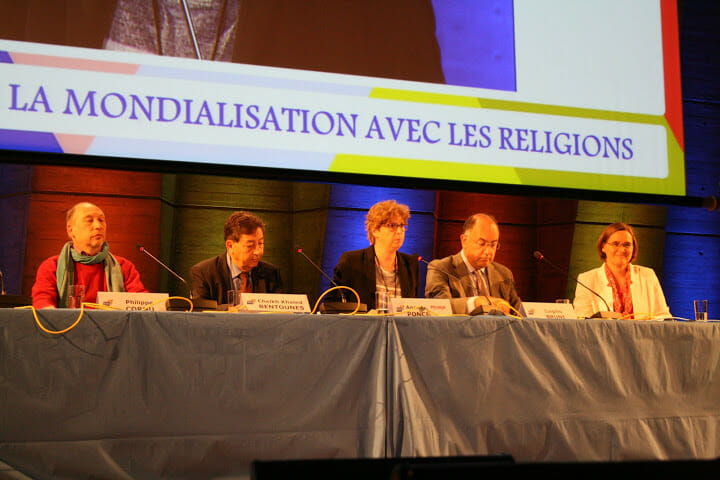
Oct 7, 2015 | Focolare Worldwide
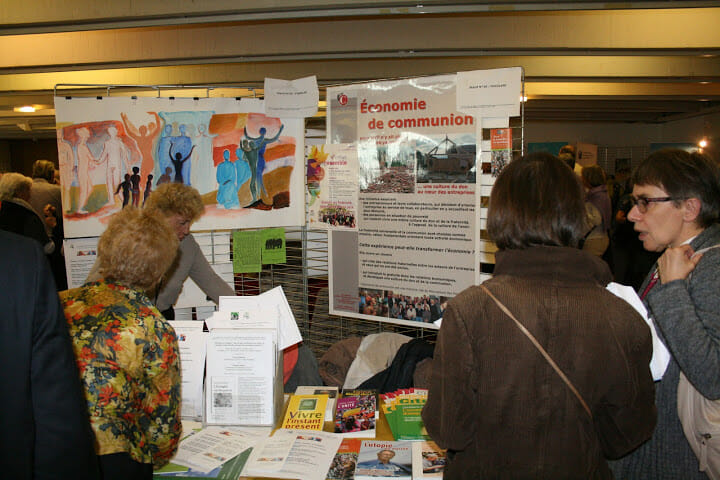
© Focolari-Alain Boudre
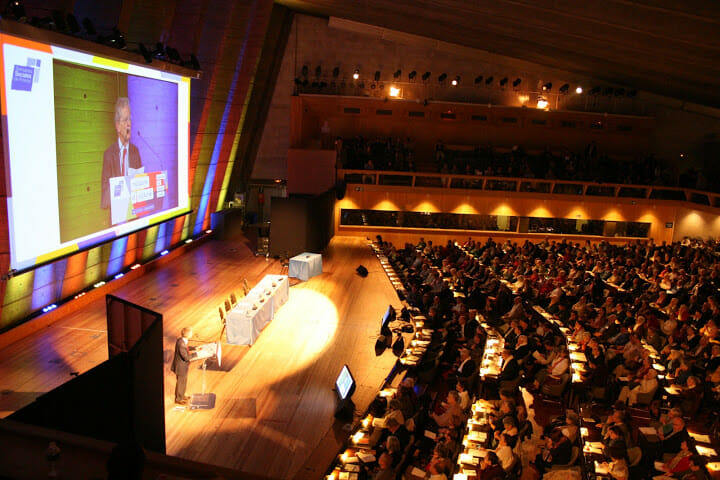
© Focolari-Alain Boudre

© Focolari-Alain Boudre
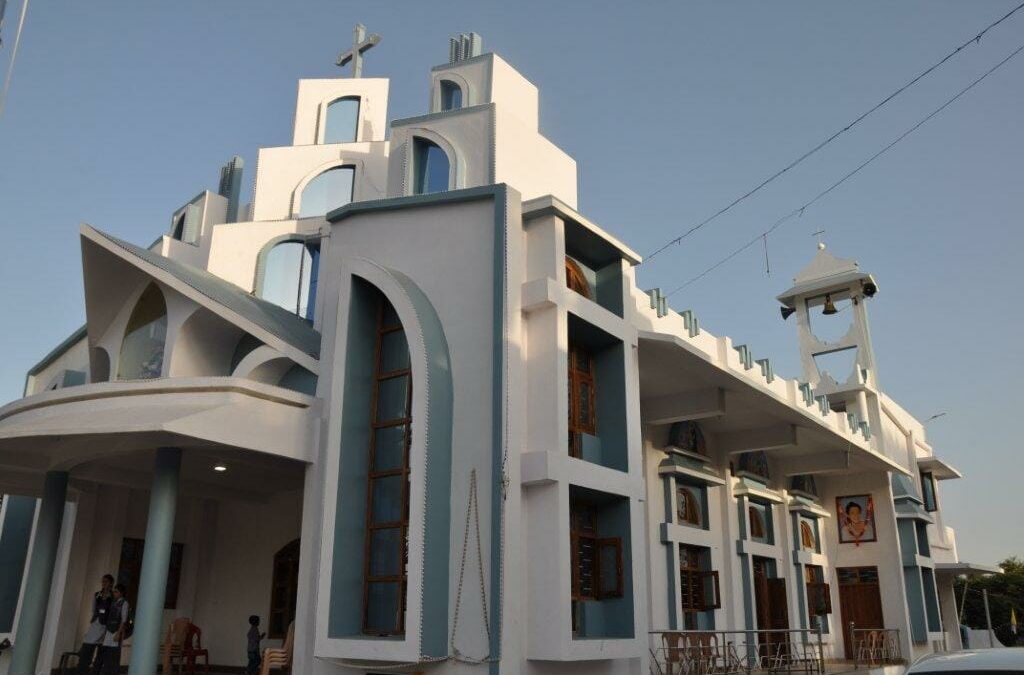
Oct 7, 2015 | Focolare Worldwide
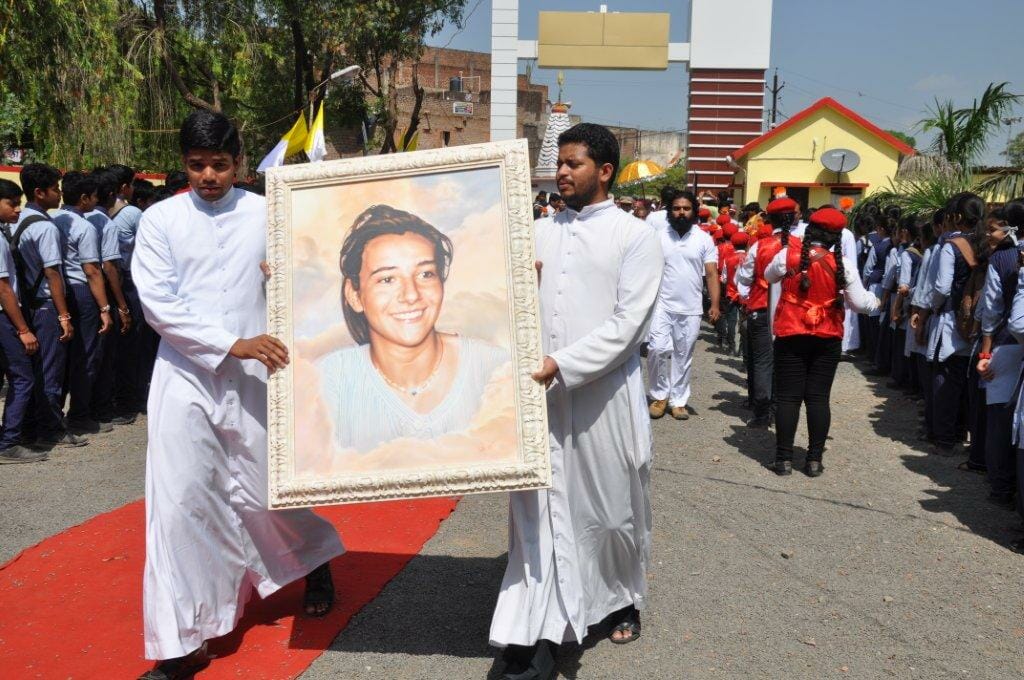 Msgr. Anthony Chirayath, bishop of the Syro-Malabar diocese of Sagar, consecrated the new church in the presence of the parents of Chiara Luce Badano, saying it was “an inspiration to all students in the country”. The couple arrived from Italy for the occasion at the invitation of the bishop. Many faithful and young students of local high schools, as well as groups of adherents to the Focolare Movement from Mumbai and Delhi, attended the ceremony.
Msgr. Anthony Chirayath, bishop of the Syro-Malabar diocese of Sagar, consecrated the new church in the presence of the parents of Chiara Luce Badano, saying it was “an inspiration to all students in the country”. The couple arrived from Italy for the occasion at the invitation of the bishop. Many faithful and young students of local high schools, as well as groups of adherents to the Focolare Movement from Mumbai and Delhi, attended the ceremony. 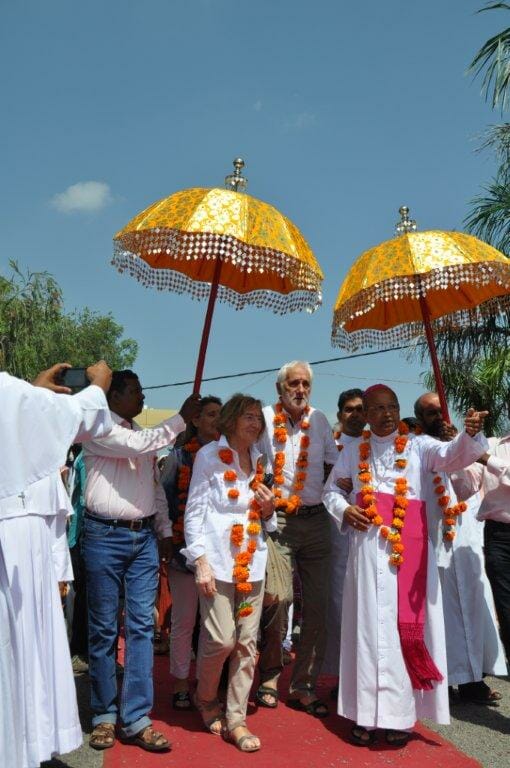 Chiara Badano, named Chiara “Luce” by Chiara Lubich, founder of the Movement (or Work of Mary), was a young Italian, who died at the age of 18 from aggressive bone cancer. She was beatified on 25 September 2010 by Pope Benedict XVI, who acknowledged her heroic virtues and tireless work for the poor, despite the pain of the disease from which she suffered. The Sironi church was dedicated to the Blessed at the express will of Msgr. Chirayath, who learned of the life of Chiara Luce during one of his trips in Italy. Keeping in mind the large youth population that resides in the Indian town and who attend the prestigious English schools in the district, Bishop Sagar sensed that Chiara’s life could serve as an “example and inspiration for students.” The celebrations were attended by Maria Teresa and Ruggero, the parents of the young Blessed, accompanied by her best friend Chicca Coriasco and her brother Franz Coriasco, who wrote Chiara Luce’s biography. Approximately 1,000 participants attended, including priests, religious, seminarians, teachers, high school students and young Focolare members, who organised performances to celebrate the event.
Chiara Badano, named Chiara “Luce” by Chiara Lubich, founder of the Movement (or Work of Mary), was a young Italian, who died at the age of 18 from aggressive bone cancer. She was beatified on 25 September 2010 by Pope Benedict XVI, who acknowledged her heroic virtues and tireless work for the poor, despite the pain of the disease from which she suffered. The Sironi church was dedicated to the Blessed at the express will of Msgr. Chirayath, who learned of the life of Chiara Luce during one of his trips in Italy. Keeping in mind the large youth population that resides in the Indian town and who attend the prestigious English schools in the district, Bishop Sagar sensed that Chiara’s life could serve as an “example and inspiration for students.” The celebrations were attended by Maria Teresa and Ruggero, the parents of the young Blessed, accompanied by her best friend Chicca Coriasco and her brother Franz Coriasco, who wrote Chiara Luce’s biography. Approximately 1,000 participants attended, including priests, religious, seminarians, teachers, high school students and young Focolare members, who organised performances to celebrate the event. 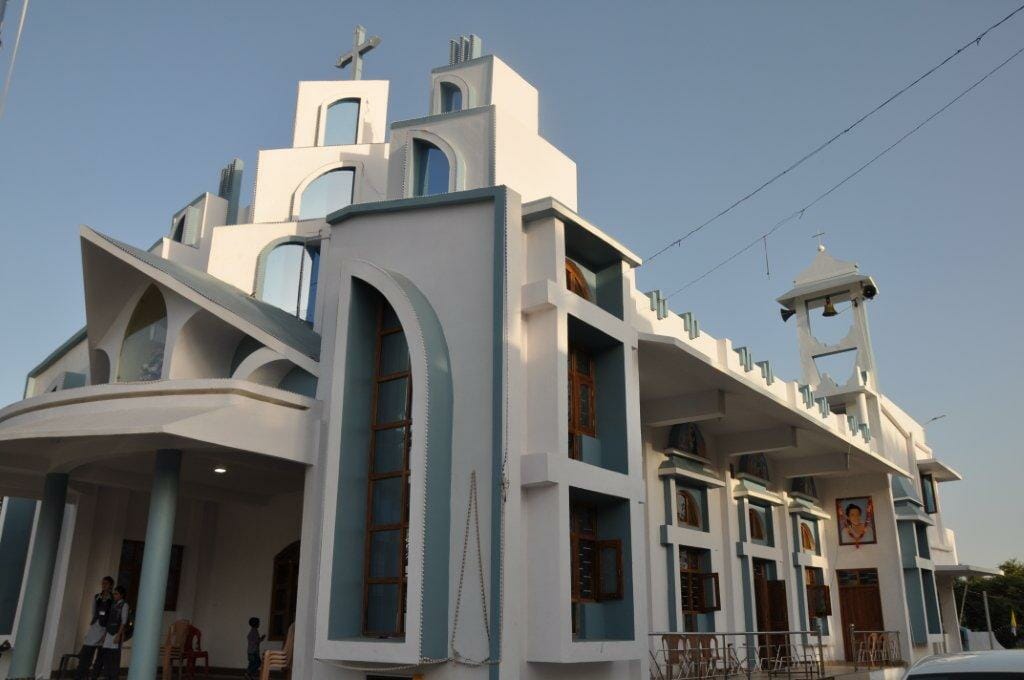 After the inauguration of the church, the parents and friends of Chiara Luce met some members of the Focolare Movement in Mumbai, eager to express their gratitude for the “witness of love and unity”. Also in Mumbai they had a meeting with “Jesusfriends4u”, a youth group inspired by the example of the life of the girl, who awarded the Badano’s the first prize dedicated to their daughter, the Effective Parenting Award. Source: Asia News
After the inauguration of the church, the parents and friends of Chiara Luce met some members of the Focolare Movement in Mumbai, eager to express their gratitude for the “witness of love and unity”. Also in Mumbai they had a meeting with “Jesusfriends4u”, a youth group inspired by the example of the life of the girl, who awarded the Badano’s the first prize dedicated to their daughter, the Effective Parenting Award. Source: Asia News

 “On August 22, 1944, I lost my only sister in the Tsushima Maru naval disaster.” The passenger ship was sunk by an American submarine. More than 1,400 civilians lost their lives, including 700 children. “Up until the day of her death at the age of 96, my mother continued to say: “The war ate her on me. . .” Mrs Toshiko Tsuhako spoke from the bottom of her heart as she recounted her story to us. Her city, on Okinawa Island, had been the theatre of the only land battle in Japan through the months of April, May and June 1945, leaving 150,000 dead. “I was just an innocent child when I found myself thrown into the tragic experience of war, in contact with painful wounds that it inflicts on the bodies and the spirits of people. The war ended when I was 12 years old. My mother had a fragile constitution and, since I was the only daughter now, I devoted all my strength to trying to support and alleviate her afflictions. At the age of 16 I met the Christian faith and received the grace of Baptism.” As an adult she came into contact with the Focolare spirituality: “I was quite surprised when I heard that the foundress, Chiara Lubich, had come to understand, in the midst of the Second World War, that God loves us immensely and that we are all brothers and sisters who aspire to a united world, because this coincided exactly with the great dream that I carried inside me from when I was a young teenager.” “Although I was aware that everything that happens is in God’s hands, countless times I would wonder: ‘Why are there still such cruel and painful wars?’, while I continued on dreaming of a ‘global Family’ where the people live mutual gratitude and communion.” “I think that God is in need of our collaboration in building a truly peaceful world. It is true that we should cultivate hearts that love their own lands, but more than anything we should cultivate sensitive souls that devote themselves to the good of others, souls that know how to love.” “On this anniversary of the termination of the war,” Toshiko testifies, “I renew my trust in God and my commitment to continue along the path of peacebuilding.”
“On August 22, 1944, I lost my only sister in the Tsushima Maru naval disaster.” The passenger ship was sunk by an American submarine. More than 1,400 civilians lost their lives, including 700 children. “Up until the day of her death at the age of 96, my mother continued to say: “The war ate her on me. . .” Mrs Toshiko Tsuhako spoke from the bottom of her heart as she recounted her story to us. Her city, on Okinawa Island, had been the theatre of the only land battle in Japan through the months of April, May and June 1945, leaving 150,000 dead. “I was just an innocent child when I found myself thrown into the tragic experience of war, in contact with painful wounds that it inflicts on the bodies and the spirits of people. The war ended when I was 12 years old. My mother had a fragile constitution and, since I was the only daughter now, I devoted all my strength to trying to support and alleviate her afflictions. At the age of 16 I met the Christian faith and received the grace of Baptism.” As an adult she came into contact with the Focolare spirituality: “I was quite surprised when I heard that the foundress, Chiara Lubich, had come to understand, in the midst of the Second World War, that God loves us immensely and that we are all brothers and sisters who aspire to a united world, because this coincided exactly with the great dream that I carried inside me from when I was a young teenager.” “Although I was aware that everything that happens is in God’s hands, countless times I would wonder: ‘Why are there still such cruel and painful wars?’, while I continued on dreaming of a ‘global Family’ where the people live mutual gratitude and communion.” “I think that God is in need of our collaboration in building a truly peaceful world. It is true that we should cultivate hearts that love their own lands, but more than anything we should cultivate sensitive souls that devote themselves to the good of others, souls that know how to love.” “On this anniversary of the termination of the war,” Toshiko testifies, “I renew my trust in God and my commitment to continue along the path of peacebuilding.”











 This is the title, but also the wish of the European Assembly of
This is the title, but also the wish of the European Assembly of 







 “Everyone was so touched by the brotherly affection that joins the Holy Father Francesco to His Holiness Patriarch Bartholomew. The Pope recognizes the Patriarch’s commitment in the journey of unity, which he describes as our common journey. Not only that: he very courageously says that this Honorary Degree is a step ahead in that journey.” You know the Patriarch very well, you have lived and now live even more intensely, this moment in a long history of closeness between the Focolare Movement and the Orthodox Church and its Patriarchs. What are your views on this Patriarch and the significance of this recognition? “Patriarch Bartholomew is the heir of the great Patriarch Athenagoras who really possessed this passion for unity which, in him, was almost a prophetic vision that he was not able to realize. This passion was transmitted particularly to Patriarch Bartholomew who never misses an opportunity to press for unity in the heart of the Orthodox Church, so that they can talk to one another to the Church of Rome with a voice that is already in a certain sense synodal. He tries in many ways to emphasise how much this journey together is alive. I think we are truly at a happy moment because there is gentle pressure being given by two heads of our two Churches, and that cannot but produce fruit. There will be resistance as Pope Francis pointed out at the conclusion of the Synod, but in the end there is the Holy Spirit who will help us, who pushes the Church securely towards the unity of the Churches. We think that this is a happy moment and that this recognition might be an important step, a concrete step on this journey.”
“Everyone was so touched by the brotherly affection that joins the Holy Father Francesco to His Holiness Patriarch Bartholomew. The Pope recognizes the Patriarch’s commitment in the journey of unity, which he describes as our common journey. Not only that: he very courageously says that this Honorary Degree is a step ahead in that journey.” You know the Patriarch very well, you have lived and now live even more intensely, this moment in a long history of closeness between the Focolare Movement and the Orthodox Church and its Patriarchs. What are your views on this Patriarch and the significance of this recognition? “Patriarch Bartholomew is the heir of the great Patriarch Athenagoras who really possessed this passion for unity which, in him, was almost a prophetic vision that he was not able to realize. This passion was transmitted particularly to Patriarch Bartholomew who never misses an opportunity to press for unity in the heart of the Orthodox Church, so that they can talk to one another to the Church of Rome with a voice that is already in a certain sense synodal. He tries in many ways to emphasise how much this journey together is alive. I think we are truly at a happy moment because there is gentle pressure being given by two heads of our two Churches, and that cannot but produce fruit. There will be resistance as Pope Francis pointed out at the conclusion of the Synod, but in the end there is the Holy Spirit who will help us, who pushes the Church securely towards the unity of the Churches. We think that this is a happy moment and that this recognition might be an important step, a concrete step on this journey.” 




 It was a living experience of the Church that was very important for them, a unique experience in their life that they will always carry in their hearts. That is how the family from Colombia described their experience – María Angélica, a dentist, and Luis, Director of the Ethics Department at the University of Gran Colombia, and their two sons of 18 and 20 years. From October 4th to the 25th, they attended the Ordinary Synod on the Family “The vocation and mission of the family in the Church and the contemporary world.” They have been working for families for over 20 years in connection with the Focolare Movement, accompanying couples in the process of preparing for marriage, and for the years that follow when the inevitable crises threaten to deteriorate the sacrament and the love. You had an active role in the work of the small groups. Which moments seemed important to you in making a contribution to the Synod? The experience in the small groups was quite beautiful, because we were able to offer our own experience and that of other families, presenting what we wish to live as a family: the dynamic of love that is lived in the Trinity – in which each of the Three Divine Persons is Love for the other. This is one thing we were able to contribute. Also: emphasising the importance of the Eucharist; we highlighted the need for the presence of Jesus amongst families through mutual love; and so we shared with them about the times we have asked forgiveness of one another when there was not full unity. Another contribution was the point about divorced and remarried couples. It is important to feel a particular love for these families. And that according to the measure in which the experience of faith in them begins to grow – accompanying them to the point that they feel that Jesus is also in their neighbour, in the Word of the Gospel that is meant to be lived, in the community that lives in mutual love – their nearness to Jesus grows. We felt that one important point to be presented to the Synod fathers was Jesus crucified and forsaken, since He took upon Himself the sufferings of humanity. In Him we see the one who was betrayed, humiliated, feeling alone, abandoned, culpable, left without an answer to His question. We are all joined in Him because He lived through all that, and in Him we can have this unique communion wherein all are contained in this yes to Him. This was our proposal: that there is no difference between the family that has not suffered failure and the one that has, because we have all feel accepted by Him. We described the experience of many families, also in the Movement, in which they had said this yes with the pain of not being able to receive the Eucharist, but still knowing that they were called to holiness. Therefore, they are not excluded from the invitation to holiness. As Pope Benedict once remarked: they highlight the beauty of the indissolubility of marriage; they are also builders of this indissolubility, so they make a huge contribution as they grow in this yes.
It was a living experience of the Church that was very important for them, a unique experience in their life that they will always carry in their hearts. That is how the family from Colombia described their experience – María Angélica, a dentist, and Luis, Director of the Ethics Department at the University of Gran Colombia, and their two sons of 18 and 20 years. From October 4th to the 25th, they attended the Ordinary Synod on the Family “The vocation and mission of the family in the Church and the contemporary world.” They have been working for families for over 20 years in connection with the Focolare Movement, accompanying couples in the process of preparing for marriage, and for the years that follow when the inevitable crises threaten to deteriorate the sacrament and the love. You had an active role in the work of the small groups. Which moments seemed important to you in making a contribution to the Synod? The experience in the small groups was quite beautiful, because we were able to offer our own experience and that of other families, presenting what we wish to live as a family: the dynamic of love that is lived in the Trinity – in which each of the Three Divine Persons is Love for the other. This is one thing we were able to contribute. Also: emphasising the importance of the Eucharist; we highlighted the need for the presence of Jesus amongst families through mutual love; and so we shared with them about the times we have asked forgiveness of one another when there was not full unity. Another contribution was the point about divorced and remarried couples. It is important to feel a particular love for these families. And that according to the measure in which the experience of faith in them begins to grow – accompanying them to the point that they feel that Jesus is also in their neighbour, in the Word of the Gospel that is meant to be lived, in the community that lives in mutual love – their nearness to Jesus grows. We felt that one important point to be presented to the Synod fathers was Jesus crucified and forsaken, since He took upon Himself the sufferings of humanity. In Him we see the one who was betrayed, humiliated, feeling alone, abandoned, culpable, left without an answer to His question. We are all joined in Him because He lived through all that, and in Him we can have this unique communion wherein all are contained in this yes to Him. This was our proposal: that there is no difference between the family that has not suffered failure and the one that has, because we have all feel accepted by Him. We described the experience of many families, also in the Movement, in which they had said this yes with the pain of not being able to receive the Eucharist, but still knowing that they were called to holiness. Therefore, they are not excluded from the invitation to holiness. As Pope Benedict once remarked: they highlight the beauty of the indissolubility of marriage; they are also builders of this indissolubility, so they make a huge contribution as they grow in this yes.  At times, it’s a matter of understanding the deep meaning of the sacrament. For many people of our day the sacrament of matrimony doesn’t say much, also because the couple has not been provided with an adequate formation, neither by parish nor ecclesial movement; whereas, it is a part of the journey of every human being to understand how to be human and to discover the transcendent dimension within oneself. It needs to be discovered how this sacrament can help in forming a family and why, through the family, we are responsible for children.” One day, coming out of the small group session, you felt the wish that the bishops would comprehend your deep love for the Church. . . “The relationship and the dialogue with the bishops has been drawing us closer and closer over the past few weeks, closer in knowing one another, listening to one another, also in trying to be ‘mothers’ towards them. For example, if they had a cough, a cold . . . we wished that they would be able to feel that we families also love the Church as they do; that we suffer for the Church as they do; that we also give our life for the Church. We’re on the same journey. As Chiara Lubich once told us: each one of us is like a piece of a mosaic, so our value lies in helping to create the beautiful reality that is the Church. It was very important that this was said – and heard.” One of your own offerings was included in the final document. “Yes, in the final small group meeting the relator asked if we would describe our experience as a family. Then, what was proposed for the final document also contained what each one of us had said. You can’t even tell, really, what was proposed by a family and what was proposed by a Synod father: it was everyone’s proposal, unanimously agreed upon.” What would your wish be for the conclusion of the Synod? “Many best wishes! The hope that, little by little, all families will discover the richness contained in them, no matter what their situation – ‘regular’ or ‘irregular’ – if they live as a real family, to make society better: for the growth of humanity.”
At times, it’s a matter of understanding the deep meaning of the sacrament. For many people of our day the sacrament of matrimony doesn’t say much, also because the couple has not been provided with an adequate formation, neither by parish nor ecclesial movement; whereas, it is a part of the journey of every human being to understand how to be human and to discover the transcendent dimension within oneself. It needs to be discovered how this sacrament can help in forming a family and why, through the family, we are responsible for children.” One day, coming out of the small group session, you felt the wish that the bishops would comprehend your deep love for the Church. . . “The relationship and the dialogue with the bishops has been drawing us closer and closer over the past few weeks, closer in knowing one another, listening to one another, also in trying to be ‘mothers’ towards them. For example, if they had a cough, a cold . . . we wished that they would be able to feel that we families also love the Church as they do; that we suffer for the Church as they do; that we also give our life for the Church. We’re on the same journey. As Chiara Lubich once told us: each one of us is like a piece of a mosaic, so our value lies in helping to create the beautiful reality that is the Church. It was very important that this was said – and heard.” One of your own offerings was included in the final document. “Yes, in the final small group meeting the relator asked if we would describe our experience as a family. Then, what was proposed for the final document also contained what each one of us had said. You can’t even tell, really, what was proposed by a family and what was proposed by a Synod father: it was everyone’s proposal, unanimously agreed upon.” What would your wish be for the conclusion of the Synod? “Many best wishes! The hope that, little by little, all families will discover the richness contained in them, no matter what their situation – ‘regular’ or ‘irregular’ – if they live as a real family, to make society better: for the growth of humanity.” 



 “I live in Nicosia and was born and grew up in an Orthodox family that was Christian in name only. There was no depth, no relationship with Jesus. Indeed, God was the ally of my parents, and they seemed to have a monopoly on Him when they wanted us to obey them. When I finished high school, I received a scholarship to study orthodontics in Hungary. It was difficult for me to get used to the new sitaution. For the first time I was far from my family, living with people I didn’t know. Back then, we were far from the multicultural spirit that prevails today. I was filled with prejudices, with an attitude of rejection. During that year I encountered many disappointments, also from my friends. Meanwhile, the deep search for a more authentic life had begun in me. At the new college I met a
“I live in Nicosia and was born and grew up in an Orthodox family that was Christian in name only. There was no depth, no relationship with Jesus. Indeed, God was the ally of my parents, and they seemed to have a monopoly on Him when they wanted us to obey them. When I finished high school, I received a scholarship to study orthodontics in Hungary. It was difficult for me to get used to the new sitaution. For the first time I was far from my family, living with people I didn’t know. Back then, we were far from the multicultural spirit that prevails today. I was filled with prejudices, with an attitude of rejection. During that year I encountered many disappointments, also from my friends. Meanwhile, the deep search for a more authentic life had begun in me. At the new college I met a 




















 Now, the school does exist and it’s named is “Drop by Drop”. It’s an unlikely pairing between Latina and the mire of Mae-Sot: injustice, illness, rape, abuse, and so on. Some do well, and some thank God that they are still alive in the morning. . . and at night! Like one of the children at the school. I ask his mother: “What is your son’s name?” “Chit Yin Htoo,” she tells me. It means: “If you love me answer me.” “Did you give him the name when he was born?” I ask. “Maybe 3 or 4 years ago, maybe 5 or 6.” At this point I stop and am unable to go on writing. I can only pray that I don’t cry in front of this mother. How can this be? This project was a “loving folly“’ that only the mind of a child could dream up. And that’s what love is, it makes the desert flower, it spurs you to do the impossible, and it makes you glad! We adults follow these children with fear and trembling and respect, I would say: “Their angels gaze upon the Father in Heaven.” When I’m with “If you love me, answer me” I find it hard to make him smile. He’s shy and reserved. Only after much time am I able to take him in my arms: 6 years old, or perhaps 5. . . nobody is really sure . . . fragile and light as a feather. What have his small eyes seen? With a faint voice he’s just able to whisper a message. We distribute food, milk and especially puppets and toys: lanterns, then clothes that make everyone happy. “We don’t have enough for everyone, but let’s ask for a miracle,” I suggest. Let’s try to love one another and take care of each other as we do of ourselves.” Their eyes brighten when they see the football and football uniforms that have been given by a Football Academy of Priverno, Italy. So much love arrives, and the children are gladdened because they feel the love. It changes their sad eyes.
Now, the school does exist and it’s named is “Drop by Drop”. It’s an unlikely pairing between Latina and the mire of Mae-Sot: injustice, illness, rape, abuse, and so on. Some do well, and some thank God that they are still alive in the morning. . . and at night! Like one of the children at the school. I ask his mother: “What is your son’s name?” “Chit Yin Htoo,” she tells me. It means: “If you love me answer me.” “Did you give him the name when he was born?” I ask. “Maybe 3 or 4 years ago, maybe 5 or 6.” At this point I stop and am unable to go on writing. I can only pray that I don’t cry in front of this mother. How can this be? This project was a “loving folly“’ that only the mind of a child could dream up. And that’s what love is, it makes the desert flower, it spurs you to do the impossible, and it makes you glad! We adults follow these children with fear and trembling and respect, I would say: “Their angels gaze upon the Father in Heaven.” When I’m with “If you love me, answer me” I find it hard to make him smile. He’s shy and reserved. Only after much time am I able to take him in my arms: 6 years old, or perhaps 5. . . nobody is really sure . . . fragile and light as a feather. What have his small eyes seen? With a faint voice he’s just able to whisper a message. We distribute food, milk and especially puppets and toys: lanterns, then clothes that make everyone happy. “We don’t have enough for everyone, but let’s ask for a miracle,” I suggest. Let’s try to love one another and take care of each other as we do of ourselves.” Their eyes brighten when they see the football and football uniforms that have been given by a Football Academy of Priverno, Italy. So much love arrives, and the children are gladdened because they feel the love. It changes their sad eyes. 










